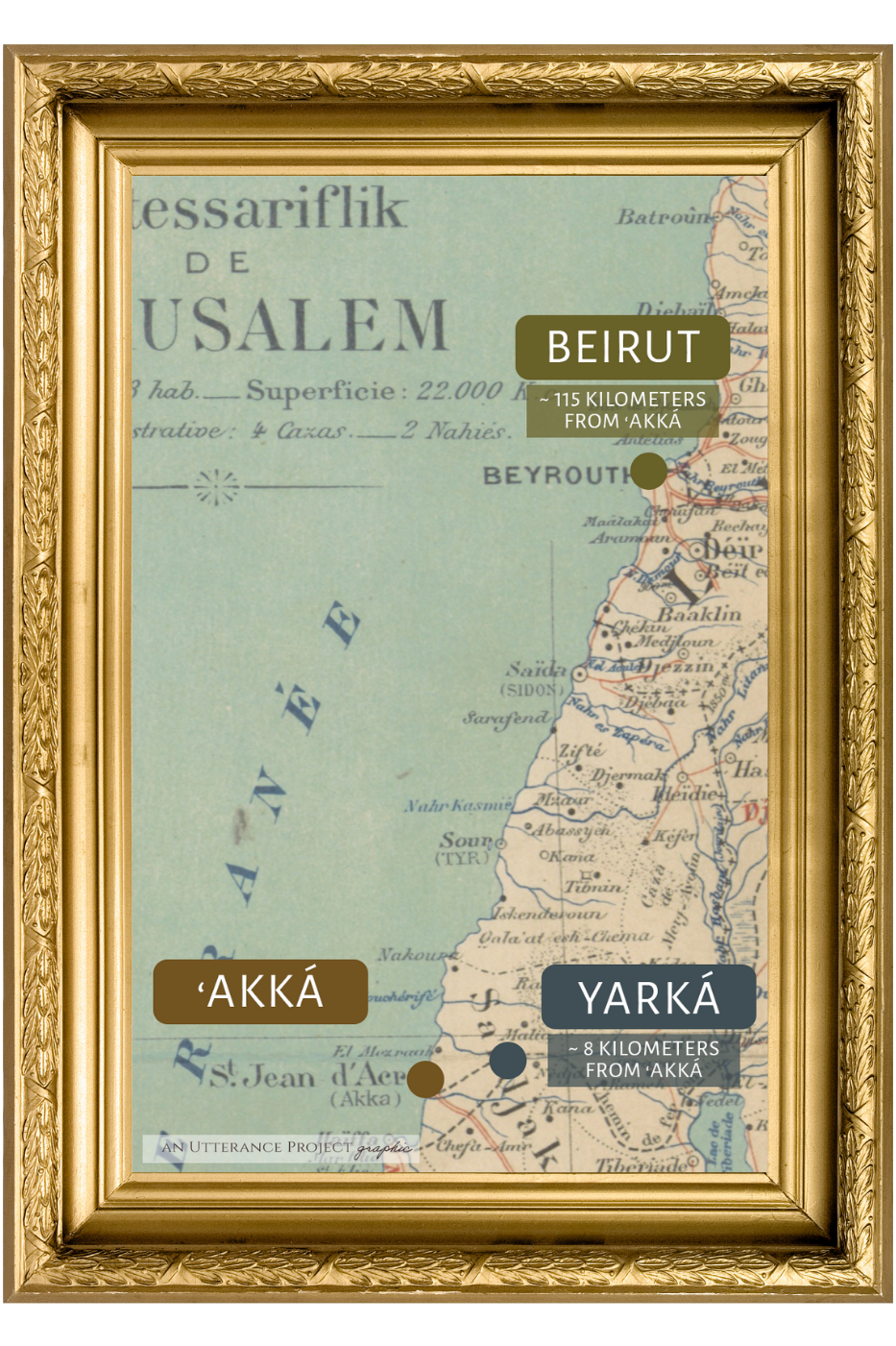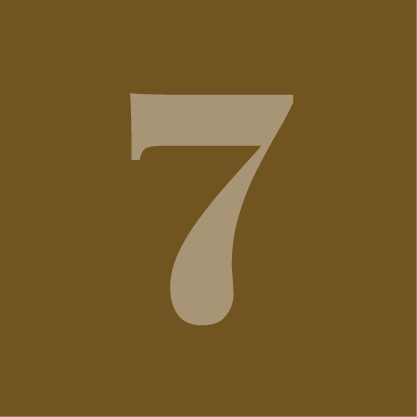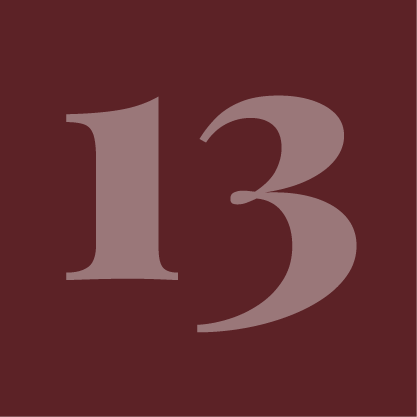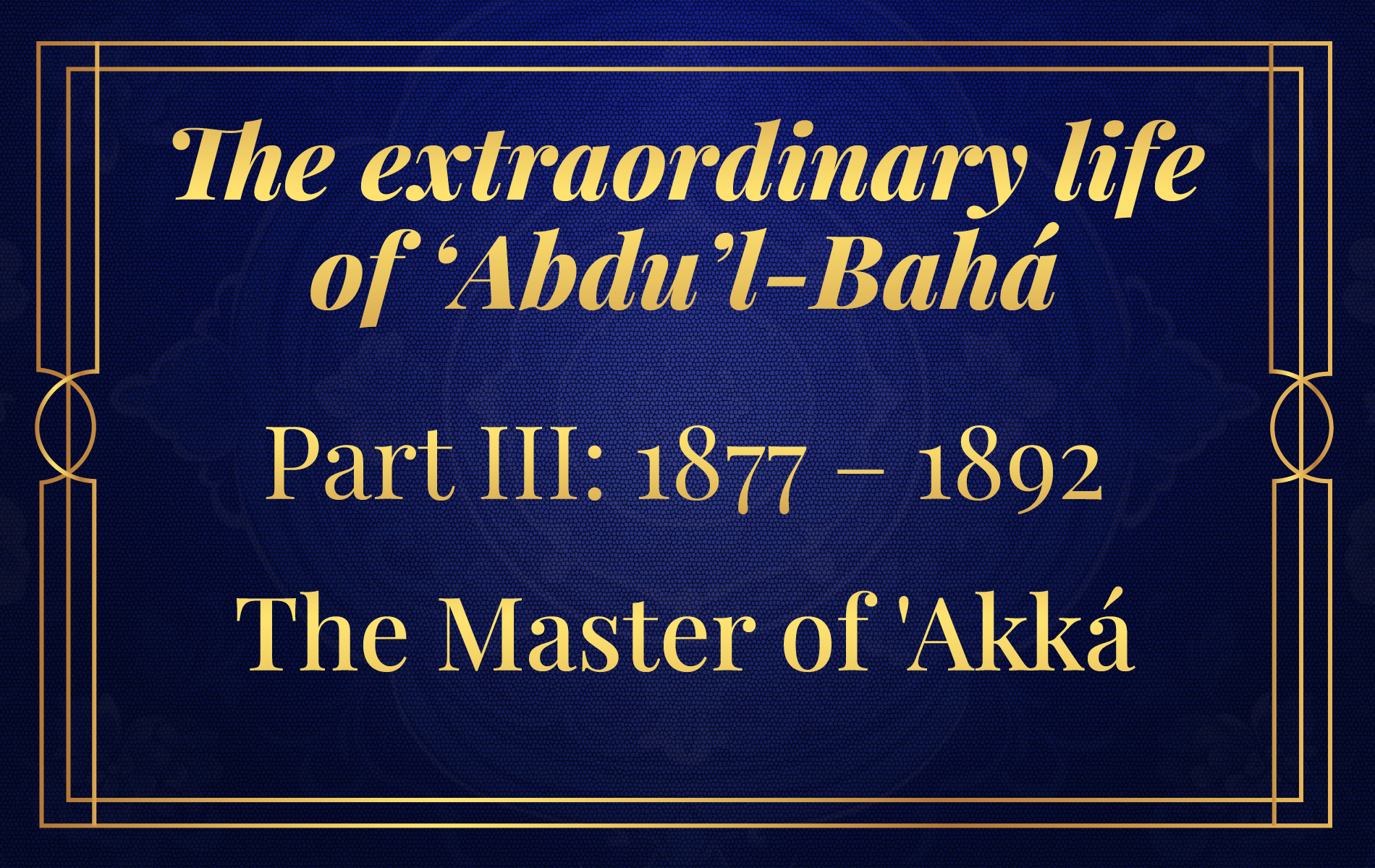
Written and illustrated by Violetta Zein
This part covers the life of ‘Abdu’l-Bahá from the age of 33 in 1877 to the age of 48 in 1892.
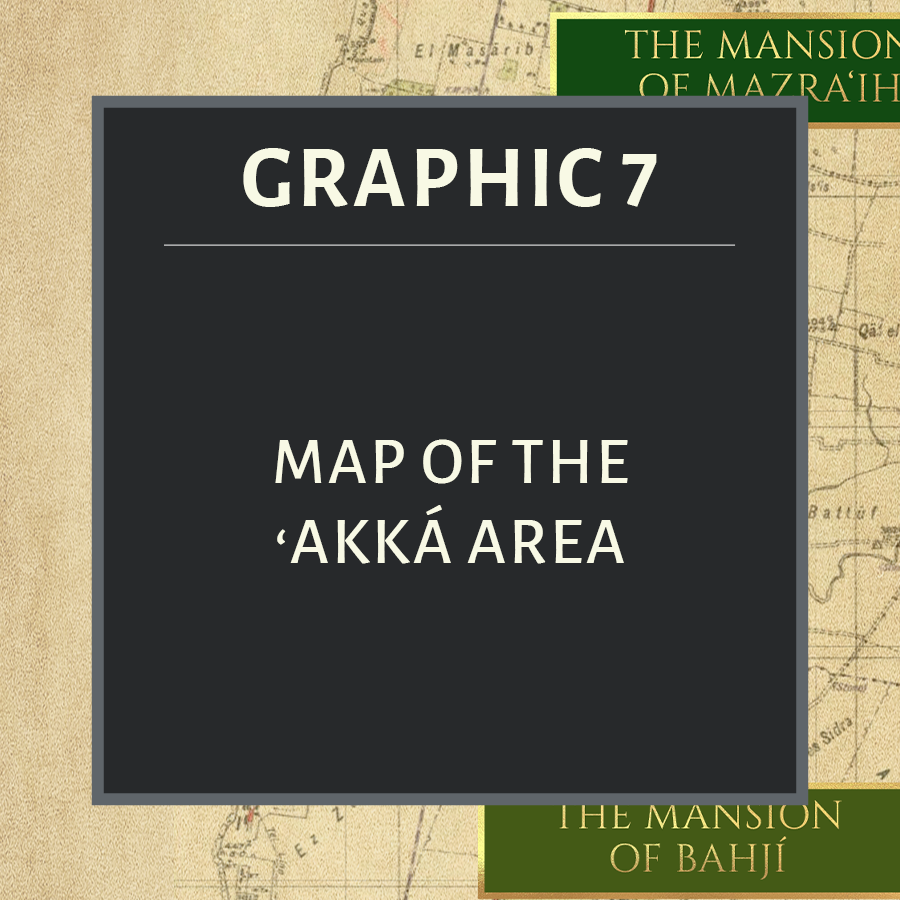
Map of the places in the ‘Akká area associated with Bahá’u’lláh and ‘Abdu’l-Bahá in the period from 1877 – 1892. Original graphic by Violetta Zein. Base map from Palestine Open Maps Website.
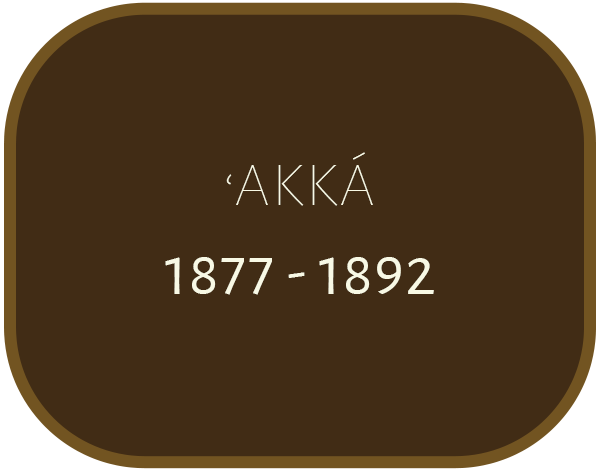
'Abdu'l-Bahá lives in 'Akká from 1868 to 1910, when He moves to Haifa permanently. This section covers the years from 1877 to 1892, when Bahá'u'lláh moves from Akka to Mazra‘ih, and finally to Bahjí in 1879 where He resides until His passing in 1892. During this period 'Abdu'l-Bahá maintains a permanent residence in 'Akká, in the house of 'Abbúd, but travels to Beirut, Lebanon, and Haifa, while also spending time in Mazra‘ih, Bahjí, and Druze villages in the 'Akká area.
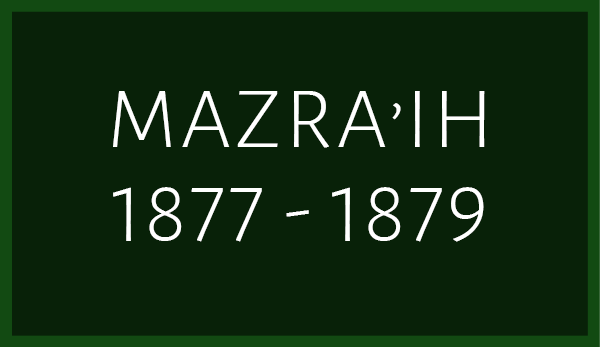
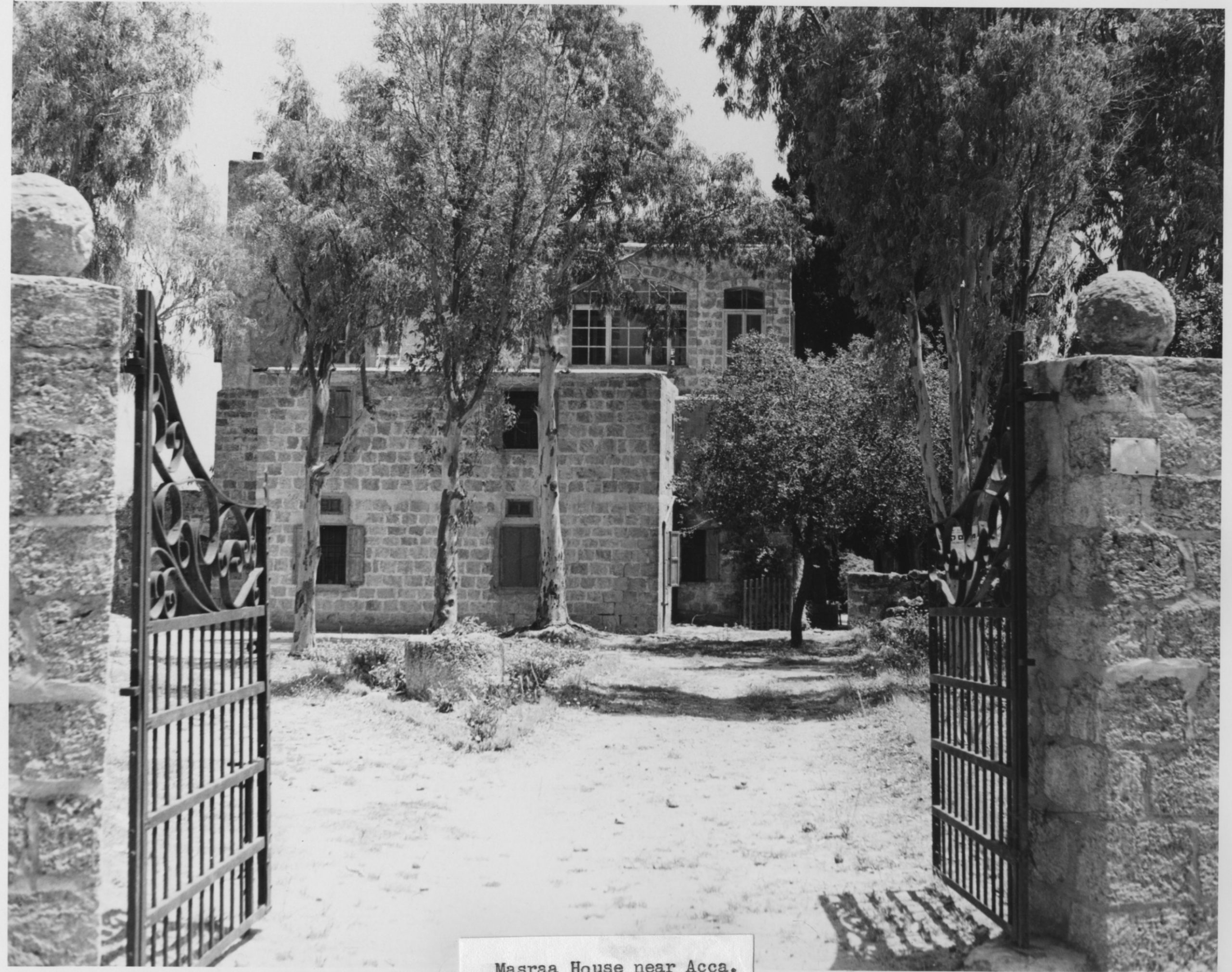
Mansion of Mazra'ih, the entrance, 1952. Bahá'í Media Bank.
In June 1877, 'Abdu'l-Bahá drives Bahá'u'lláh in His carriage out of 'Akká, through the Land Gate and to Mazra'ih.
'Abdu'l-Bahá has been preparing for this move since the day Bahá’u’lláh passed the remark: “I have not gazed on verdure for nine years." His sole focus from that moment was to take His beloved father out of the wretched city of 'Akka and into beautiful surroundings.
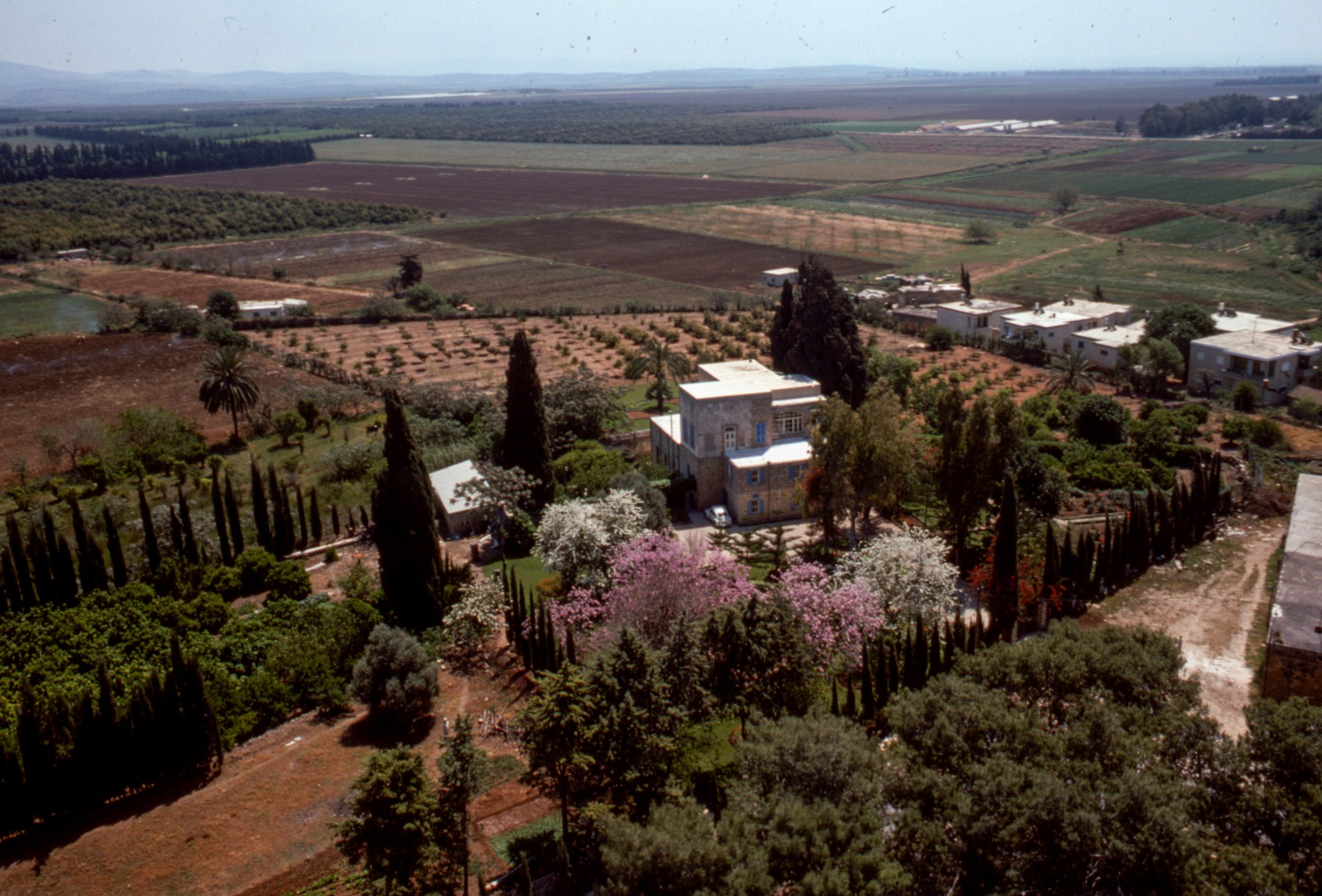
Aerial view of the Mansion of Mazra'ih and surrounding gardens, April 1979. This is taken from higher up, but this is the view that Bahá'u'lláh had from His balcony on the upper floor of the Mansion. Bahá'í Media Bank.
Mazra'ih could not be more perfect. Built by 'Abdu'lláh Páshá as a summer residence, it is a very pleasant place, more than 7 kilometers due north of the messy turmoil of 'Akká. The Mansion is nestled in charming quiet countryside, with views of the Mediterranean Sea to the west, and the valley leading up to the Galilee hills to the east. The building at Mazra'ih is surrounded by a garden on a vast plain. Bahá'u'lláh uses the ground floor room as a reception room, and meets many believers and pilgrims here. Bahá'u'lláh's bedroom is on the upper floor of the mansion, and boasts a balcony overlooking the beautiful countryside.
Once Bahá'u'lláh is settled in Mazra'ih, free from the oppressive atmosphere He has been subjected to every day of the last nine years in 'Akká, 'Abdu'l-Bahá returns to the Prison City.
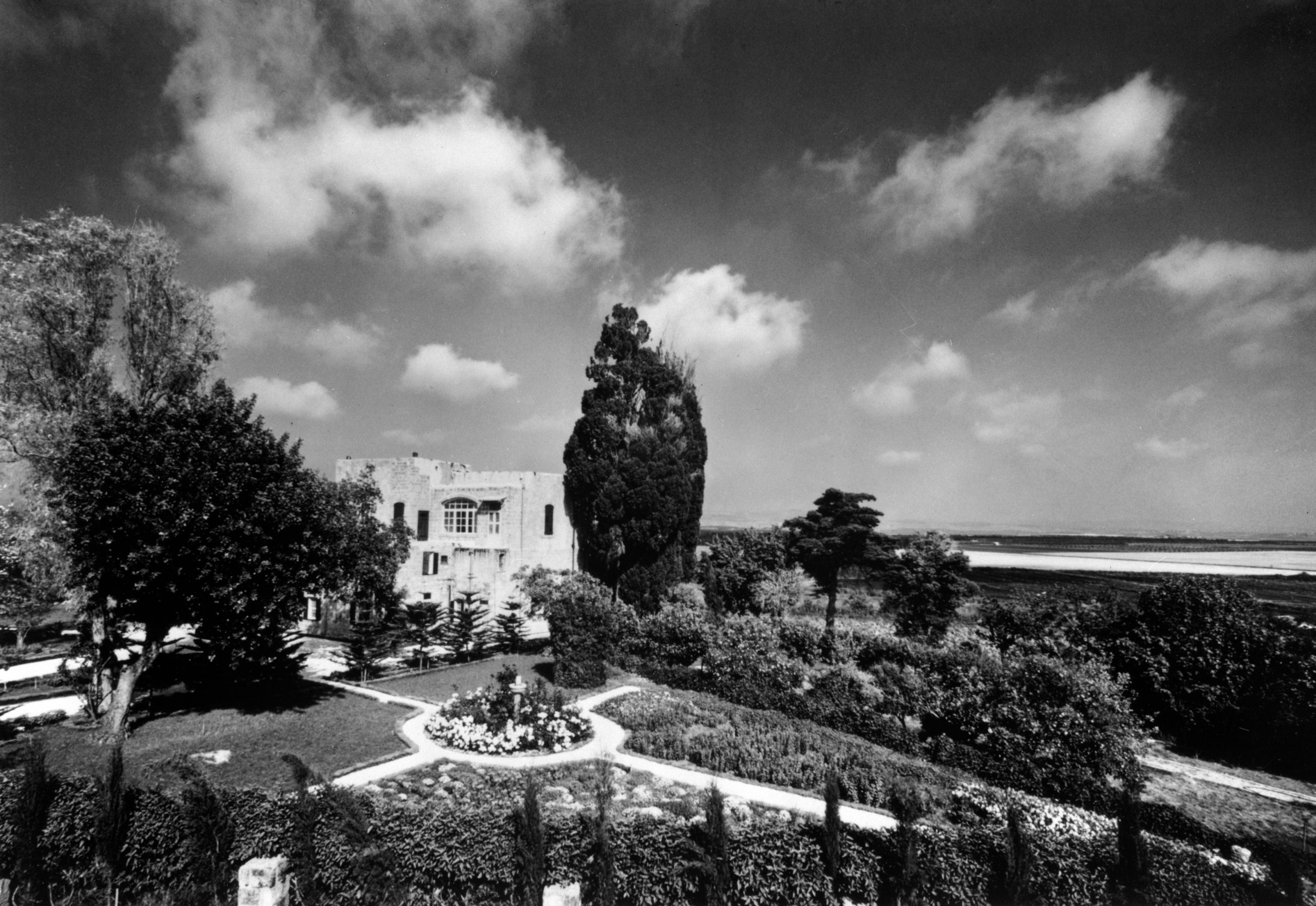
Mansion of Mazra'ih and surrounding gardens, March 1973. Bahá'í Media Bank.
A new phase opens in Bahá'u'lláh's Ministry starting in 1877, through the two years He resides in Mazra'ih and later in Bahjí. Bahá'u'lláh has, since His early childhood, loved the beauty of nature and outdoor life, but the change of scenery and relative freedom are just one part of this new chapter. The most significant factor at play when Bahá'u'lláh leaves the walls of 'Akká is the unveiling of His greatness. His power and majesty, first made clear to all when Shaykh ‘Aliy-i-Mírí, the highest religious authority in the region of 'Akká begs Bahá'u'lláh to leave the city (see Part II), is then reinforced, over the next fifteen years, by eminent visitors seeking audiences with Him.
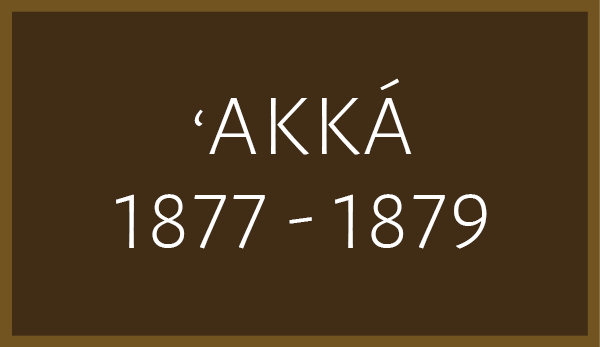
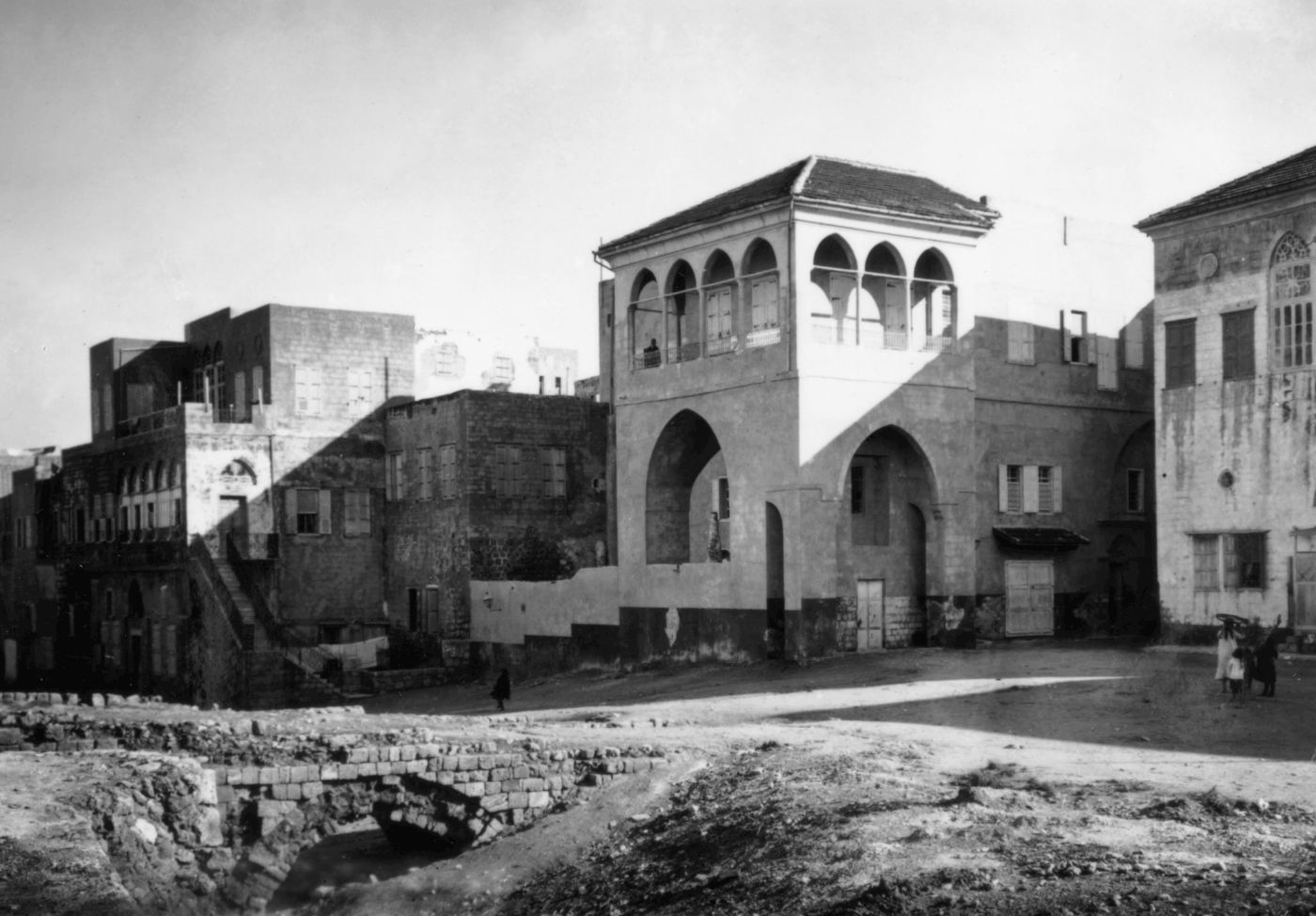
The House of 'Abbúd in 1905. Photo Credit: Bahá'í World Centre Archives. The Life of Bahá'u'lláh: A Photographic Narrative.
The imprisonment in the barracks have greatly affected Navváb's health and she has become frail. In addition, the very primitive means of travel in the 'Akká area make travel by the women of the Holy Family very difficult. For these reasons, the saintly Navváb, and Bahá'u'lláh's cherished and devoted daughter, Bahíyyih Khánum, the Greatest Holy Leaf, stay behind in 'Akká when Bahá'u'lláh moves to Mazra'ih.
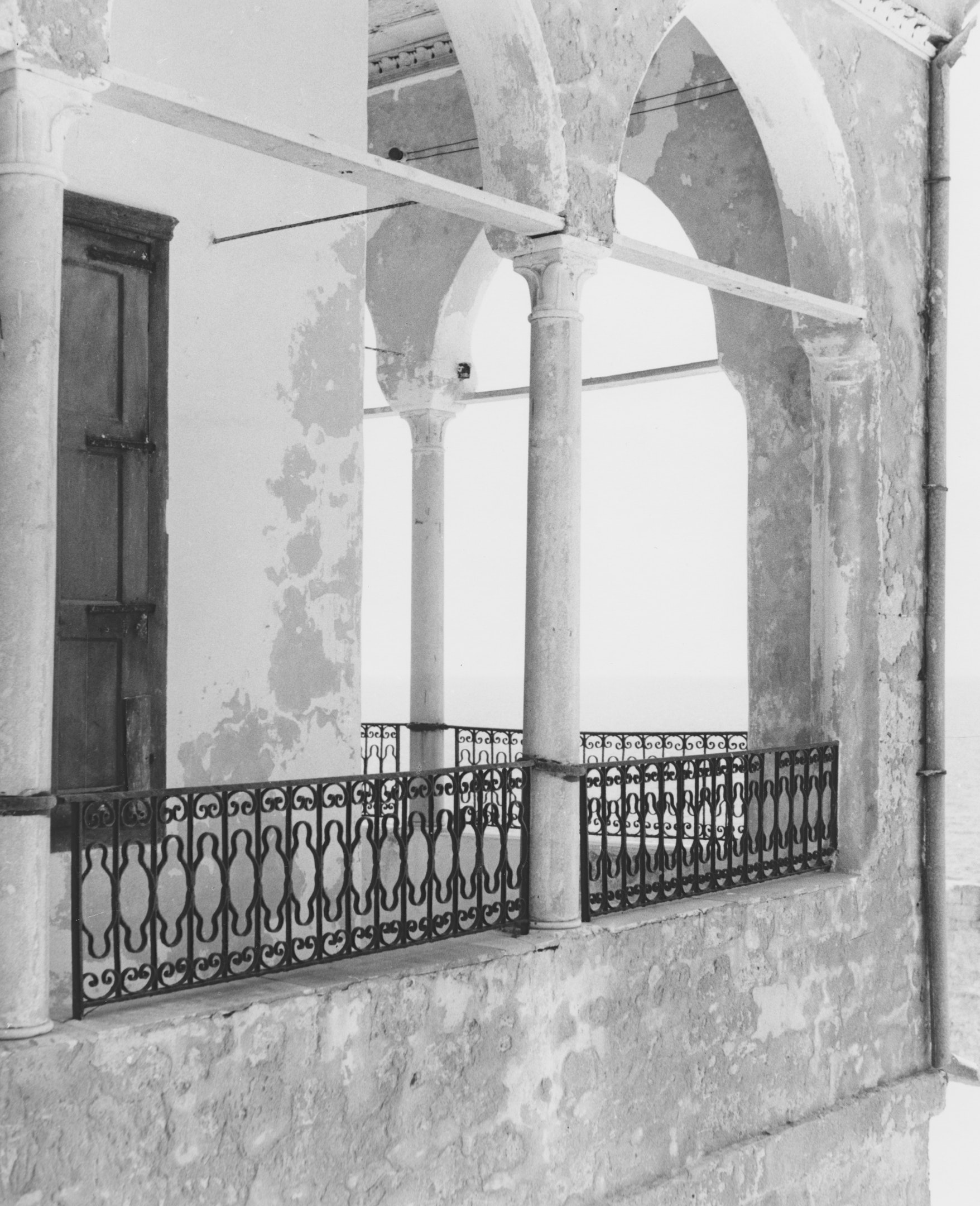
Balcony of the House of Abbúd outside of the room of Bahá'u'lláh, 1952. Bahá'í Media Bank.
Accordingly, Baha'u'llah often visits 'Akká and returns to spend most winters with His wife Navváb and His Family in the house of Abbúd during His residences in Mazra'ih and Bahjí. 'Abdu'l-Bahá visits Mazra'ih and later Bahjí as often as He can, which brings much joy to the heart of Bahá'u'lláh. Bahá'u'lláh's room in the House of 'Abbúd, where the Kitáb-i-Aqdas was revealed, is kept intact and becomes a place of visitation for the Bahá'í pilgrims in 'Akká.
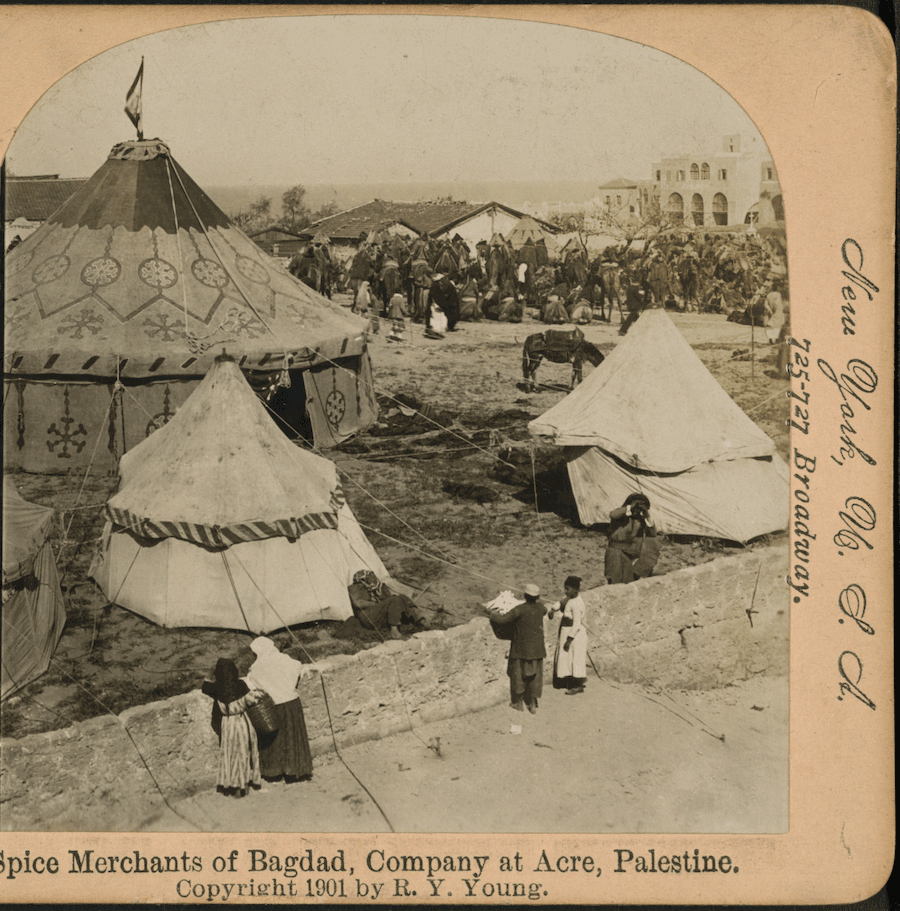
This picture of spice merchants from Baghdád in 'Akká circa 1901 is taken about twenty years after this period, but the merchant tents and the people milling in the background give an idea of the type of people 'Abdu'l-Bahá would have interacted with every day. Photograph by American Stereoscopic Company. Library of Congress.
The main reason that 'Abdu'l-Bahá does not leave 'Akká for Mazra'ih or Bahjí with Bahá'u'lláh is that He chooses to continue shouldering a staggering burden of cares and responsibilities in order to relieve Bahá'u'lláh from having to deal with daily, mundane and time-consuming affairs. It is important to keep in mind when reading this account, that the people, religious leaders and government officials 'Abdu'l-Bahá ministers to, counsels, assists, consults with and helps, are not confined to 'Akká, but also include neighboring towns and sometimes neighboring regions. One last thing to keep in mind is that 'Abdu'l-Bahá had the saintly capacity to devote as much care, attention and time to all these facets of His service simultaneously, whether helping a government official avert a crisis or attending to the needs of an orphan.
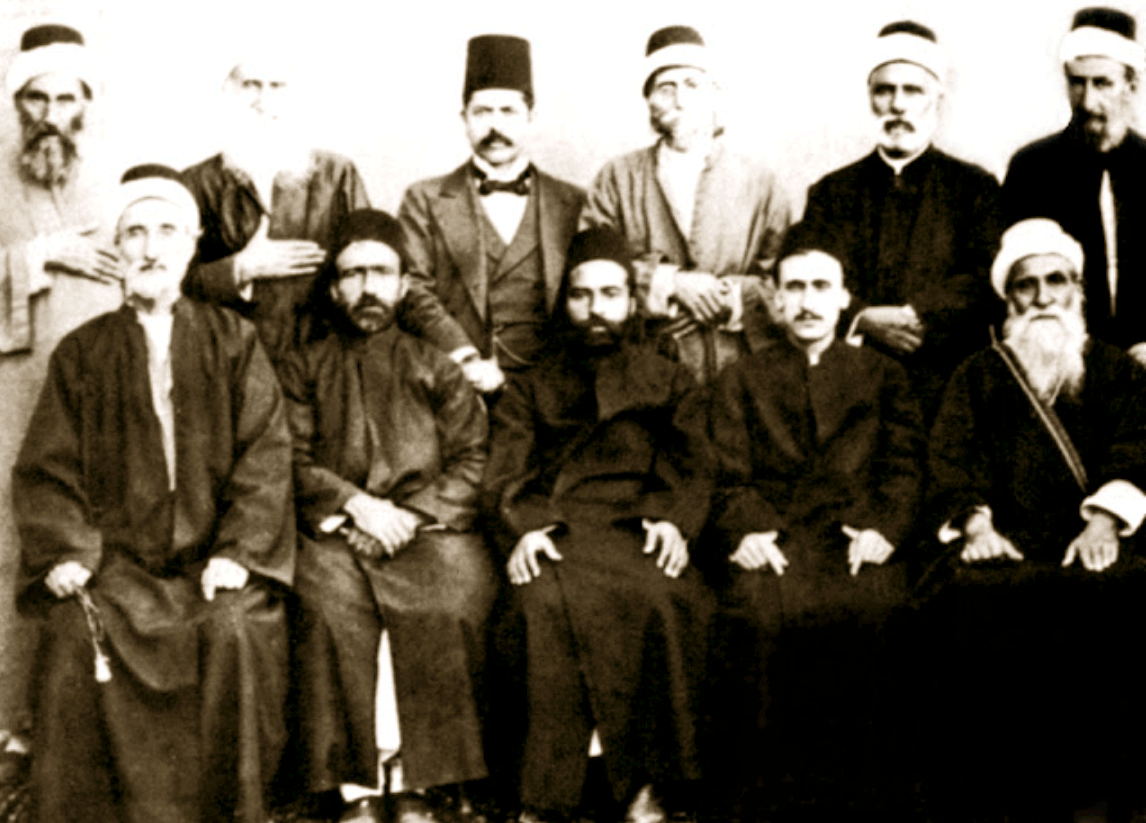
Eminent Bahá'ís at the time of Bahá'u'lláh (Details below). Source: Worldwide Community of Baha'u'llah.
Standing from left to right: Ḥájí Mírzá Ḥaydar-‘Alí, Jamál Effendí, Mírzá Abu'l-Qásim-i-Iṣfahání, Mishkín-Qalam, Muḥammad-Riḍáy-i-Shírází Qannad, Mírzá Jaʻfar.
Seated from left to right: Mírzá Maḥmúd-i-Káshání, Mírzá Abu'r-Raʼúf, Mírzá Muḥṣin Afnán, Mírzá Hádí Afnán (the father of Shoghi Effendi), and Zaynu'l-Muqarrabín.
'Abdu'l-Bahá, during this time has several main responsibilities. 'Abdu'l-Bahá leads and guides the growing Bahá'í community of 'Akká, counseling individual Bahá'ís in their personal and community affairs. 'Abdu'l-Bahá is also intensely involved with the growing influx of pilgrims. At that time, Bahá'í pilgrimage is a living pilgrimage, the believers come to attain the presence of Bahá'u'lláh, and this has touching implications. 'Abdu'l-Bahá is a constant guide in the pilgrim's journey to attain the highest honor of their life. The Master ensures each pilgrim feels comfortable in the Pilgrim House, the Khán-i-Avámid or elsewhere. He continually surrounds them with His all-encompassing love and counsels them in their various affairs. The Master accompanies them in their spiritual preparation for the moment when they are at last ushered into the presence of Bahá'u'lláh. 'Abdu'l-Bahá is so meticulous that, at times, He even inspects their clothes. When they are unsuitable or worn out, 'Abdu'l-Bahá arranges for new outfits, suitable for entering the presence of Bahá'u'lláh.
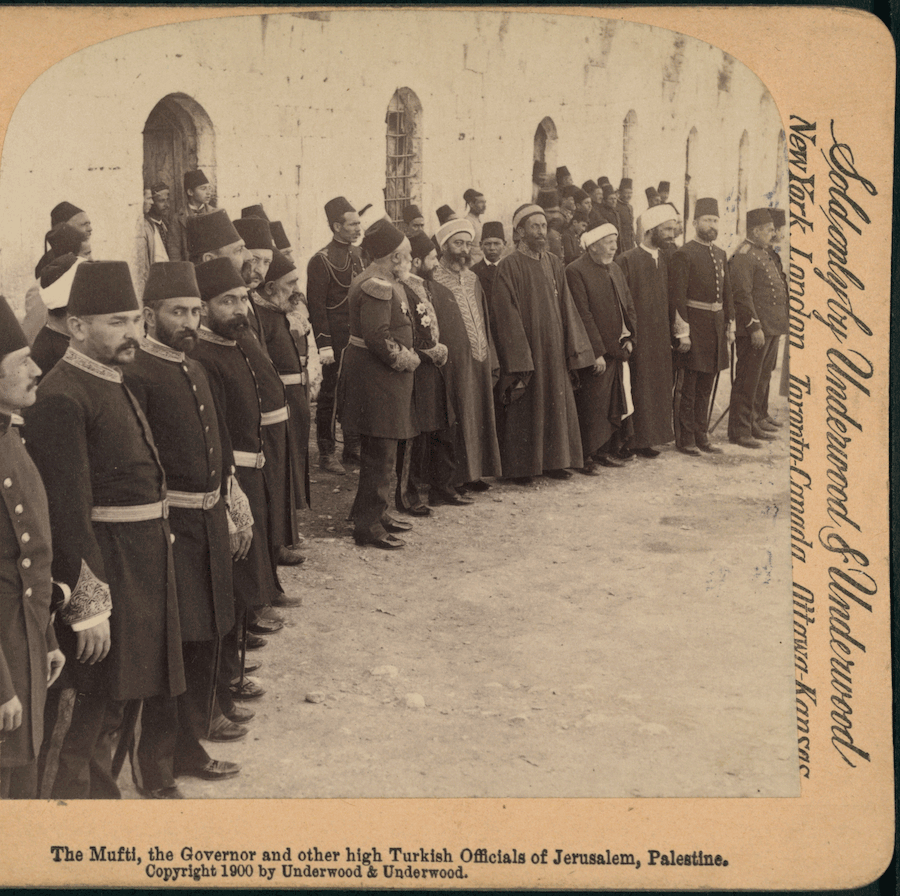
This photograph of the Mufti, the Governor and other high Ottoman officials of Jerusalem, Palestine circa 1900 probably closely resemble, in their dress and bearing, the authorities 'Abdu'l-Bahá would have met with in 'Akká. J.F. Jarvis, publishers. Library of Congress.
'Abdu'l-Bahá also meets officials, notables and townsmen in his efforts to protect and defend the interests of the Bahá'í community. Governors and officials of 'Akká increasingly seek 'Abdu'l-Bahá's profoundly wise counsel on important work-related matters, and 'Abdu'l-Bahá often meets with government officials, religious dignitaries, merchants and learned men. The Muftís of 'Akká, learned scholars and religious leaders, frequently meet with 'Abdu'l-Bahá, sometimes sitting at His feet and seek His knowledge and wisdom.
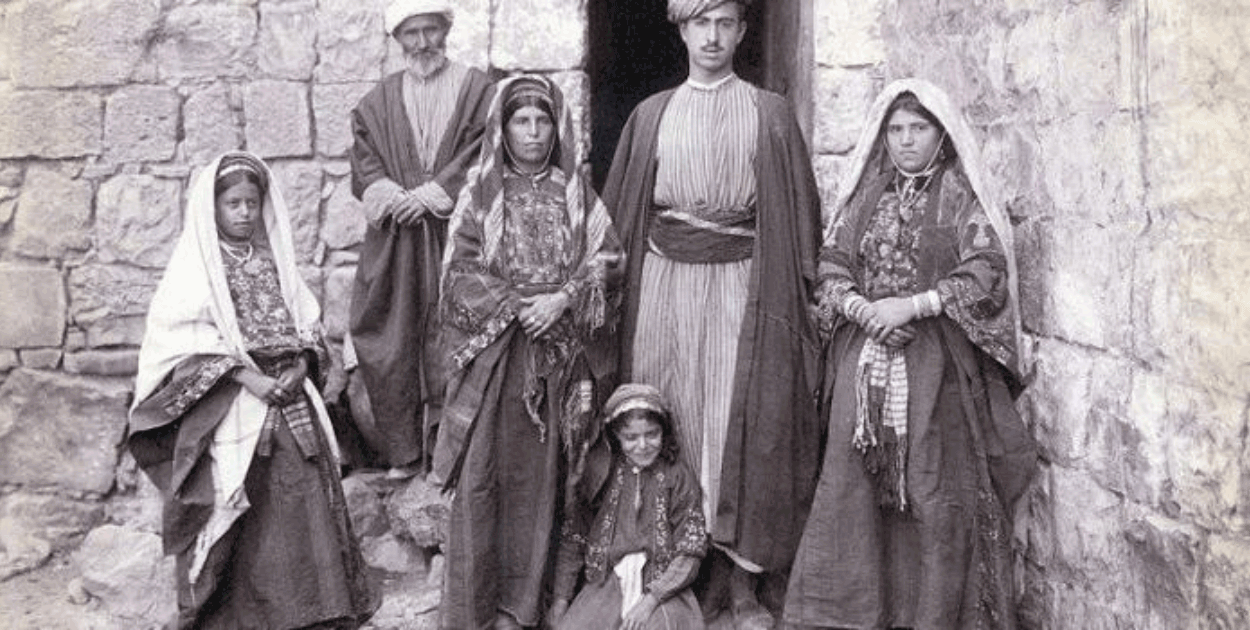
The dress of this Palestinian family of Ramallah, around 1900-1910 is a snapshot of what the people 'Abdu'l-Bahá ministered to would have looked like. Days of Palestine.
'Abdu'l-Bahá's all-encompassing love and care are not limited to the notables of 'Akká or the Bahá'í pilgrims. Each day, 'Abdu'l-Bahá spends many hours visiting the poor and the sick in 'Akká, providing them with attention, love, support, medical treatment, food and clothing. He is, entirely, the "Master of 'Akká," and belongs to everyone. He gives His love as liberally as the sun shines, and the poor and needy, the sick, the old, and the dying, the widows and the orphans, each and every one of them has a loving father and caretaker in 'Abdu'l-Bahá;
Beyond all these duties, 'Abdu'l-Bahá is also a counsellor to individuals. He listens to every person who comes to Him, no matter how humble. He is a true and loving comfort, support and helper to the downtrodden everywhere, as we will see in Part V, when 'Abdu'l-Bahá undertakes His journeys to the West and ministers to the poor and needy from Paris to Sacramento to Ramleh and London, in exactly the same manner as He had in 'Akká.
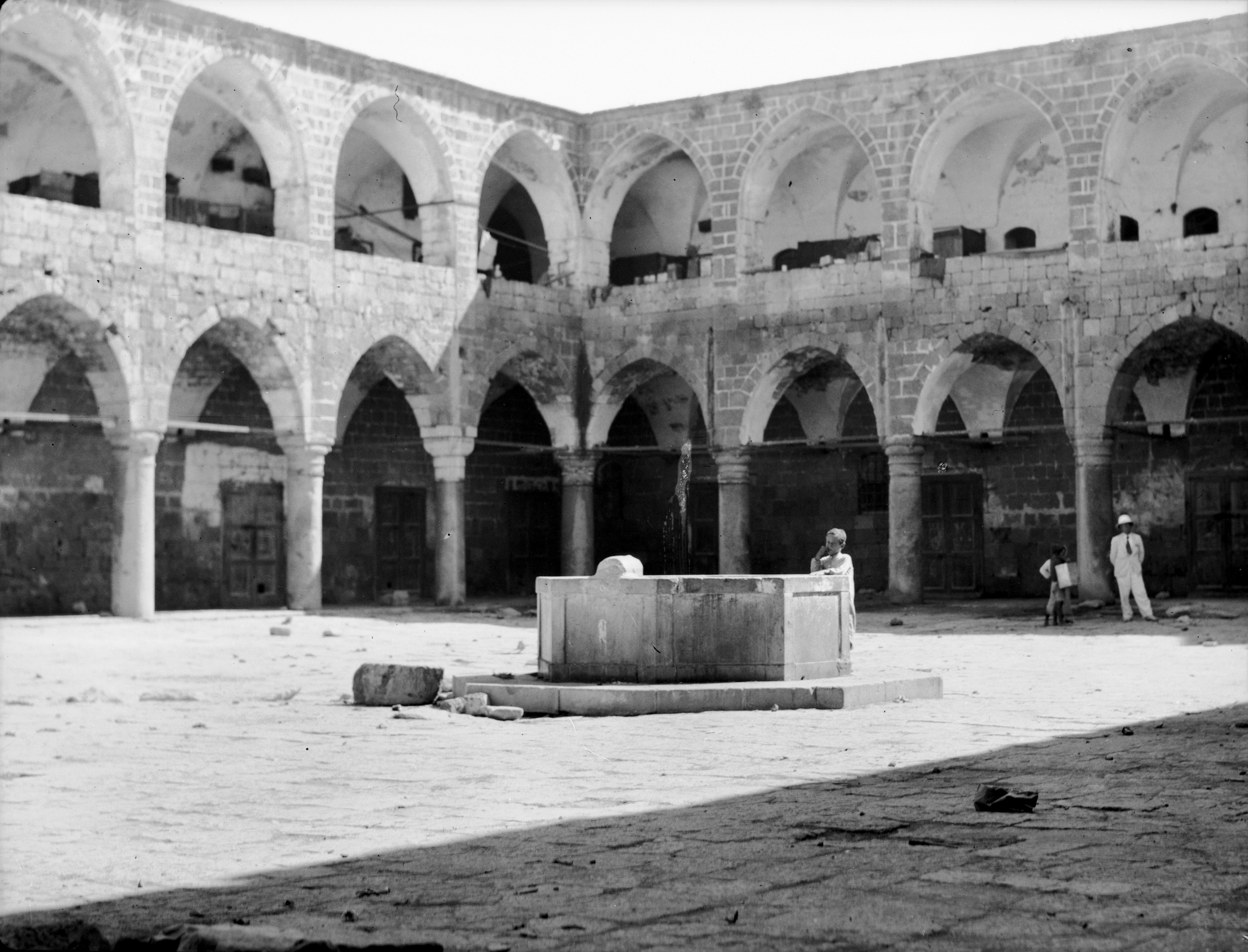
The Khán-i-Avámíd, a caravanserai in ‘Akká also known as Khán of the Pillars or Kahn al-Umdán sometime between 1920 and 1933. This is where the first Bahá'í Pilgrim House is located, and where most Bahá'ís were housed when the barracks were requisitioned in 1870. Matson Photograph collection, Library of Congress. Wikimedia Commons.
Ṭúbá Khánum, 'Abdu'l-Bahá's second-oldest daughter, remembers 'Abdu'l-Bahá's grueling schedule. He rises very early, take tea, then goes into 'Akká until very late at night, without having eaten or rested. He first goes to the Bíruní, a large reception room He has rented across from His home. People crowd here to ask for His help. Sometimes they want to open a shop and need advice, or they require a letter of introduction or perhaps even they need letter of recommendation for a government post. A woman whose husband has been conscripted as a soldier, leaving her and her children to starve or a poor woman whose husband is falsely accused. People come to tell 'Abdu'l-Bahá that children are being mistreated, women are being beaten by their husbands or brothers. 'Abdu'l-Bahá sends a competent person to investigate these claims in order to present the case to a judge and obtain justice for the aggrieved party.
The Muftí, the Governor, Shaykhs, and Court officials come to the Bíruní alone or in groups to meet 'Abdu'l-Bahá and sip on a particularly delicious type of homemade coffee called qahviyi-khanigí while they discuss the news and ask 'Abdu'l-Bahá for explanations, advice or comment. In the eyes of the officials and people of 'Akká, 'Abdu'l-Bahá is a highly wise, compassionate, learned man, who offers practical help and advice liberally, to all. When the court of 'Akká adjourns, the judge invariably came to the Bírúní, and discusses complex cases with 'Abdu'l-Bahá, who invariably solves the problem, no matter how difficult.
On the busiest days, 'Abdu'l-Bahá hardly sees His own family. The people of 'Akká, Bahá'ís, Muslims or Christians are under His constant care. He goes to them whenever they need to see Him, and His responsibilities come first. The only thing 'Abdu'l-Bahá neglects is to rest and eat. The poor are always His first care. 'Abdu'l-Bahá makes His friends happy with small gestures as well: He brings to the Biruní any sweet, fruit or cake sent to Him.
There is no hospital in 'Akká. 'Abdu'l-Bahá hires a doctor Nikolaki Bey, to look after the very poor. Dr. Bey is under instructions not to disclose his employer.
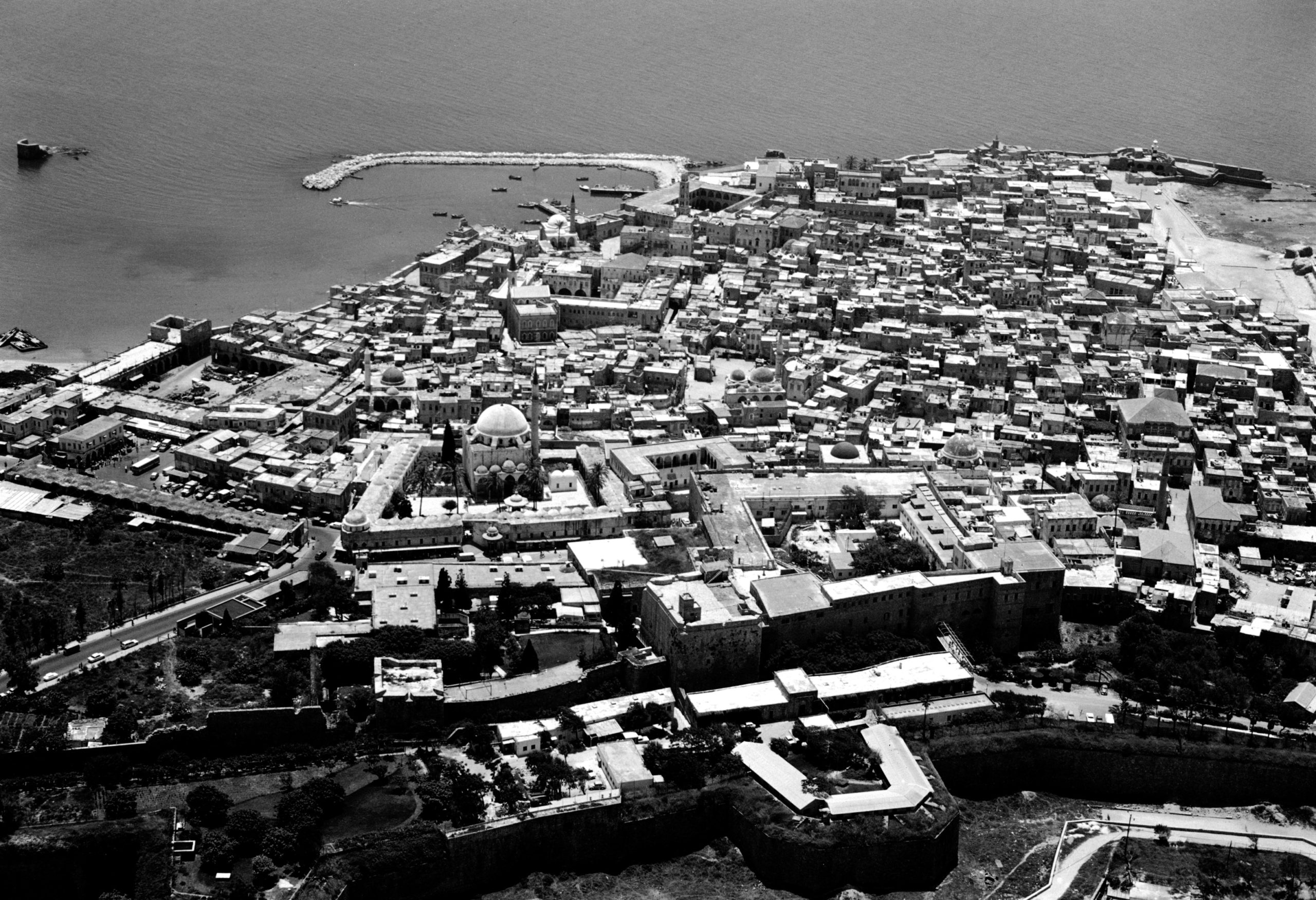
Aerial view of city of ‘Akká, May 1972. Source: Bahá'í Media Bank © Bahá'í International Community.
There is, in fact, one reason alone for 'Abdu'l-Bahá to stay in 'Akká, it is to shield Bahá'u'lláh, shoulder all the responsibilities and allow Bahá'u'lláh to be free from daily concerns and remain solely occupied with Revelation. In addition to the list of responsibilities above, 'Abdu'l-Bahá indirectly protects Bahá'u'lláh by staying in 'Akká, away from Him. Bahá'u'lláh's love for 'Abdu'l-Bahá is so immense, and His praises of 'Abdu'l-Bahá's station so lofty, that 'Abdu'l-Bahá's half-brother Mírzá Muḥammad-'Alí and his mother grow deeply jealous.
In Part IV we will see how Mírzá Muḥammad-'Alí becomes the Arch-breaker of the Covenant of Bahá'u'lláh and 'Abdu'l-Bahá's lifelong and venomous enemy. By staying away from Bahá'u'lláh who loves Him and praises Him so, 'Abdu'l-Bahá is able to somewhat dampen that burning fire of jealousy in Mírzá Muḥammad-'Alí's heart.
In parallel, Bahá'u'lláh will surround Himself with believers who will soon become Covenant-breakers, keeping those most likely to cause trouble or perceived by Him as being inwardly unfaithful, as close to Him as possible in order to keep them in check and mitigate their mischief. What Bahá'u'lláh does when given a measured amount of freedom is to surround Himself with individuals who will, in the end, be disloyal to Him and to His Cause. Both 'Abdu'l-Bahá and Bahá'u'lláh practice empathy at a very high personal cost.
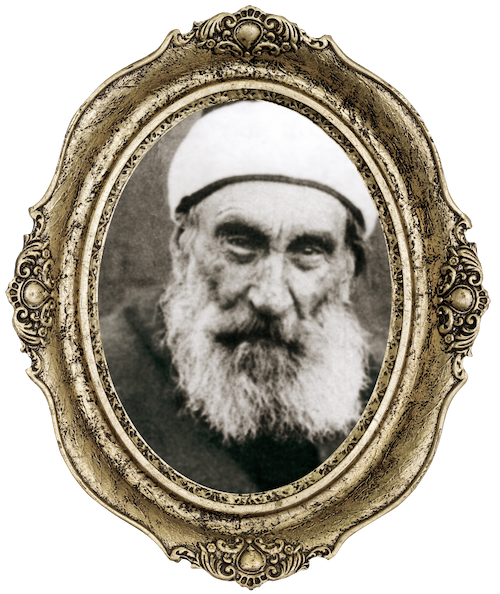
Ḥájí Mírzá Ḥaydar ‘Alí. Source: Baha'is Worldwide.
Ḥájí Mírzá Ḥaydar ‘Alí recounts a delightful moment between 1877 and 1879 when Bahá'u'lláh, passing in the street is referred to as "the father of 'Abdu'l-Bahá":
Three months passed and I was still a pilgrim. During this time, ‘Abdu’l-Bahá arranged to rent the Mansion of Mazra‘ih, where Bahá’u’lláh lived for two years. I remember that once the Riḍván Feast was celebrated in the house of Jináb-i-Kalı́m, where I was living. A new páshá had arrived in ‘Akká as the head of the Custom House. On that day he was sitting in a coffeehouse with many of his officers and other dignitaries of the town.
Bahá’u’lláh was on His way to His brother’s house. As He passed the coffeehouse, the páshá and all his retinue stood up and bowed before Him. As He passed by, He bestowed His loving benediction upon them. Then the páshá, bewildered, approached his friends and asked, “Is this the Holy Spirit or the King of Kings? Who is He?” “He is the father of ‘Abbás Effendi,” was the unanimous reply.
Stories from The delight of hearts: The memoirs of Ḥájí Mírzá Ḥaydar-ʻAlí
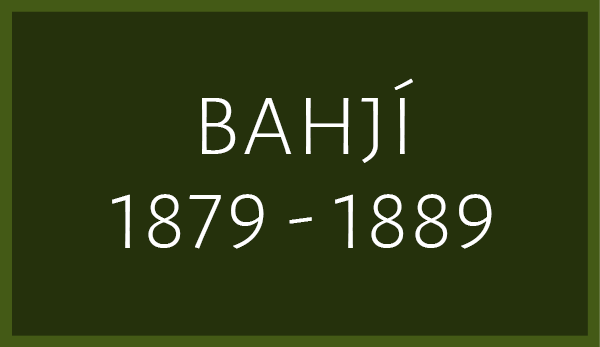
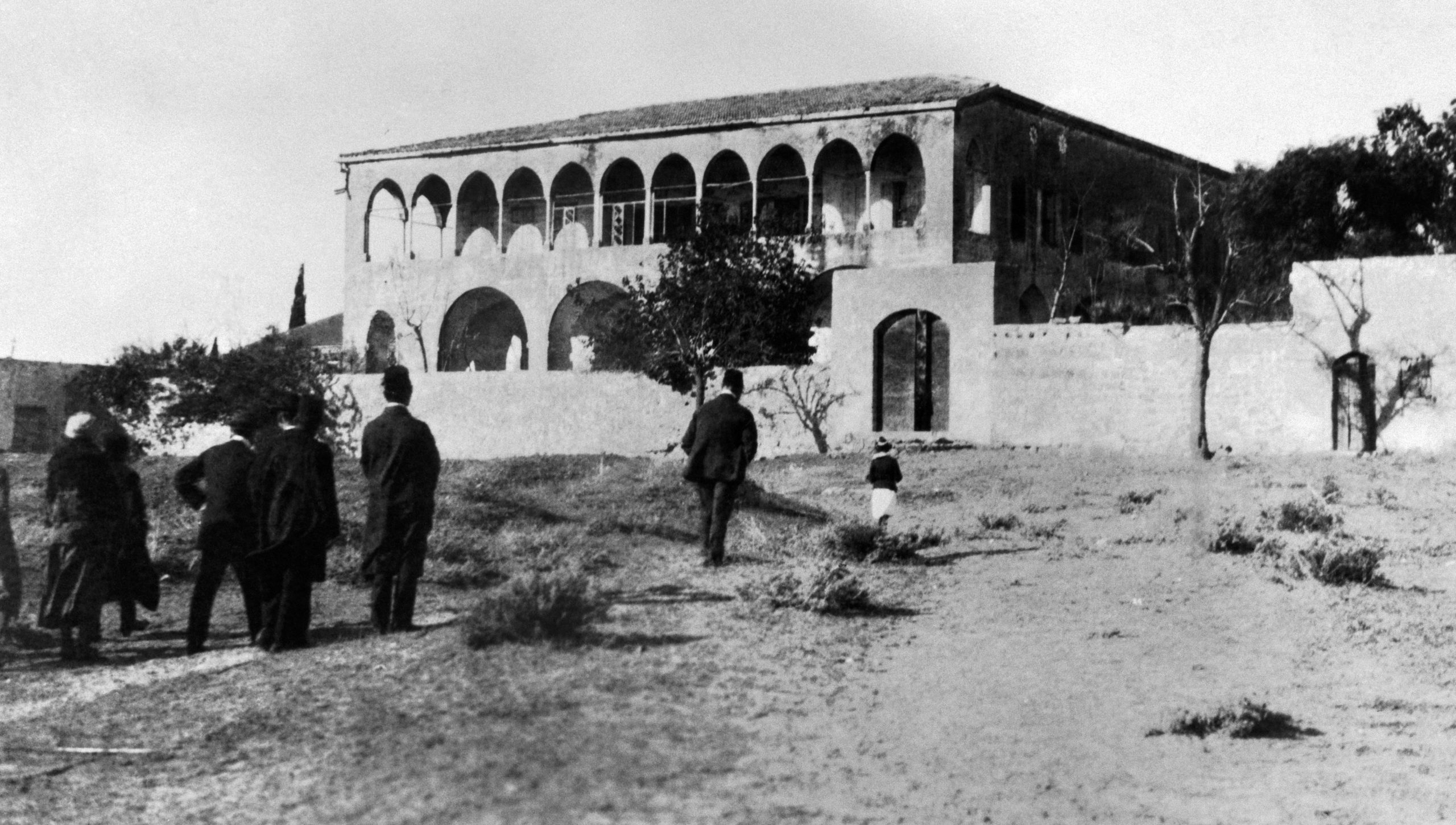
A group of pilgrims and local Bahá’ís approaching the Mansion of Bahjí, 1919. Bahá'í Media Bank.
Bahá'u'lláh's two years at Mazra'ih are pleasant and productive, but the small mansion is far too small to accommodate Bahá'u'lláh's needs, the needs of the Holy Family, and those of a growing community of exiles and expatriate settlers in 'Akká. While Bahá'u'lláh is imprisoned in the barracks between 1868 and 1870, ‘Údí Khammár is busy building his palace, which he calls "Bahjí" ("Delight"). In 1879, an epidemic breaks out in the countryside and people flee. ‘Údí Khammár dies that same year and is buried by the wall of his mansion. 'Abdu'l-Bahá first rents, then purchases the mansion of Bahjí, and Bahá'u'lláh moves into His final residence in September 1879. Shoghi Effendi tells us that Bahá'u'lláh will call Bahjí the "lofty mansion" and the spot which "God hath ordained as the most sublime vision for mankind."
From the windows of His room in Bahjí, Bahá'u'lláh can see blue waters of the Mediterranean, the minarets of 'Akká and the slope of Mount Carmel in Haifa, where He will soon pitch His tent.
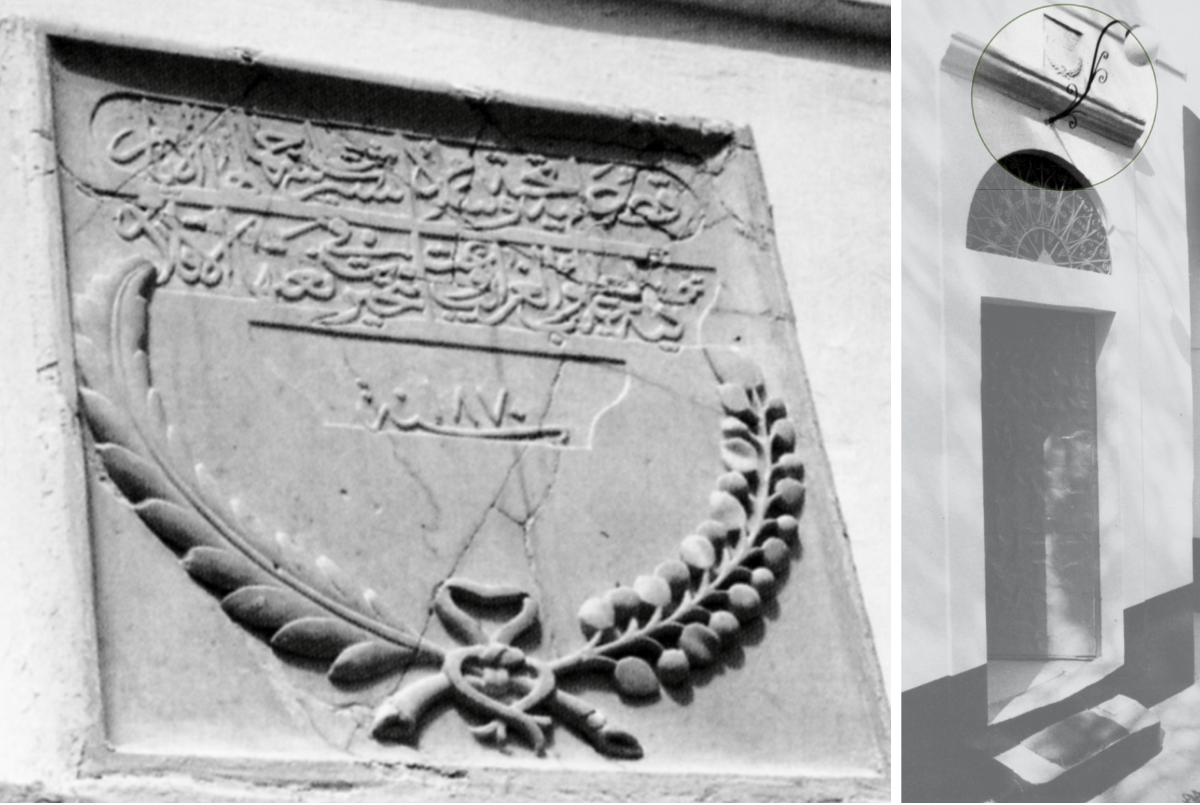
Left: Close up photograph of the inscription engraved in stone placed by 'Udi Khammár above the entrance door to Bahjí. Right: Entrance door to the Mansion of Bahjí. The inscription by 'Udí Khámmar is the small stone carving above the curved metal decoration of the door, behind the lamp, in the spotlighted area. Both photographs provided courtesy of George Ronald Publishers and used with permission.
While building his mansion in the 1870s, ‘Údí Khammár is moved to place an inscription above the door in Arabic which eloquently foreshadows the events which will occur within its walls once Bahá'u'lláh inhabits it:
Greetings and salutations rest upon this mansion which increaseth in splendour through the passage of time.
Manifold wonders and marvels are found therein, and pens are baffled in attempting to describe them.
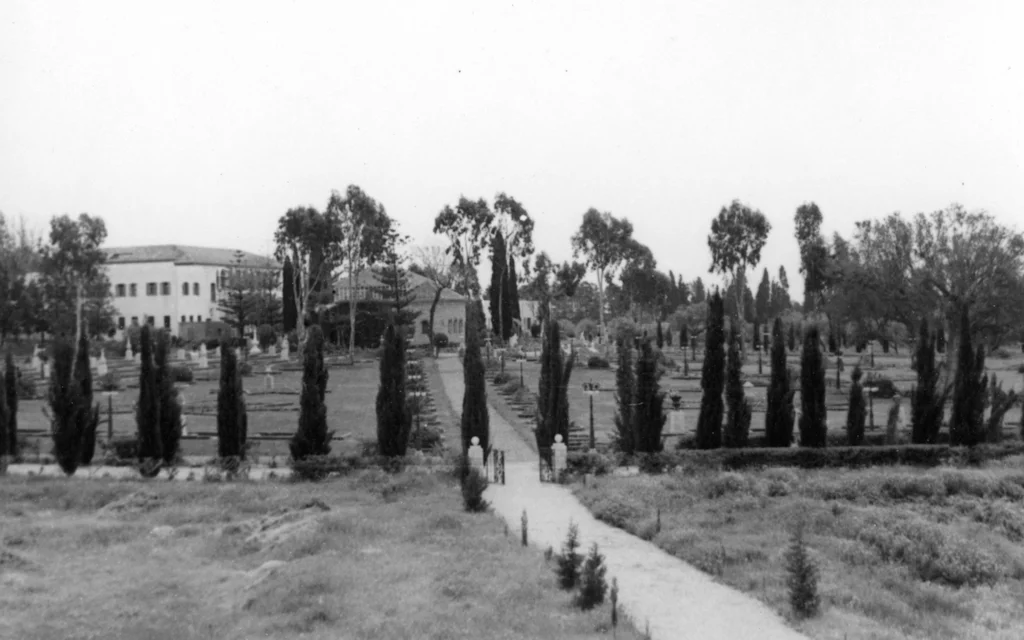
A view of Bahjí and its gardens, 1950s. Bahá'í Media Bank
Hájí Mírzá Haydar-'Alí , known as "The Angel of Carmel," spent nine months on pilgrimage in 'Akká. In the most memorable of his interviews with Bahá'u'lláh, the Blessed Beauty speaks at length about 'Abdu'l-Bahá's protective role towards Him, shielding Him from the outside world from the days of Baghdád, to Adrianople, 'Akká, Mazra'ih and finally Bahjí:
During the days of Baghdád We ourself used to visit the coffee house and meet with everyone. We associated with people whether they were in the community or outside, whether acquaintances or strangers, whether they came from far or near.
We considered those who were distant from us to be near, and the strangers as acquaintances. We served the Cause of God, supported His Word, and exalted His Name. The Most Great Branch ['Abdu'l-Bahá] carried out all these services, withstood all the difficulties, and endured the sufferings and calamities to a great extent in Adrianople, and now to a far greater extent in 'Akká. Because while in Baghdád, to all appearances We were not a prisoner, and the Cause of God had hardly enjoyed the fame it does today. Those who opposed it and the enemies who fought against it were comparatively few and far between.
In Adrianople We used to meet with some people and gave permission to some to attain Our presence. But while in the Most Great Prison We did not meet with anyone and have completely closed the door of association with the people.
Now the Master has taken upon Himself this arduous task for Our comfort. He is a mighty shield facing the world and its peoples, and so He has relieved Us {from every care}. At first He secured the Mansion of Mazra'ih for Us and We stayed there, then the Mansion of Bahjí. He is so occupied in the service of the Cause that for weeks He does not find the opportunity to come to Bahjí.
We are engaged in meeting with the believers and revealing the verses of God, while He labours hard and faces every ordeal and suffering. Because to deal and associate with these people is the most arduous task of all.
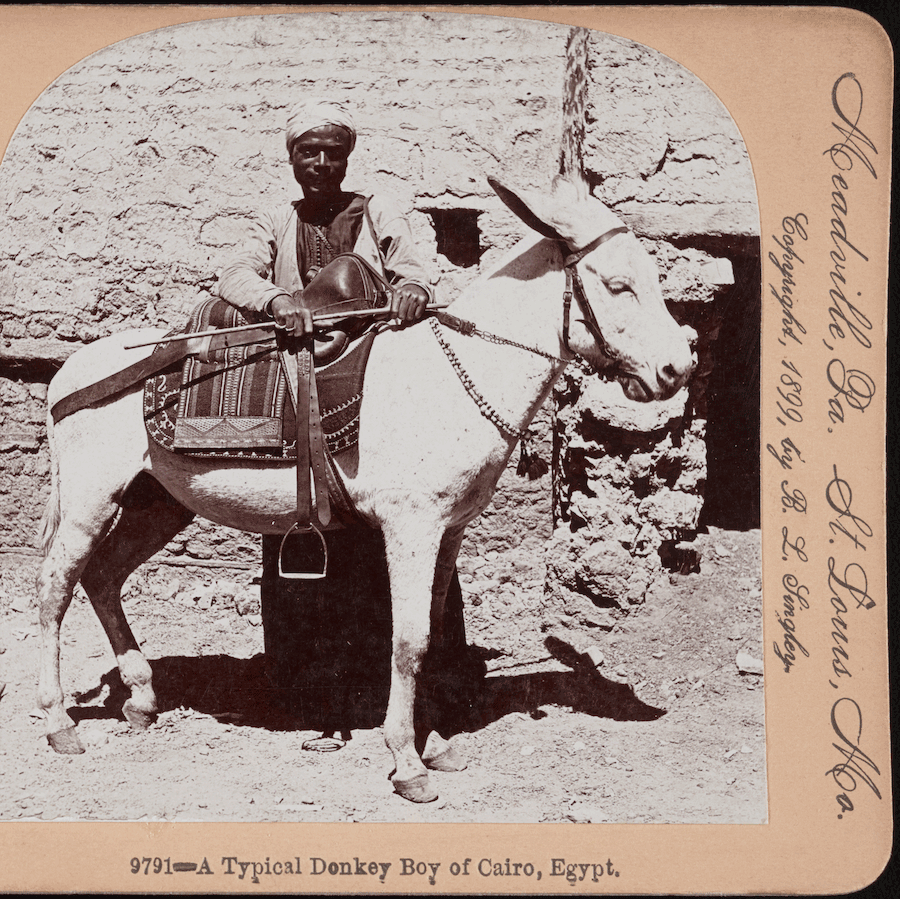
A beautiful white donkey in Cairo, Egypt in 1899. Photograph by Keystone View Company. Library of Congress.
Bahá'u'lláh spends the spring, summer and autumn seasons in the Mansion of Bahjí. When He visits 'Akká, the Garden of Riḍván, Mazra'ih or Junaynih, Bahá'u'lláh rides a white donkey named Barq ("lightning"), always accompanied by a servant. When Barq dies, another donkey is brought for Bahá'u'lláh from Persia, and this one is called Ra'd (thunder).
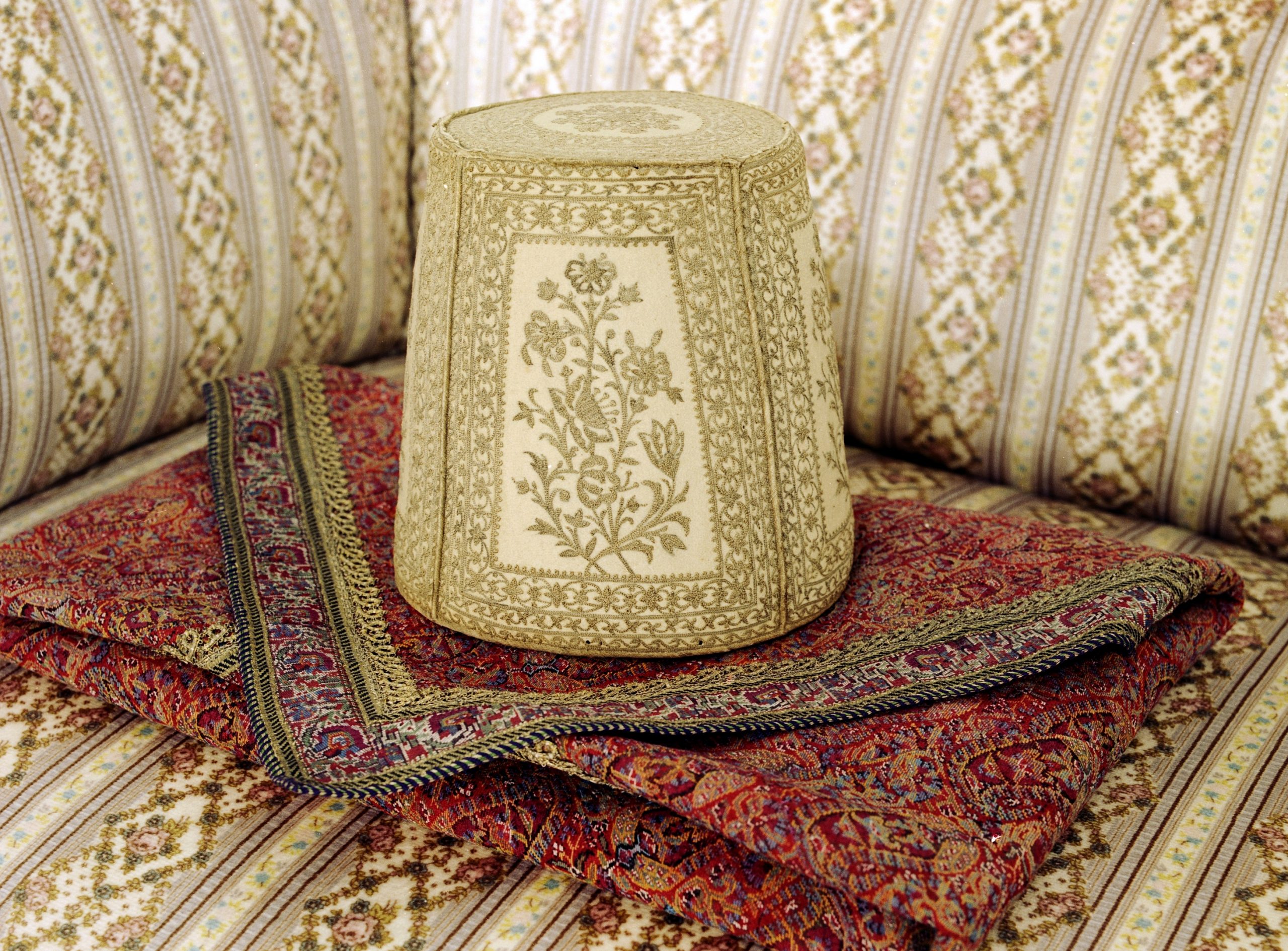
Taj (tall headdress/hat) belonging to Bahá'u'lláh. Bahá'í Media Bank.
By the time Bahá'u'lláh arrives in Bahjí, the edict of Sulṭán ‘Abdu’l-‘Azíz, though still in effect, is, in essence a dead letter. Though Bahá’u’lláh is still technically a prisoner of the Ottoman empire, in 'Abdu'l-Bahá's words:
(...) the doors of majesty and true sovereignty were flung wide open...The rulers of Palestine, envied His influence and power. Governors and mutiṣarrifs, generals and local officials, would humbly request the honor of attaining His presence—a request to which He seldom acceded.
'Abdu'l-Bahá quoted by Shoghi Effendi in God Passes By
In Bahjí, Bahá’u’lláh almost never grants personal interviews as He had in Baghdád, but His influence is so powerful that the people of 'Akká attribute the improvement of the city's water and climate to His long residence in the area. They feel such reference towards Bahá'u'lláh that they refer to Him as the “august leader,” and “his highness.” A European general, granted a rare interview with Bahá'u'lláh along with the Governor of 'Akká, is so overcome that he remains kneeling on the ground by the door.
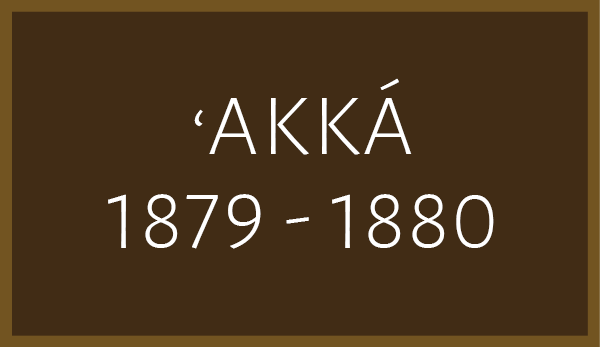
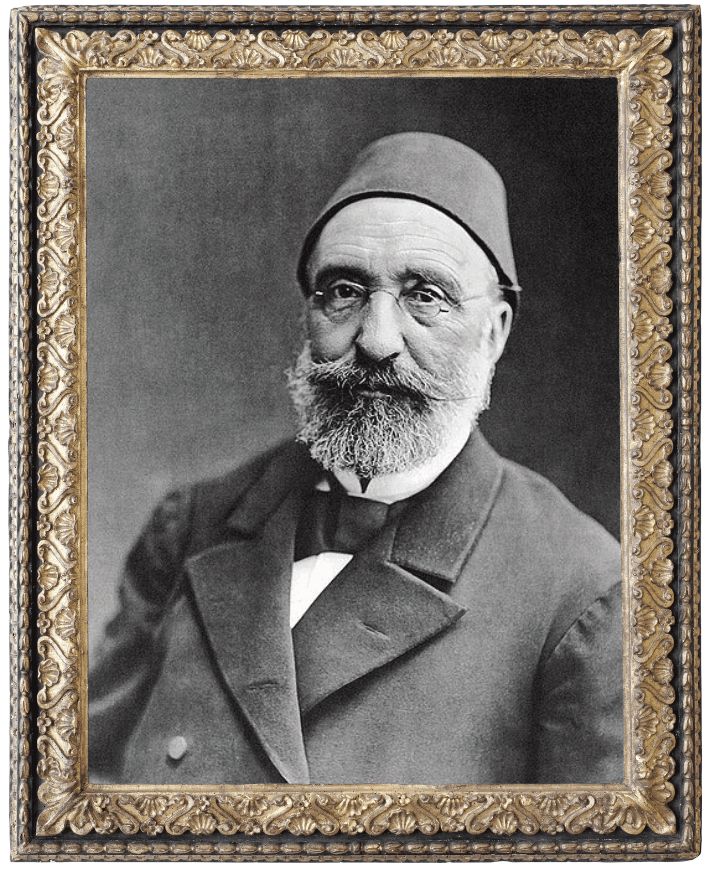
Midḥat Páshá (1822–1884). Wikipedia Commons.
Midḥat Páshá, (Ahmed Şefik) is a highly capable and outstanding official of the 19th century Ottoman Empire and liberal reformer who, as Grand Vizier, will be instrumental in inducing the Sulṭán to grant a constitution to his people. He has encountered the Bahá'ís in Baghdád twice before, in 1869 and in 1870, both times treating them with fairness. He is appointed Governor of Syria from late November 1878 to August 1880. In May 1880, Midḥat Páshá is on a tour of inspection of Palestine, having traveled overland from Beirut, and visits Tiberias, Nazareth, ‘Akká, and Haifa, from where he boards a boat to return to Beirut.
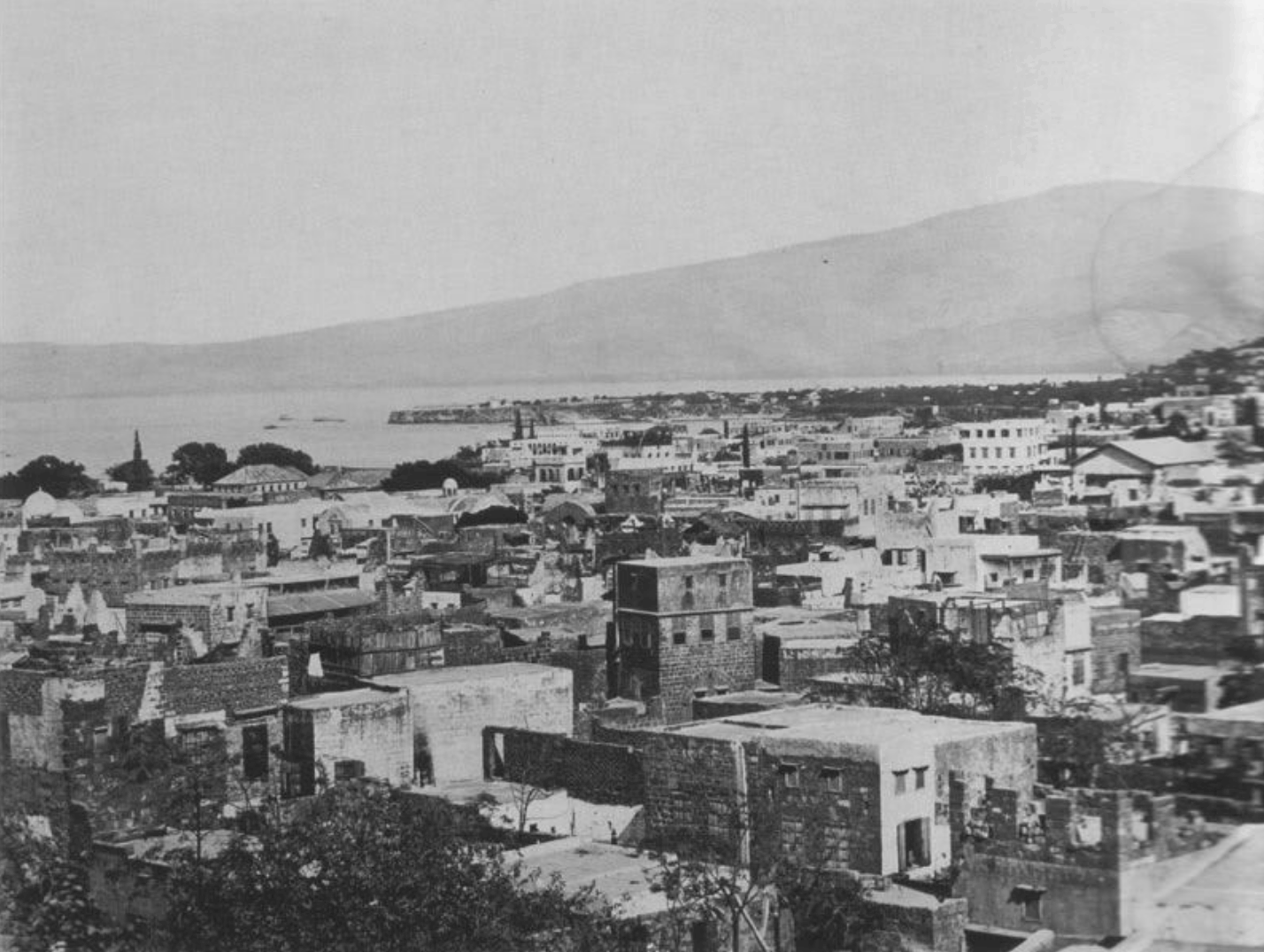
Beirut in 1867. Photograph from Old Beirut Blog (website closed). Accessed 2021/01/09.
During his visit to 'Akká, Ḥájí Mírzá Ḥaydar ‘Alí recounts that, hearing there is no more lovely place in the area than the Riḍván Gardens, officials request that Midḥat Páshá be allowed to visit. Midḥat Páshá is enchanted by the condition, the beauty and purity of the garden and by its flowers and correctly assumes it must belong to 'Abdu'l-Bahá, whom he has heard high praise about from many intellectuals. Midḥat Páshá is also aware of 'Abdu'l-Bahá's utterances in Turkish, yet another proof of 'Abdu'l-Bahás superhuman knowledge. 'Abdu'l-Bahá's Turkish was so eloquent, says Ḥájí Mírzá Ḥaydar ‘Alí, that he could reduce eloquent and learned men to a state of meekness and humility through His responses to their questions on spiritual matters. According to Ḥájí Mírzá Ḥaydar ‘Alí, Midḥat Páshá says:
For years I have longed to meet Him. I have seen His utterances in Turkish that are beyond like or equal and eloquently testify to His vast knowledge. I have often heard many of the learned highly praising and extolling Him.
Midḥat Páshá then sends a courier with the message:
I yearn to meet His Excellency.
'Abdu'l-Bahá pays Midḥat Páshá a visit. The latter is so enchanted with 'Abdu'l-Bahá that he pays Him a return visit. During his two or three day stay in 'Akká, Midḥat Páshá spends most of his time humble and lowly in 'Abdu'l-Bahá's presence. As he is about to leave, he asks 'Abdu'l-Bahá to return with him to Syria and adorn Beirut with His presence, but the Master declines. Once in Beirut, Midḥat Páshá writes to 'Abdu'l-Bahá and communicates to him in a couplet, his desire to meet Him again:
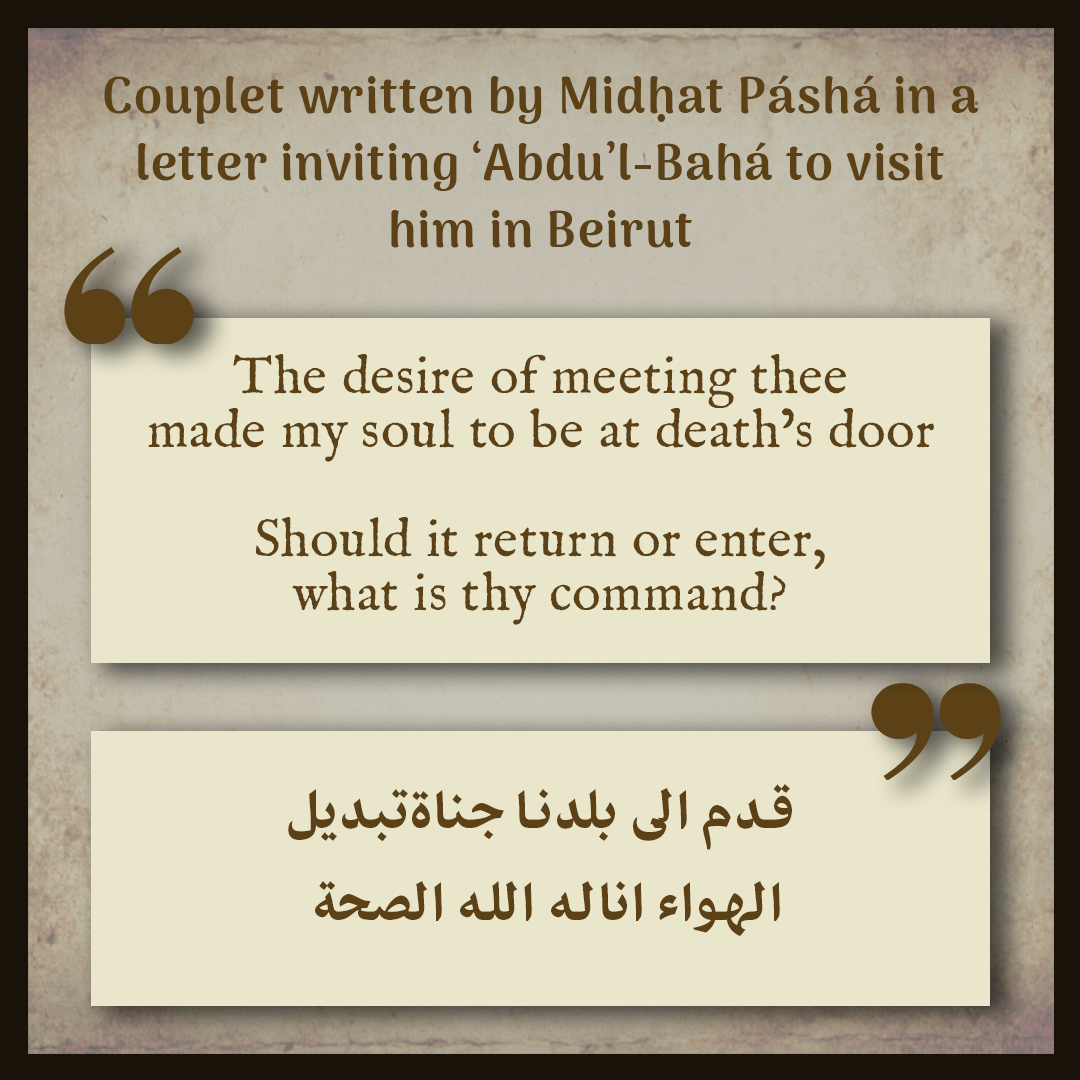
Original graphic by Violetta Zein from information found in Midhat Pasha and ‘Abdu’l-Baha in ‘Akka: The Historical Background of the Tablet of the Land of Bá by Necati Alcan.
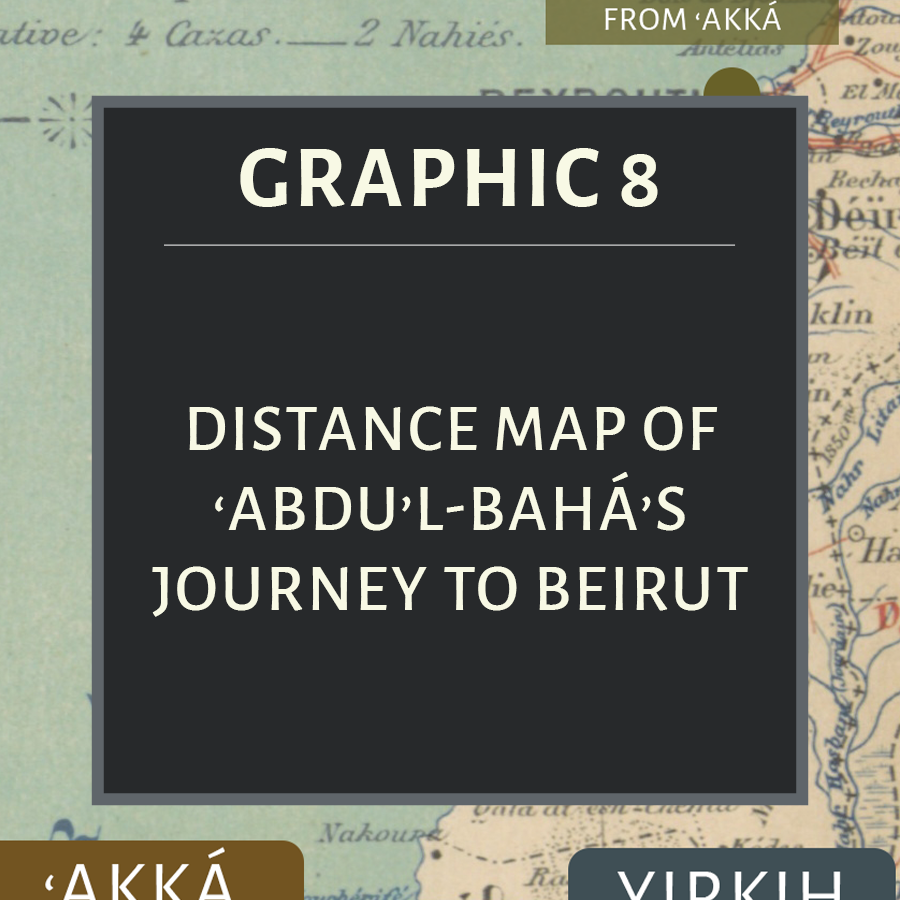
We do not have information about the journey to Beirut, but ‘Abdu’l-Bahá traveled overland back to ‘Akká. This distance map calculates the distances between the only stops we were able to find for this journey. Yirkih is the Druze Village where ‘Abdu’l-Bahá meets Bahá’u’lláh. Original graphic by Violetta Zein. 1896 Base map of “Syrie, Liban et Palestine. Géographie administrative, statistique, descriptive et raisonnée” from the British Library Collection. Wikimedia Commons.
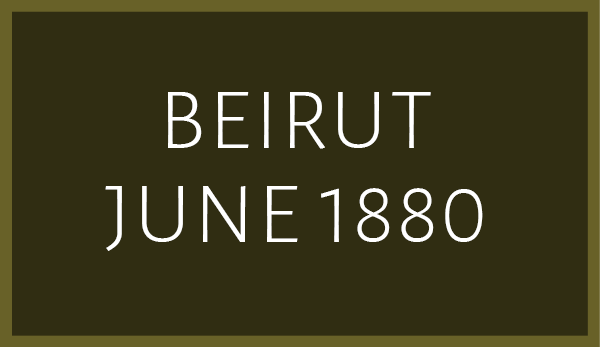
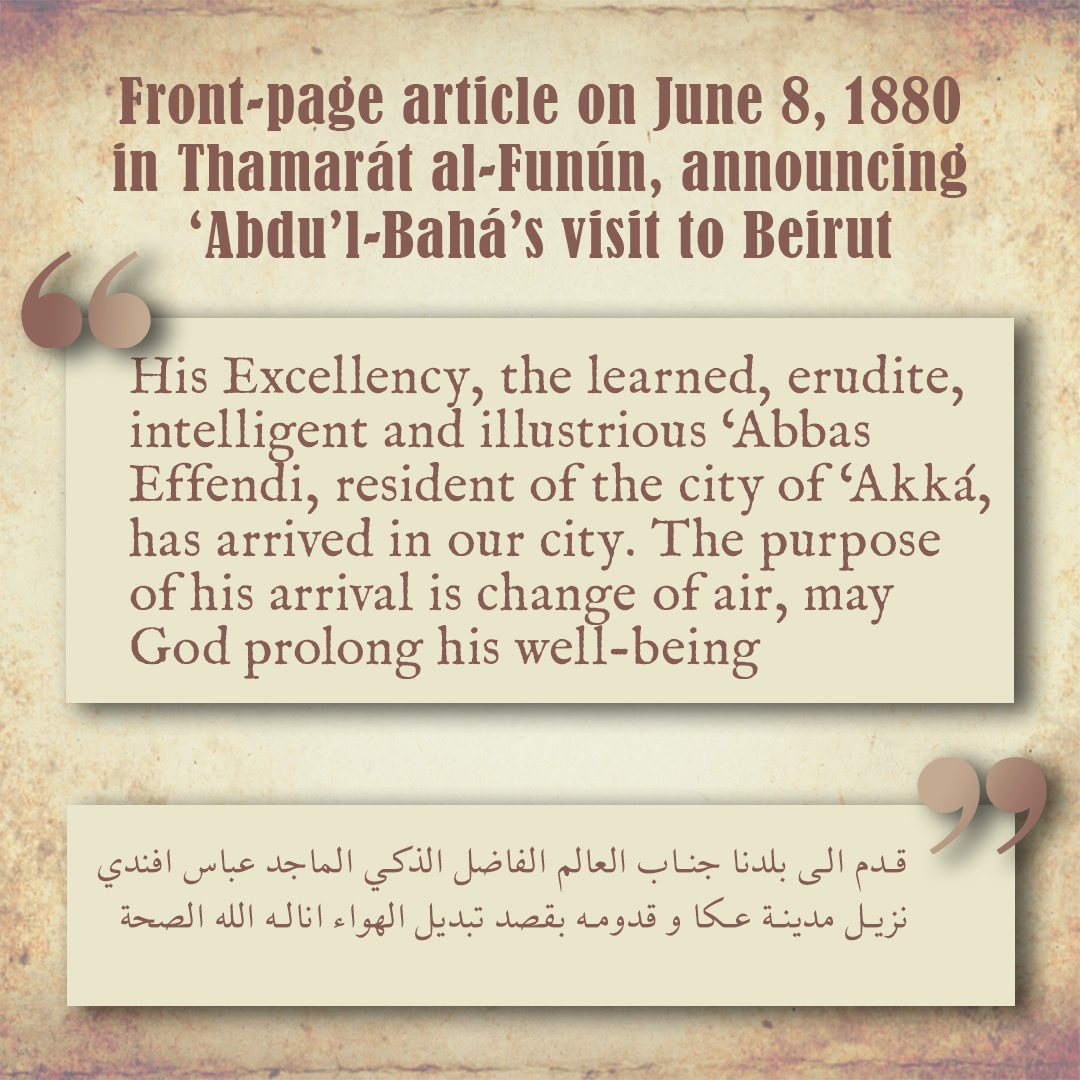
Original graphic by Violetta Zein from information found in Midhat Pasha and ‘Abdu’l-Baha in ‘Akka: The Historical Background of the Tablet of the Land of Bá by Necati Alcan.
'Abdu'l-Bahá visits Beirut from June 1-17, 1880. His arrival, as is the custom in the region when any notable arrives in a city, is announced in the Beirut-based weekly Thamarát al-Funún newspaper on Tuesday 8 June 1880:
“His Excellency, the learned, erudite, intelligent and illustrious ‘Abbas Effendi, resident of the city of ‘Akka, has arrived in our city. The purpose of his arrival is change of air, may God prolong his well being.”
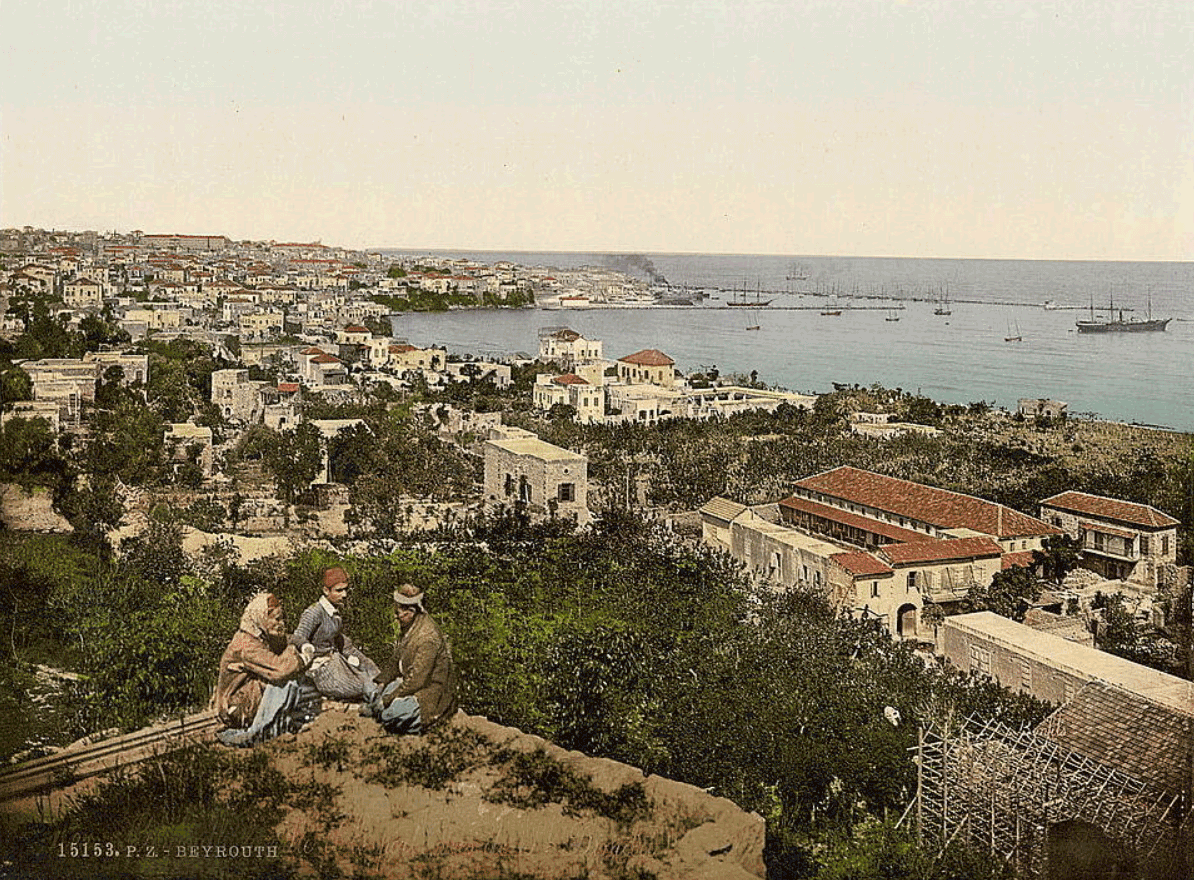
Beirut in the 1890s. Old Beirut Blog (website closed). Accessed 2021/01/09.
'Abdu'l-Bahá receives a very warm reception in Beirut. Apart from the very important Midḥat Páshá, Governor of the province of Syria, 'Abdu'l-Bahá meets many eminent individuals from all walks of life. Foremost among them all is Shaykh Muḥammad-'Abduh, the future Grand Muftí of Egypt, an extraordinarily powerful and influential position.
Shaykh Muḥammad-'Abduh is a good and righteous man, and he is thoroughly captivated by the immense width and breadth of 'Abdu'l-Bahá's knowledge, and by His charm in appearance, character, and manner. Shaykh Muḥammad-'Abduh is so captivated by 'Abdu'l-Bahá, in fact, that he resolves to return to 'Akká with Him. 'Abdu'l-Bahá dissuades the Shaykh, because following through with this intention would have greatly harmed Shaykh Muḥammad-'Abduh in his standing and reputation.
Following His visit to Beirut, 'Abdu'l-Bahá, once again a prisoner within the walls of 'Akká, will receive letters from Shaykh Muḥammad-'Abduh, as well as from other outstanding men of influence in Syria, clear testimonies to 'Abdu'l-Bahá's growing influence and impact in the society and government of the region in which He lives.
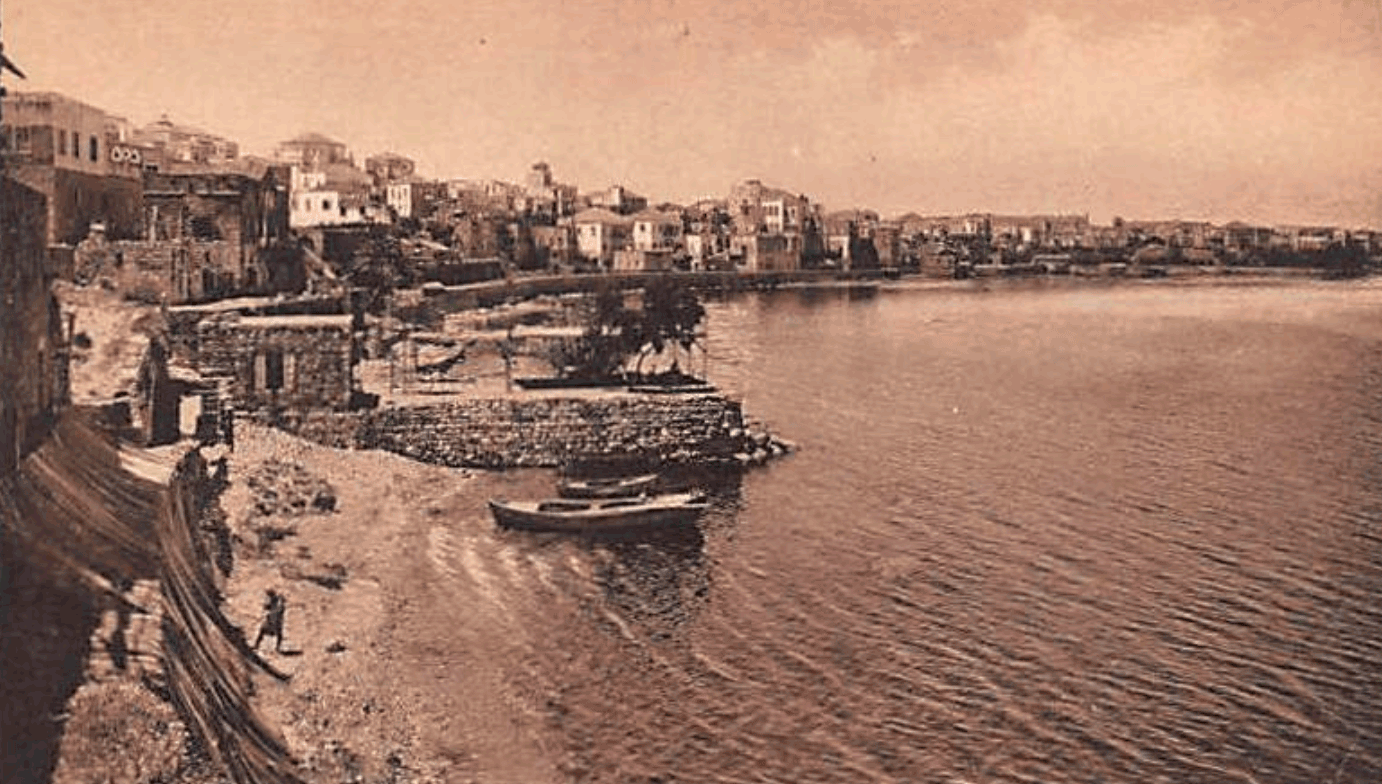
Beirut sea view in 1880, the year 'Abdu'l-Bahá visits Beirut. Old Beirut Blog (website closed). Accessed 2021/01/09.
While 'Abdu'l-Bahá is in Beirut, on June 9, 1880, Bahá’u’lláh reveals an extraordinary Tablet in honor of ‘Abdu’l-Bahá’s visit to Beirut, the Lawḥ-i-Arḍ-i-Bá (Tablet of the Land of Bá [Bá = Beirut]). The station of 'Abdu'l-Bahá, first unveiled in the Súriy-i-Ghúṣn in Adrianople 12-16 years prior to this Tablet, are now fully emphasized in this Tablet before being clearly enunciated in the Kitáb-i-‘Ahd, the Book of Bahá'u'lláh's Covenant, which He reveals 11 years after the Lawḥ-i-Arḍ-i-Bá:
Praise be to Him Who hath honored the Land of Bá through the presence of Him round Whom all names revolve. All the atoms of the earth have announced unto all created things that from behind the gate of the Prison-city there hath appeared and above its horizon there hath shone forth the Orb of the beauty of the great, the Most Mighty Branch of God—His ancient and immutable Mystery—proceeding on its way to another land. Sorrow, thereby, hath enveloped this Prison-city, whilst another land rejoiceth.
Exalted, immeasurably exalted is our Lord, the Fashioner of the heavens and the Creator of all things, He through Whose sovereignty the doors of the prison were opened, thereby causing what was promised aforetime in the Tablets to be fulfilled. He is verily potent over what He willeth, and in His grasp is the dominion of the entire creation. He is the All-Powerful, the All-Knowing, the All-Wise.
Blessed, doubly blessed, is the ground which His footsteps have trodden, the eye that hath been cheered by the beauty of His countenance, the ear that hath been honored by hearkening to His call, the heart that hath tasted the sweetness of His love, the breast that hath dilated through His remembrance, the pen that hath voiced His praise, the scroll that hath borne the testimony of His writings. We beseech God—blessed and exalted be He—that He may honor us with meeting Him soon. He is, in truth, the All-Hearing, the All-Powerful, He Who is ready to answer.
Bahá'u'lláh, the Lawḥ-i-Arḍ-i-Bá, (Tablet of the Land of Bá)
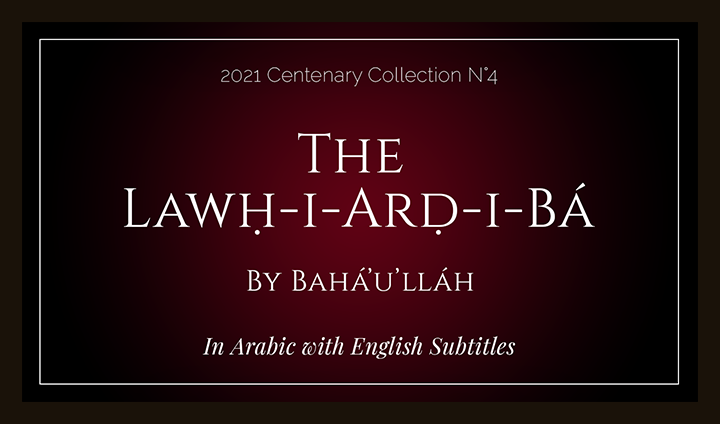
Listen to the full text of the Lawḥ-i-Arḍ-i-Bá, recited in Arabic with English subtitles and transliteration, a production of The Utterance Project as a part of the Centenary Collection, dedicated to a spiritual preparation for the Centenary of the Ascension of 'Abdu'l-Bahá.
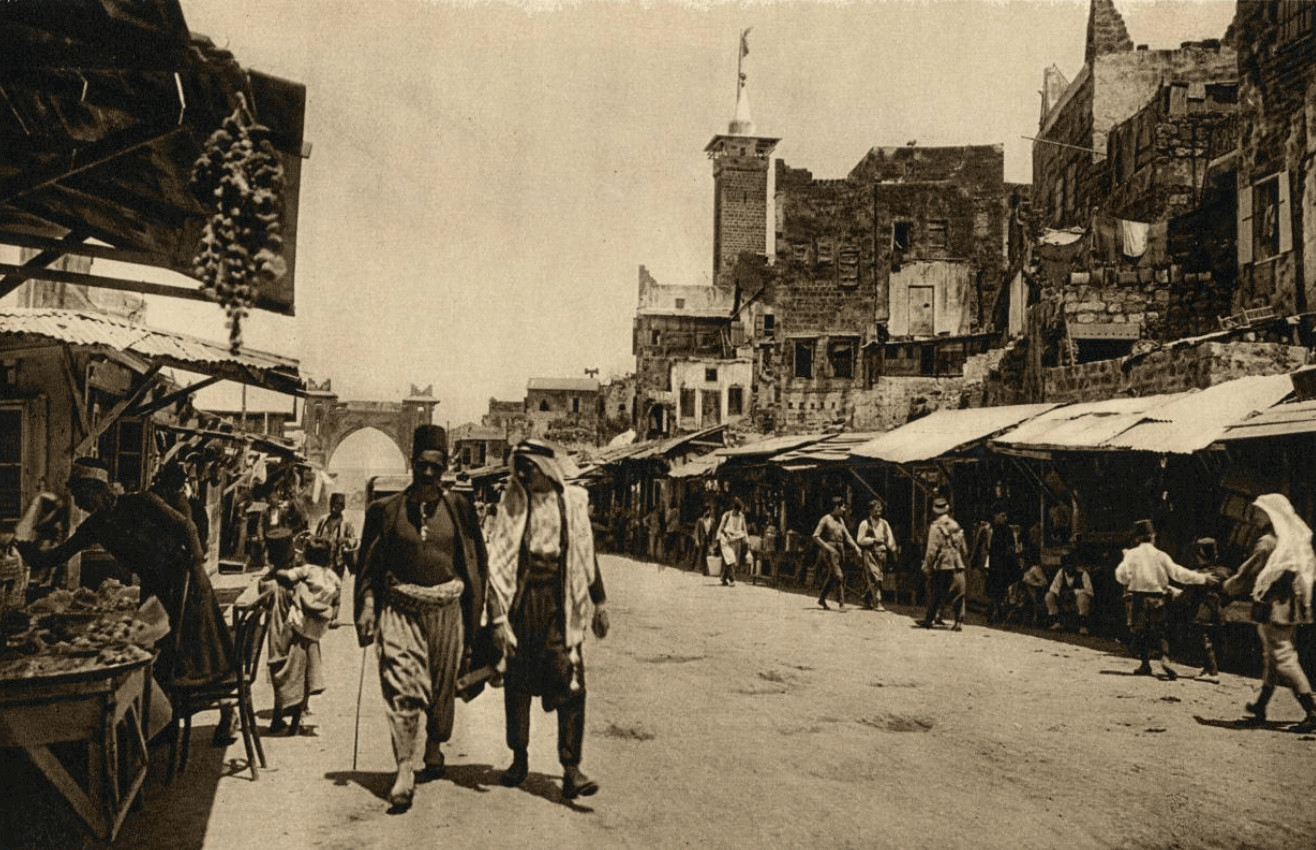
A city street scene in Beirut in the 1890s, ten years after 'Abdu'l-Bahá's visit. The way people are dressed and the stalls and buildings would be very close to exactly the same as what 'Abdu'l-Bahá would have seen in 1880. Old Beirut Blog (website closed). Accessed 2021/01/09.
Shoghi Effendi's words act as a guide for us to understand the weighty significance of 'Abdu'l-Bahá's journey to Beirut. At the time of this visit, 'Abdu'l-Bahá is 36 years old, and has been living in 'Akká for 12 years, most of His adult life. Outwardly a prisoner, He is a respected figure in 'Akká, and through the majesty of his saintly character and profound knowledge his influence has radiated to the region surrounding 'Akka, all the way to Syria:
It was through the extraordinarily warm reception accorded Him during His visit to Beirut, through His contact with Midhat Páshá, a former Grand Vizir of Turkey, through His friendship with ‘Azíz Páshá, whom He had previously known in Adrianople, and who had subsequently been promoted to the rank of Valí, and through His constant association with officials, notables and leading ecclesiastics who, in increasing number had besought His presence, during the final years of His Father’s ministry, that He had succeeded in raising the prestige of the Cause He had championed to a level it had never previously attained.
Shoghi Effendi, God Passes By

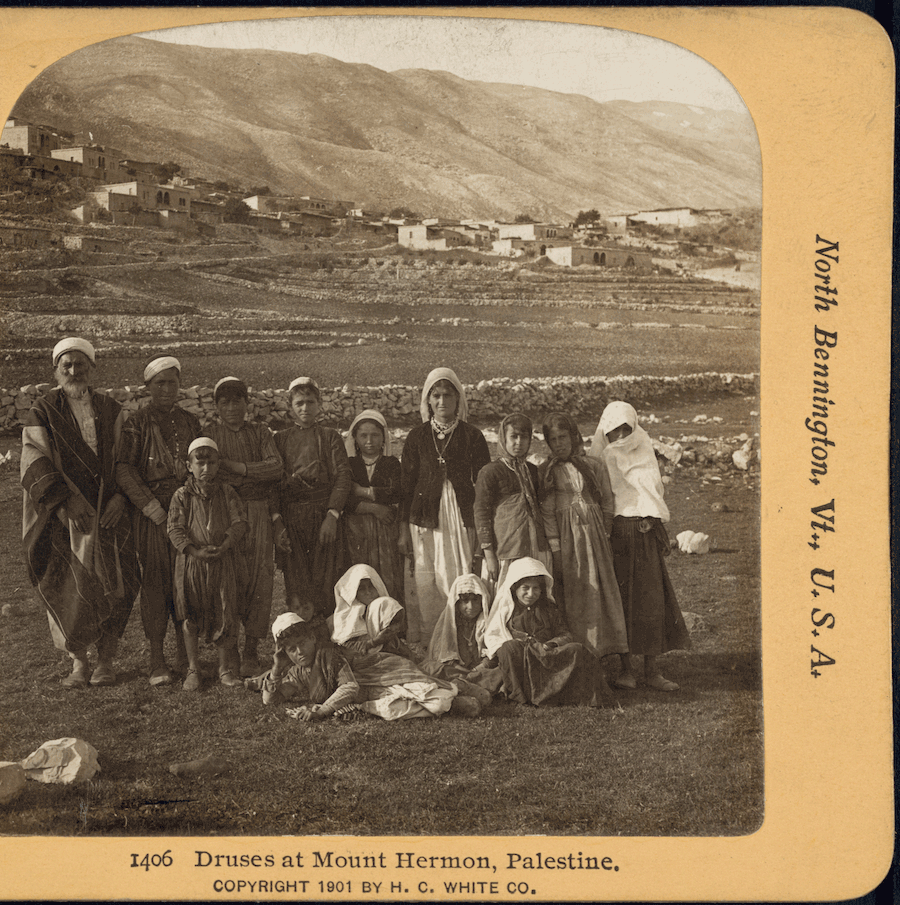
Example of what Druze villagers would appear like, some 20 years after Bahá'u'lláh and 'Abdu'l-Bahá spent time in their villages. These are Druzes of Mount Hermon, circa June 1901. Photographer H.C. White Co. Library of Congress.
As 'Abdu'l-Bahá is returning from Beirut, Bahá'u'lláh leaves Bahjí for the Druze village of Yarká, 8 kilometers north-east of 'Akká, where He remains for seven nights. 'Abdu'l-Bahá joins Him in Yarká for the last four nights.
There is a record of Bahá'u'lláh once spending three months in Yarká, and the Blessed Beauty also visited the Druze villages of Abú-Sinán, and passed through or near the villages of Ghabsíyyih, Shaykh Dannún and Shaykh Dawúd as well as An'Afífí to visit the garden of Ḥumumih near the village of An-Nahr. Of all these villages, the one we need to remember is Abú-Sinán as it will play an important role in the life of 'Abdu'l-Bahá and His family during the First World War, which we will address in Part VI.
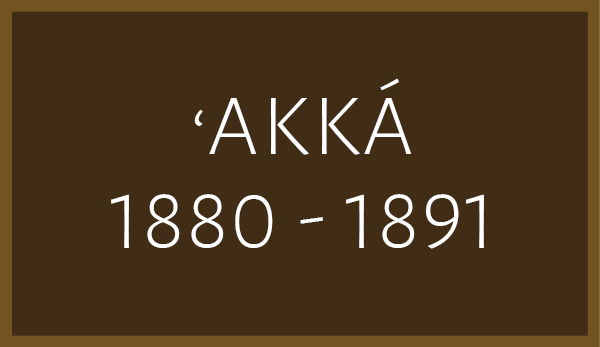
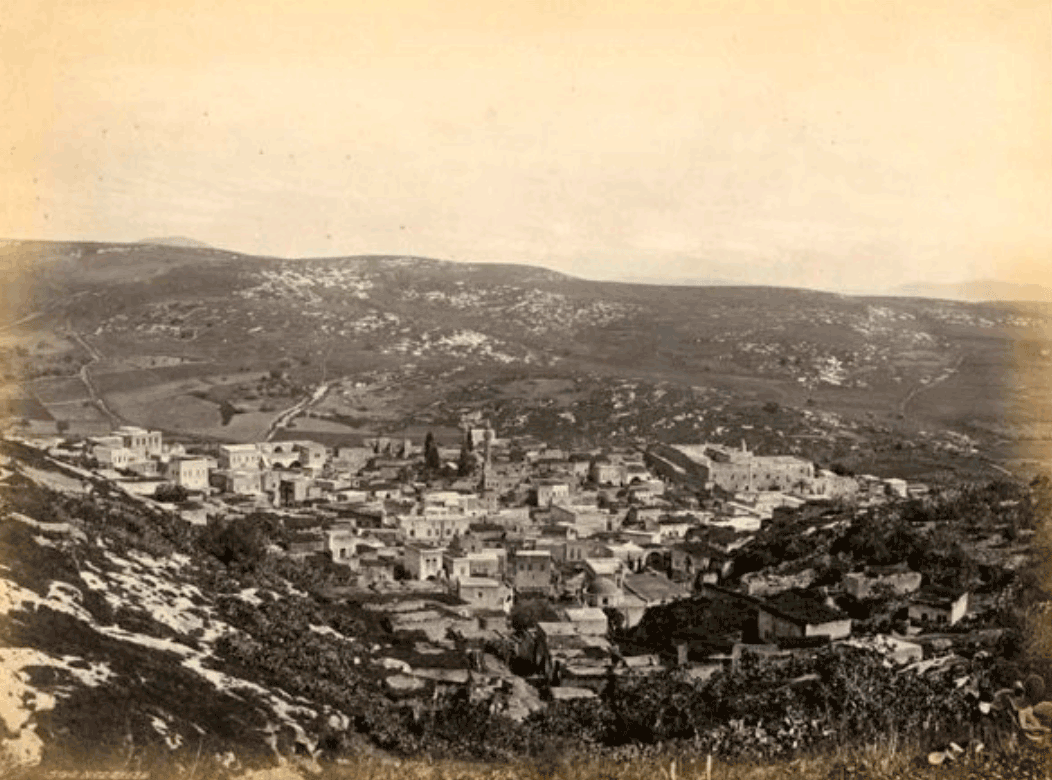
Looking down at Nazareth from the hills above. Circa 1870s Norbert Schiller Collection, Photograph by Frank Mason Good Picture scanned from original 23cm X 28cm albumen print. Photo Orientalist Website.
Sháykh Yúsuf, the Muftí of Nazareth, visits 'Akká at some point in the 1870s, and falls under the spell of 'Abdu'l-Bahá's wonderful charm, knowledge, eloquence and majestic dignity. After leaving 'Akká, he corresponds with 'Abdu'l-Bahá, gives Him a noble horse as a gift and invites Him to Nazareth. When 'Abdu'l-Bahá arrives in Nazareth with His brother and the Muftí of 'Akká, they find that Sháykh Yúsuf has sent all the notables of the Nazareth several kilometers along the road to welcome the visitors, truly a King's welcome for the Master.
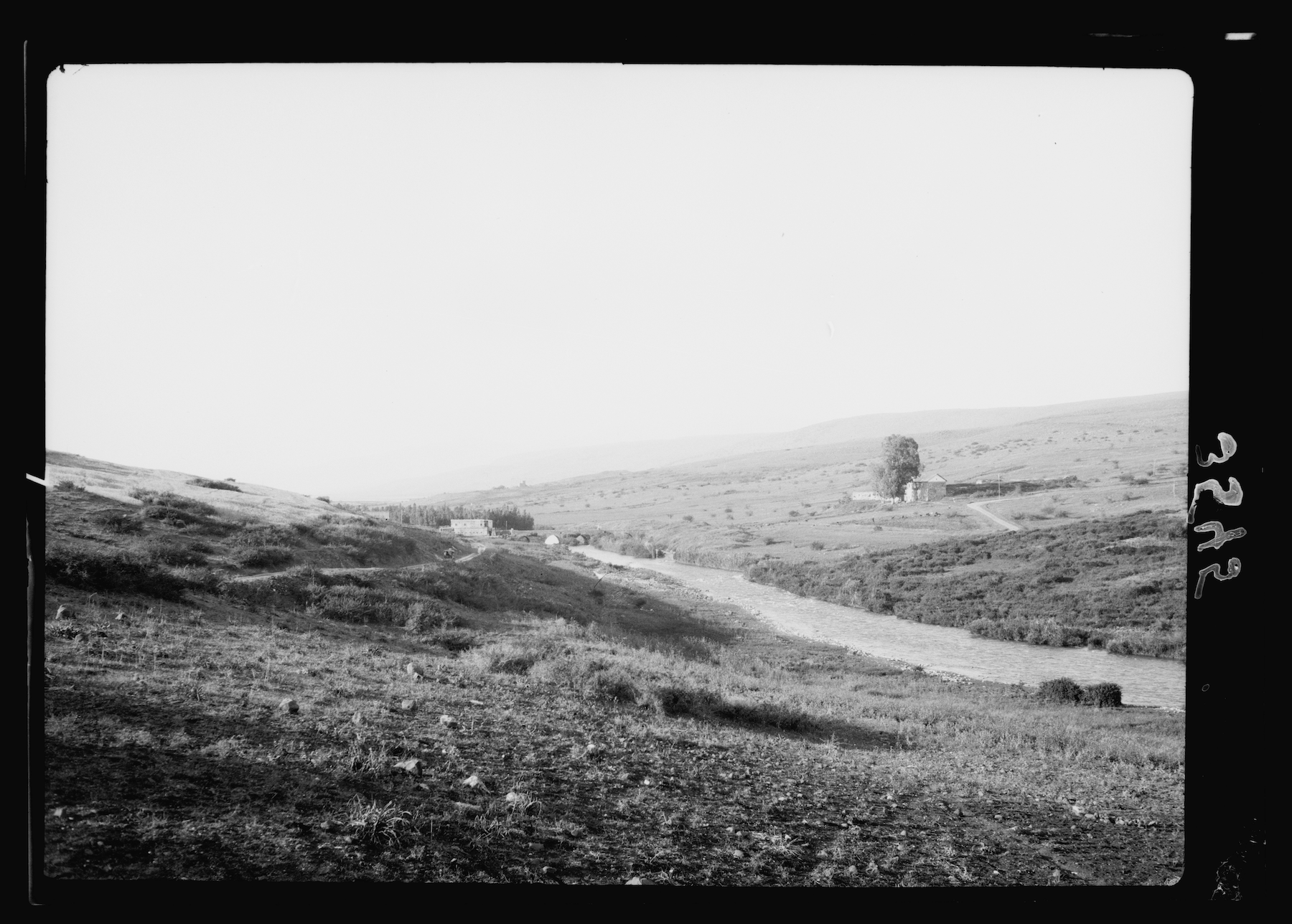
The Jordan Valley north of the Sea of Galilee. Perhaps not exactly where ‘Abdu'l-Bahá purchased land, this photo, taken between 1920 and 1933 gives a clear idea what the lands would have looked like. Library of Congress.
During this period, properties around the Sea of Galilee are purchased at Bahá'u'lláh's bidding, around what is now Ein Gev, and Samras.
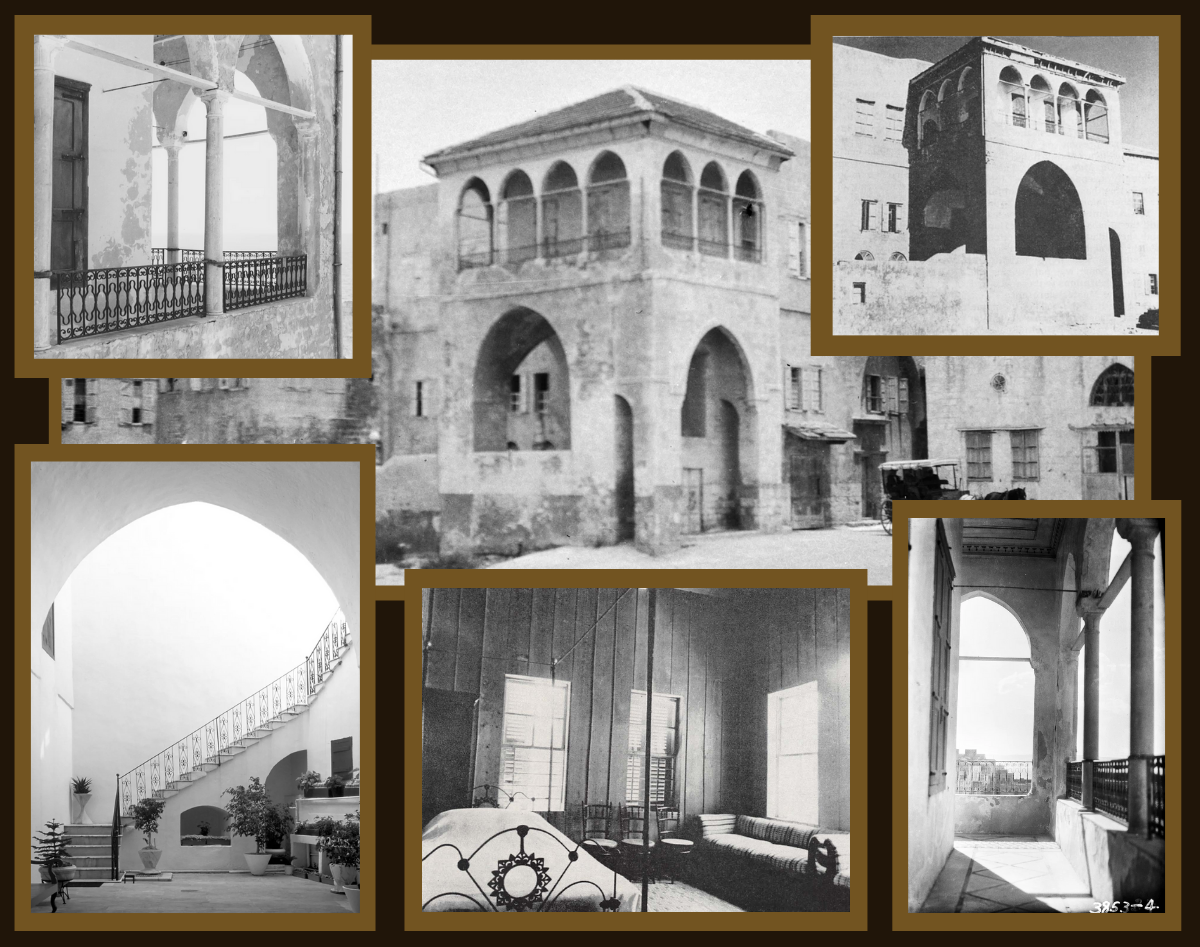
The House of 'Abbud, its balcony, inside courtyard, two outside views and the inside of the room of Bahá'u'lláh from Bahá'í Media Bank, and Baha'i Media.
Muḥammad-Yúsuf Páshá had previously been the Governor of 'Akká at the time when 'Abdu'l-Bahá and Bahá'u'lláh were confined to the barracks. A jealous and greedy man, Muḥammad-Yúsuf Páshá is nonetheless aware of 'Abdu'l-Bahá's vast knowledge. During his first governorship and an argument between Christians and Muslims that could not be resolved, he calls on 'Abdu'l-Bahá who is brought from the barracks and impresses everyone in the way He handles the argument.
When Muḥammad-Yúsuf Páshá returns to 'Akka for a second Governorship, the situation is vastly different. Fifteen years have passed, and 'Abdu'l-Bahá has soared in the esteem of the notables of 'Akka, and Muḥammad-Yúsuf Páshá arrives to a city, in essence, homeless. The Ottoman government has sold the Governor's residence and he is forced to rent a small house close to the larger house of 'Abbúd.
As fate would have it, Muḥammad-Yúsuf Páshá arrives while 'Abdu'l-Bahá is hosting Shaykh Yúsuf, the Muftí of Nazareth who has previously given him a majestic welcome to Nazareth. The Bahá'í neighbors shower Shaykh Yúsuf with hospitality and Muḥammad-Yúsuf Páshá grows jealous. Under the poisonous influence of the Azálís, he begins to make incessant demands of 'Abdu'l-Bahá to vacate the House of 'Abbúd so he can occupy it. He goes so far as to lie that the Váli (Governor of the Administrative Division) requires it. The Governor continues to pester 'Abdu'l-Bahá over the house of 'Abbud for more than a year, even while 'Abdu'l-Bahá's saintly mother, Navváb is desperately ill.
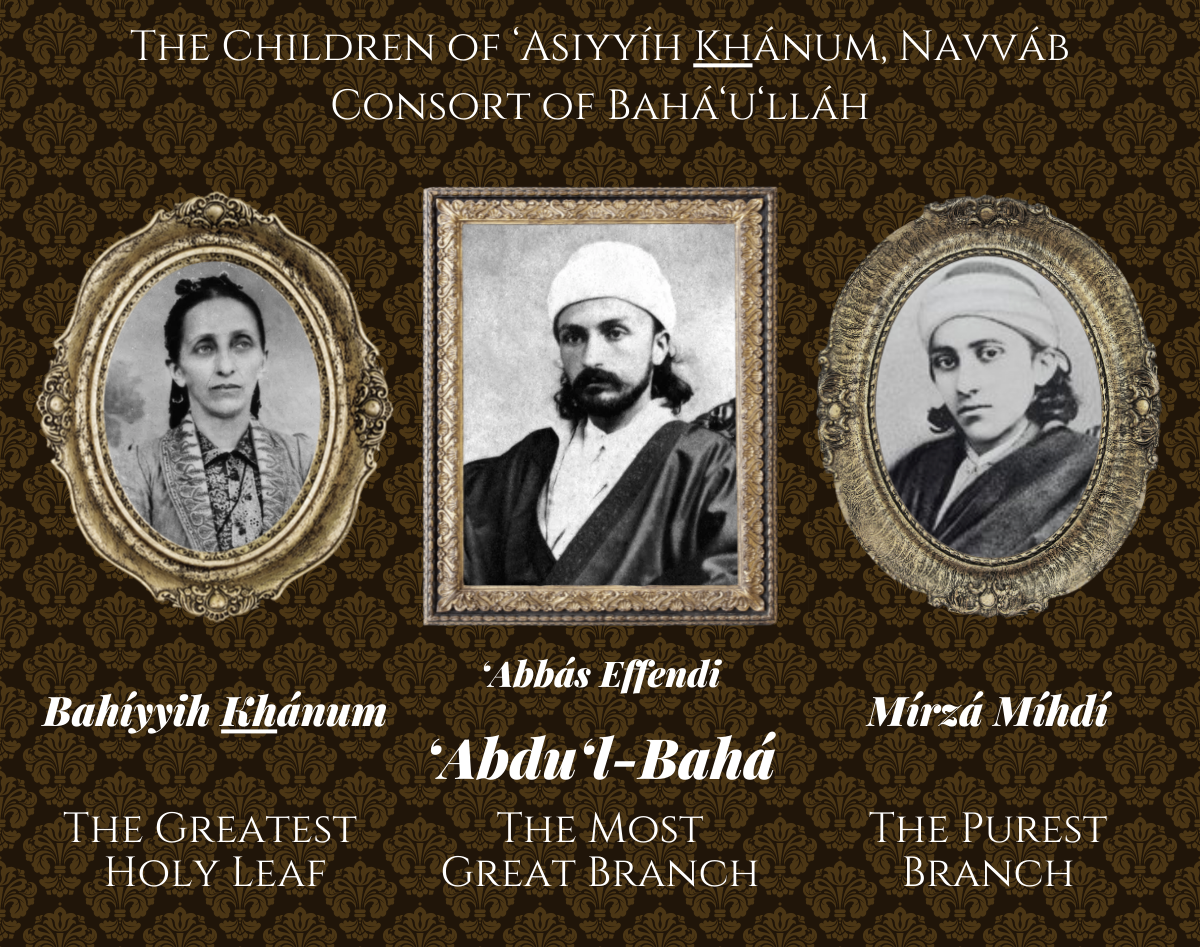
‘Abdu’l-Bahá’s calls His beloved mother, Ḥaḍát-i-Válidih ("Her Highness, the Mother." She was a tall, slender, graceful woman with dark blue eyes. The date of Navváb's birth is unknown, but she has lived a difficult life, exerting herself beyond her endurance during three decades of arduous banishments. Navváb's health declines during the last eight or nine years of her life, and she falls from a height shortly before her passing, according to the unpublished diary of a Bahá'í of 'Akká. When her end is near, Bahá'u'lláh is at her bedside, along with her beloved children, 'Abdu'l-Bahá and Bahíyyih Khánum.
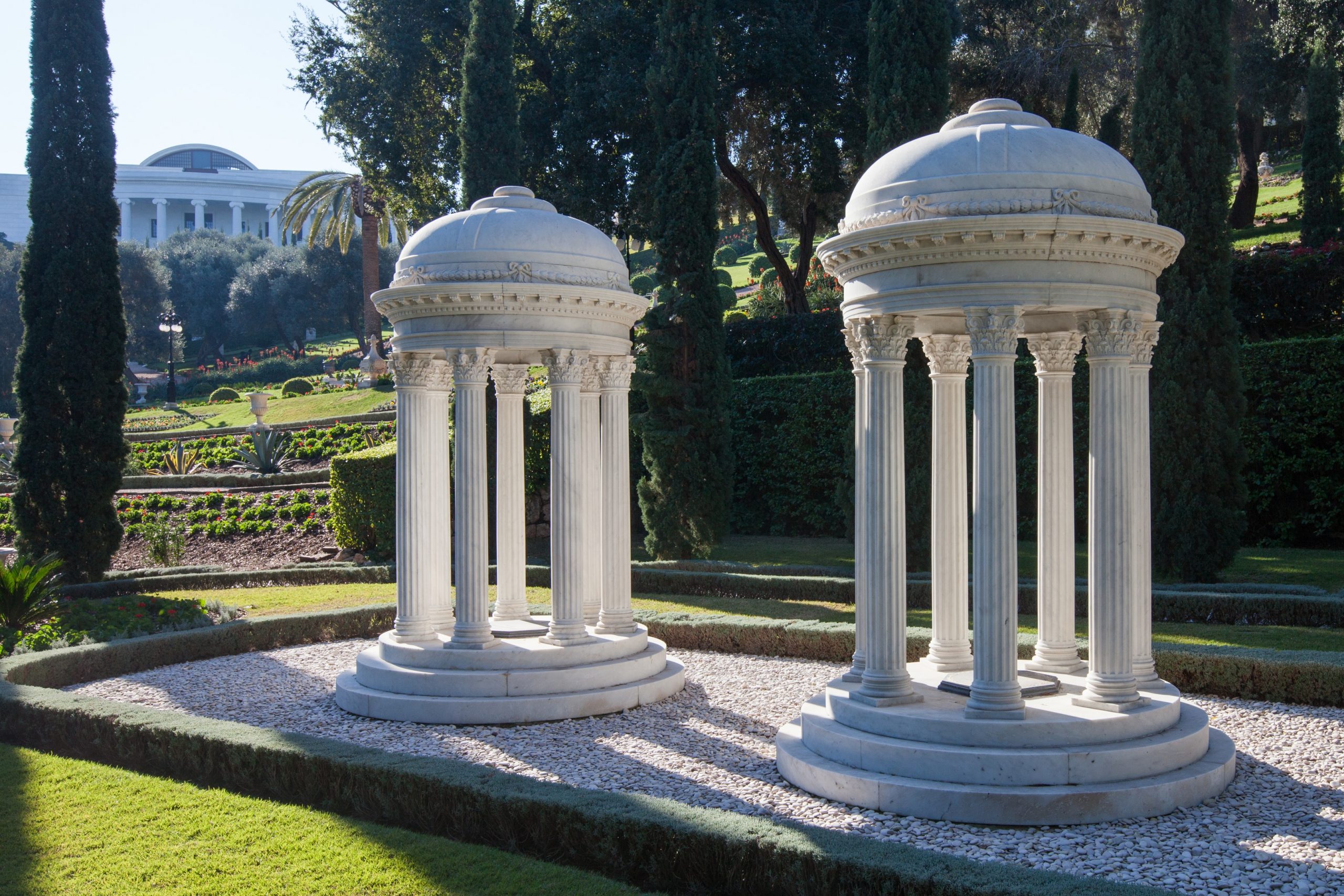
Resting Places of the Purest Branch (Mírzá Mihdí), the son of Bahá’u’lláh, and Navváb (Ásíyih Khánum), the wife of Bahá’u’lláh, in the Monument Gardens. Bahá'í Media Bank.
Unlike the funeral of her beloved son Mírzá Míhdí, 16 years prior, her funeral is held with the dignity due to her high station. The cortege is led by muezzins and reciters of the Qu'rán, notables of 'Akká, Muslim and Christian scholars and learned ones, join the cortege, along with schoolchildren who chant verses and poems expressing their grief. 'Abdu'l-Bahá's sorrow is overwhelming.
Bahá'u'lláh refers to Navváb after her passing as the "Most Exalted Leaf," the "Manifestation of His Cause, and the Day-Spring of His Revelation, and the Dawning Place of His signs, and the Source of His commandments," and "His companion in every one of His worlds."
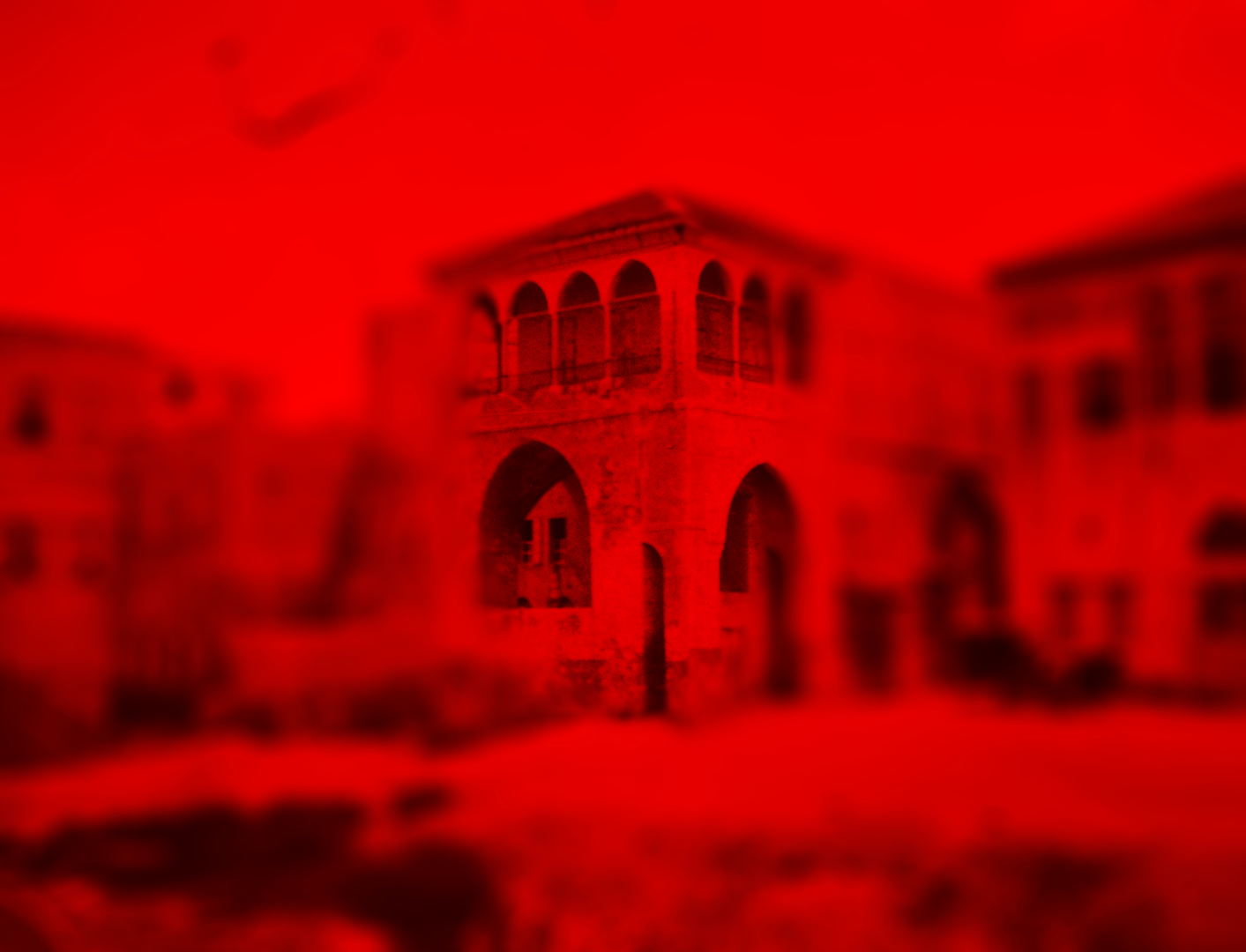
The House of 'Abbúd becomes a source of conflict for the jealous new Governor, Muḥammad-Yúsuf Páshá.
Muḥammad-Yúsuf Páshá's demands and attitude remain aggressive towards a grieving 'Abdu'l-Bahá, even after the passing of Navváb, while 'Abdu'l-Bahá is mourning for His mother. A duplicitous Christian merchant approaches 'Abdu'l-Bahá hinting a gift of money will cause Muḥammad-Yúsuf Páshá to leave 'Abdu'l-Bahá alone. 'Abdu'l-Bahá retires to pray, and when He returns, tells the merchant to go to the Governorate. When the merchant arrives at the Governorate, he finds that a cable has just arrived firing Muḥammad-Yúsuf Páshá and his accomplices for embezzlement. One of Muḥammad-Yúsuf Páshá's accomplices, the head of the secretariat, runs away to Damascus and abandons his family. 'Abdu'l-Bahá provides provides for the family, ensures all their needs are met, then sends them to join him accompanied by two Bahá'ís.
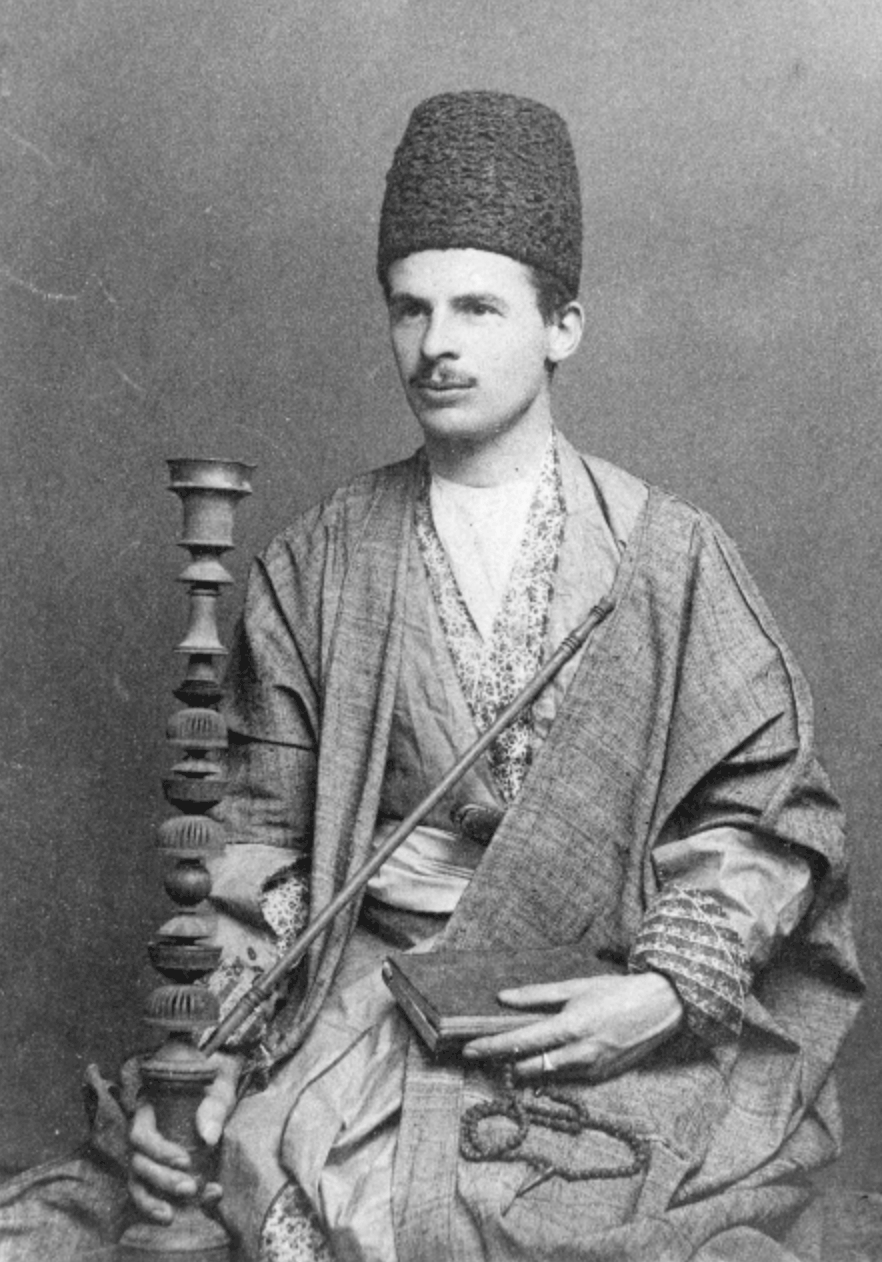
Edward Granville Brown (1862 - 1926), the British Orientalist who met Baha’u’llah. Baha'i Blog.
‘Abdu’l-Bahá writes A Traveler’s Narrative, an account of Bábí history. It is first published anonymously in Persian in 1890. The English translation is prepared by Professor Edward G. Browne and first published by Cambridge University Press in 1891.
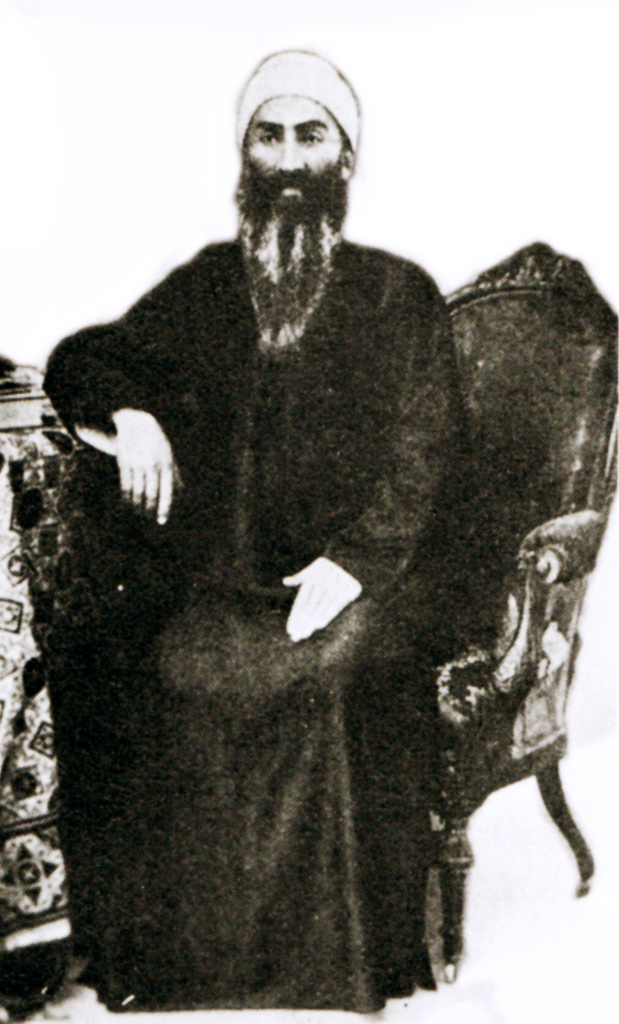
Mírzá Músá, Bahá'u'lláh's faithful brother and 'Abdu'l-Bahá's uncle. Bahá'u'lláh, the Glory of God Website.
One year after the devastating blow to 'Abdu'l-Bahá of Navváb's passing, He loses His beloved uncle Mírzá Músá, Bahá'u'lláh's younger brother. Mírzá Músá, titled Áqáy-i-Kalím ("Him Who conversed with God") has been a constant companion of Bahá'u'lláh since even before the birth of 'Abdu'l-Bahá. Mírzá Músá is with Bahá'u'lláh when He receives the scroll from the Báb (See Part I, "The Story of the Scroll"). He is the one present when Bahá'u'lláh becomes a Bábí, that same evening, upon reading but one passage from the Báb's Tablet. Mírzá Músá is the rock on which Navváb leans when Bahá'u'lláh is in the Siyáh-Chál. He is exiled with them to Baghdád and looks after the family for two years while Bahá'u'lláh is in Kurdistán, then when He is located, Mírzá Músá at the encouragement of a young 'Abdu'l-Bahá sends Bábís to beseech Bahá'u'lláh to return. As 'Abdu'l-Bahá grows into a man, He takes on more and more of the responsibilities Mírzá Músá used to shoulder, but Mírzá Músá is always, still, there, the most loyal and most constant companion of Bahá'u'lláh since their childhood.
It is Mírzá Músá who greets 'Abdu'l-Bahá's future wife Munírih Khánum when she arrives in late 1872. Munírih Khánum stays in Mírzá Músá's house for five months until the wedding. And it is Mírzá Músá who brings her the news of her new name, bestowed by Bahá'u'lláh. In his last years, Mírzá Músá often hosts Bahá'u'lláh during His winter stays in 'Akká, when He resides in Mazra'ih and Bahjí. One of Mírzá Músá's final contributions to the History of the Faith, is the assistance he gives Nabíl with his manuscript "The Dawn Breakers." Nabíl will submit the manuscript to Bahá'u'lláh a year or two after Mírzá Músá passes away and Bahá'u'lláh will approve parts of the manuscript and contribute a number of stories to the work. Twenty years after his passing, 'Abdu'l-Bahá will mention Mírzá Músá many times to Yunis Khán Afroukhteh, on the subject of medicine, saying that Mírzá Músá was very knowledgeable in herbal medicine and used to practise it. Shoghi Effendi will name Mírzá Músá an apostle of Bahá'u'lláh in a discrete graphic announcement he posts in the Bahá'í World Volume III, (1928-1930) page 92 under the heading "The Apostles of Bahá'u'lláh: Pillars of the Faith." The first name is Mírzá Músá's and Shoghi Effendi's description states, eloquently: "Mírzá Músá: The only true brother of Bahá'u'lláh, surnamed "Kalím""
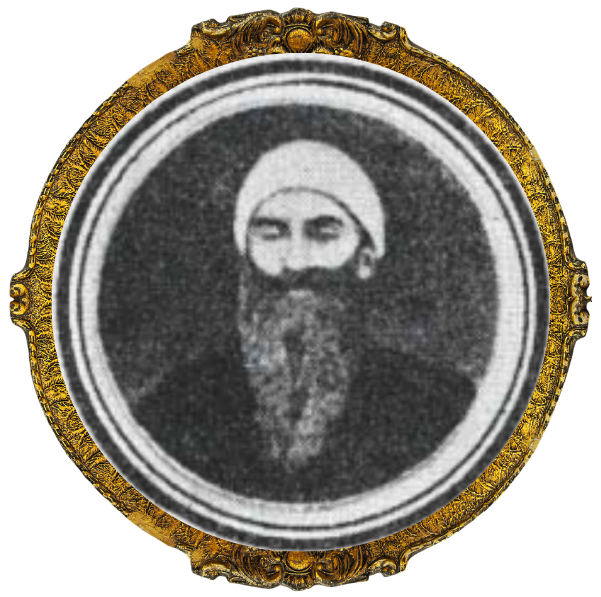
Portrait of Mírzá Músá, detail from Bahá'í World, Volume III photo-montage by Shoghi Effendi of the Apostles of Bahá'u'lláh. Mírzá Músá is the first Apostle listed
On one of His visits to 'Akká, Bahá'u'lláh stays in the home of Mírzá Músá for eight days and nine nights. Each day and night during this stay, Bahá'u'lláh permits all the believers to come into His presence, and they sit, spellbound by His utterances and the outpouring of His favor. Bahá'u'lláh prays that their hearts become illumined, their souls sanctified from all attachments save Him, and their steps are made firm so that they may remain steadfast and arise to serve His Cause.
He also showers infinite blessings and bestowals on Mírzá Músá, the brother who has served His Lord with the utmost devotion and love throughout His ministry and in this last exile to 'Akká.
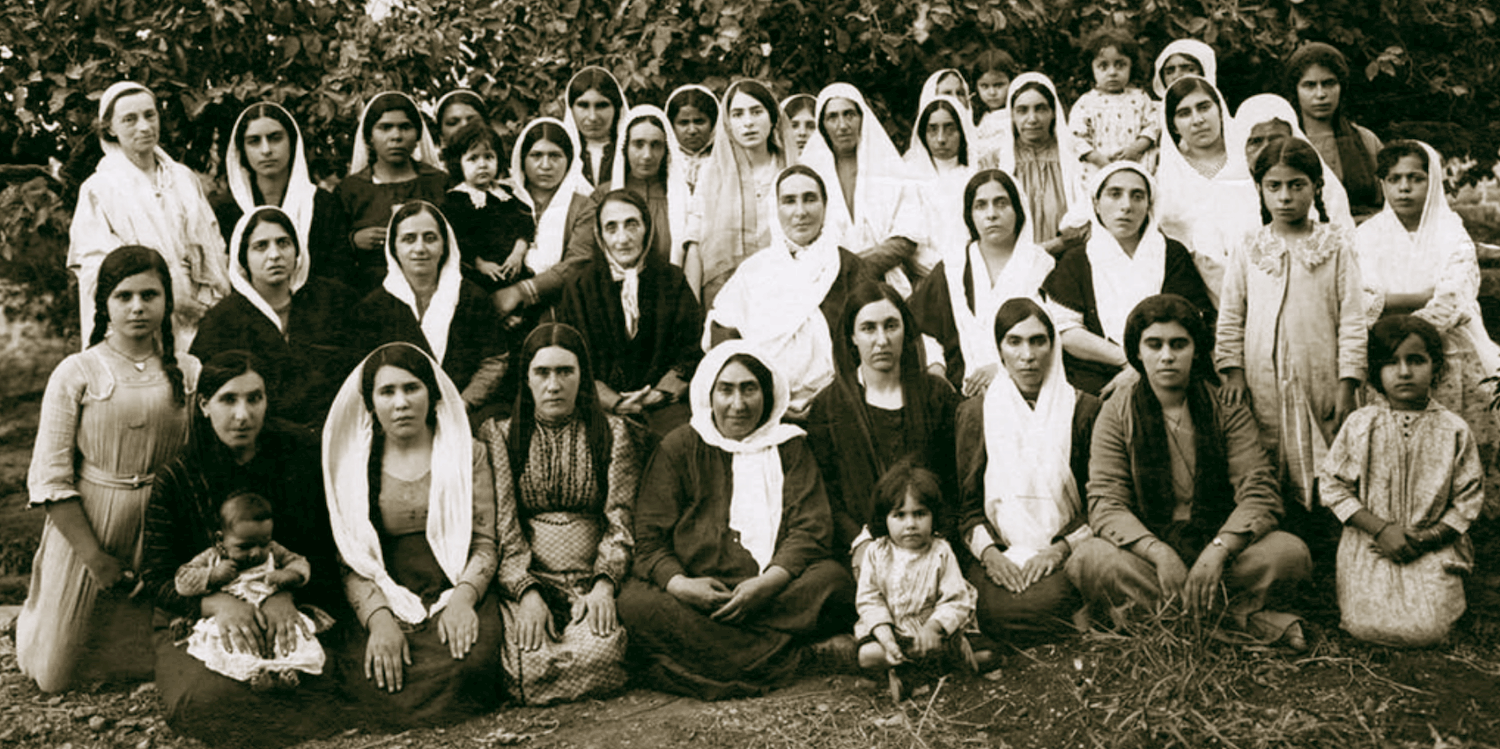
Bahá'u'lláh’s four granddaughters are seated, with white headscarves, on either side of Bahíyyih Khánum and Munírih Khánum in the center. From the left, His first two granddaughters are Munavvar Khánum and Ṭúbá Khánum, and from the extreme right, Ḍíyá‘íyyih Khánum (‘Abdu'l-Bahá and Munírih Khánum's eldest, Shoghi Effendi’s mother), with Rúḥá Khánum sitting to her right. Source: Daily Baha'i Photos Website.
'Abdu'l-Bahá's children are close to their grandfather and look upon Him as another loving father. When Bahá'u'lláh is in 'Akká, the children have early morning tea with Bahá'u'lláh who chants prayers and tells the children stories about Jesus Christ, the Virgin Mary, the Prophet Muḥammad, Moses, and other Prophets. After their morning tea, the children are taken to the Khán-i-Avámid for a rather dull day from 7 in the morning to 5 in the afternoon of listening to Quránic recitation, some reading and writing, only interrupted by a bland lunch.
'Abdu'l-Bahá's children love Bahá'u'lláh and take all their little problems to Him, and Bahá'u'lláh, in turn, takes a keen interest in everything that concerns the children. Bahá'u'lláh sends a servant to Beirut every year to buy cotton fabric for their new clothes, then calls the children in to pick their favorite fabrics. Munírih Khánum, Bahíyyih Khánum and the children then cut the fabric and sew them into clothes.
Every holiday, the children's treats come from Bahá'u'lláh. Whenever He is given boxes of sweets, He sets some aside for the children, saying, in jest, of course, "Put that box of sweets over there, or Áqá ['Abdu'l-Bahá] will give it away to the people." When the children are being sent off to bed, Bahá'u'lláh often calls for His grandchildren, saying "Let the dear children come in, and have some dessert" 'Abdu'l-Bahá and Munírih Khánum do not want the children to disturb Bahá'u'lláh but He always welcomes His grandchildren with loving words and the children adore Him.
On the nights that Bahá'u'lláh tells the children "Now children, tomorrow you shall come with Me for a picnic to the Ridvan," the children are so overcome with joy they can barely sleep. 'Abdu'l-Bahá is rarely able to join in these wonderful family picnics because, as Ṭúbá Khánum says, "so much did the people take up all His days."
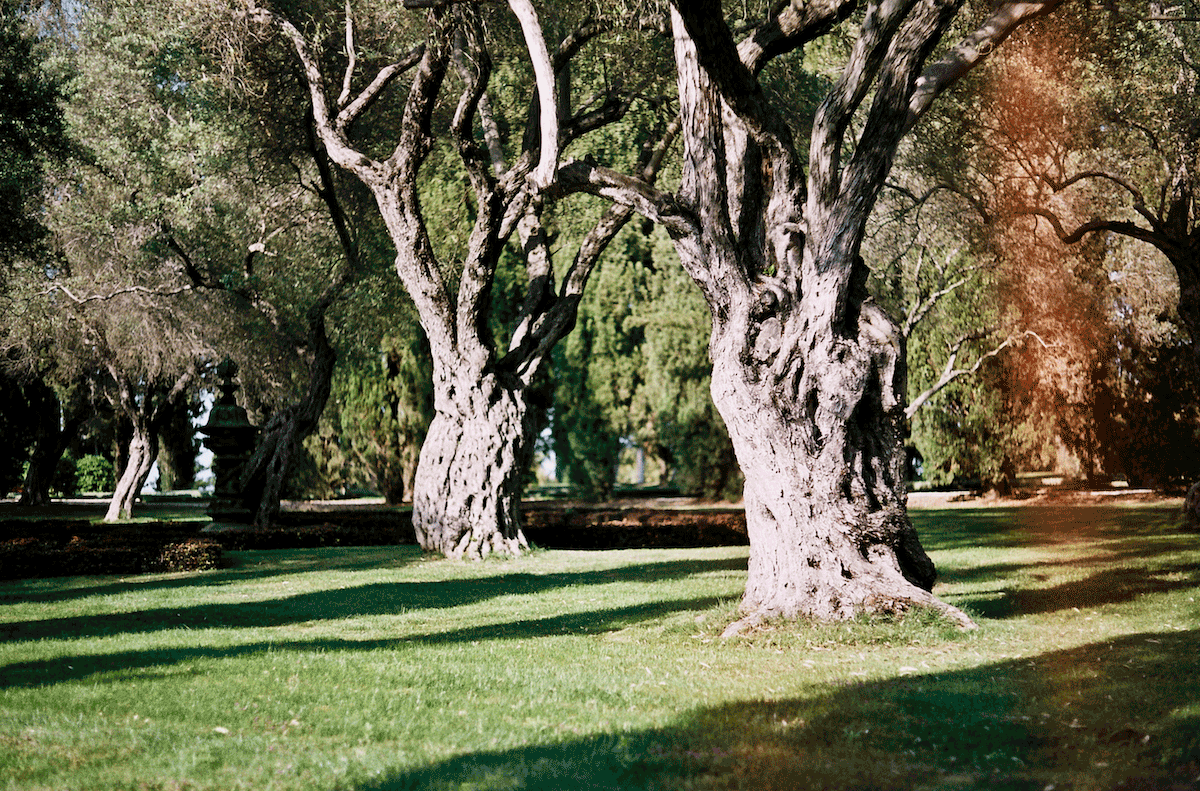
In honor of four-year-old Ḥusayn’s Effendi love of sightseeing, the tamáshá he endearingly pronounced tabashá, and his many adventures with his beloved grandfather Bahá'u'lláh in the Mansion of Bahjí, a wild grassy corner of the gardens near the Mansion with stately centuries-old olive trees. © Chad Mauger, all rights reserved, used with permission. Source: Flickr.
When ‘Abdu’l-Bahá is 40 years old and Bahá’u’lláh is living in Bahjí, His fourth child, Ḥusayn Effendi is born. By all accounts, Ḥusayn Effendi is a very special child and very much loved by all. He is the delight of his Grandfather and spends long intervals at Bahjí. An eager, vivacious child, Ḥusayn Effendi delights in new experiences and small adventures and entreats his beloved Grandfather to take him on little walks to see new sights. Bahá’u’llá’s love and attachment to His grandson is clear in the Tablets He reveals for Ḥusayn Effendi during his life and after His passing. Close to thirty years after his birth, while in Europe, ‘Abdu’l-Bahá will fondly remember how wonderful it was when Ḥusayn Effendi used to slip into bed with Him while He was sleeping.
In one of His Tablets, Bahá'u'lláh calls the child “His Highness Ḥusayn Effendi.” We learn that Ḥusayn Effendi could not properly pronounce the Persian word for sightseeing, 'tamáshá' instead saying 'tabáshá,' a word that doesn't exist in Persian. When Ḥusayn Effendi passes away at the age of four in 1888, 'Abdu'l-Bahá and especially Munírih-Khánum are grief-stricken. Bahá'u'lláh, who Himself lost a beloved son 18 years ago, writes Munírih Khánum a very moving letter, using both Ḥusayn Effendi's word for sightseeing, 'tabáshá,' and the correct Persian word for it, 'tamáshá,'):
...But this son was and continues to be the adornment of the highest Heaven. At this very moment, through God's bounty and divine mercy, We behold Our 'tabáshá' engaged in 'tamáshá' in the highest paradise...
Provisional translation of a Tablet from Bahá'u'lláh found in Baharieh Maani’s Leaves of the Twin Divine Lote Tree
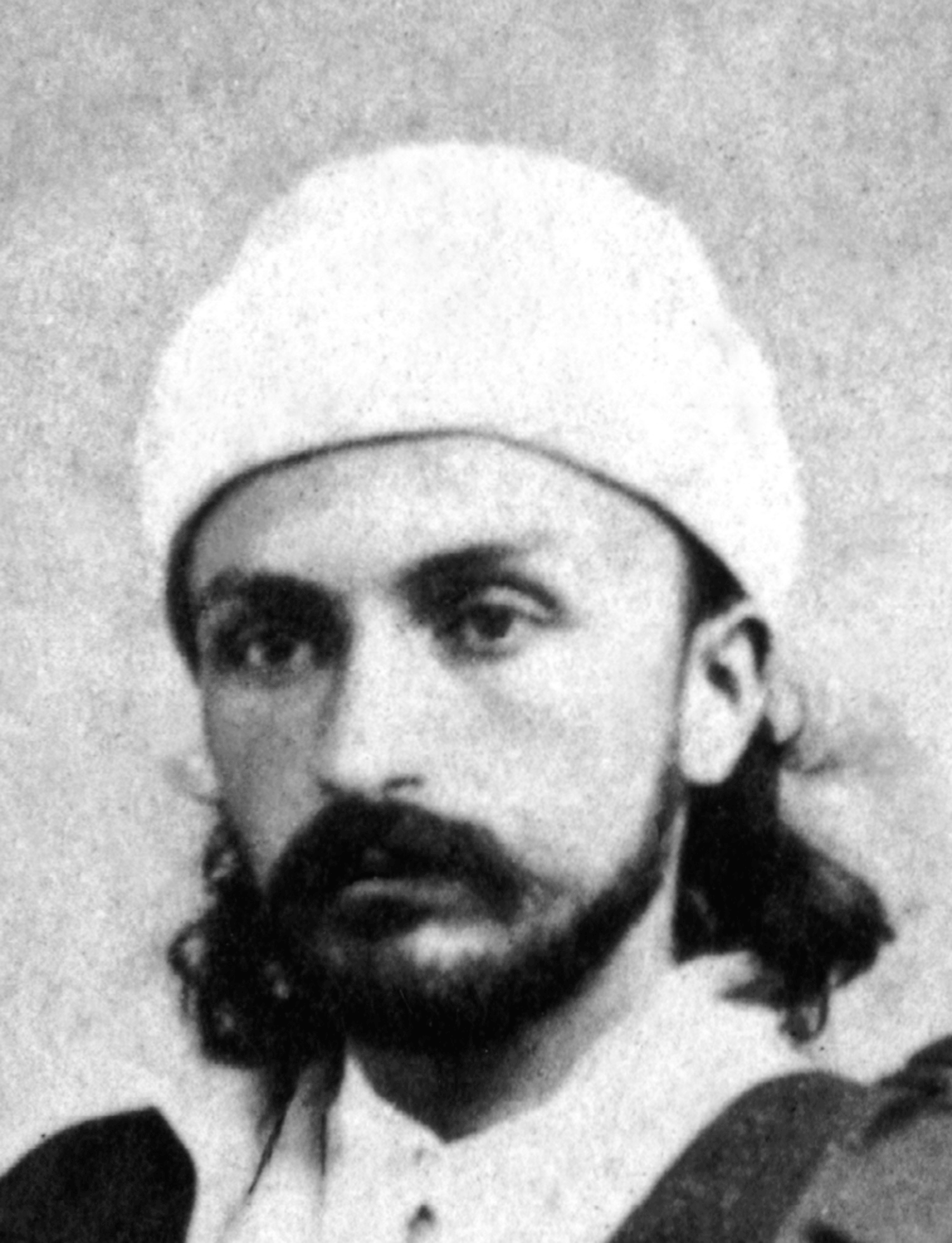
Portrait of ‘Abdu’l-Bahá in Edirne, c. 1868, Bahá'í Media Bank, © 2023 Bahá'í International Community.
We have no photographs of 'Abdu'l-Bahá in middle age, and so eloquent pen-portraits of Him are extremely precious to us. Edward Granville Browne leaves us one such gem in the portrait he writes of 'Abdu'l-Bahá, at this time of great influence, greatness and power in His life, exactly ten years after 'Abdu'l-Bahá's visit to Beirut:
Seldom have I seen one whose appearance impressed me more. A tall strongly-built man holding himself straight as an arrow, with white turban and raiment, long black locks reaching almost to the shoulder, broad powerful forehead indicating a strong intellect combined with an unswerving will, eyes keen as a hawk’s, and strongly-marked but pleasing features–such was my first impression of ‘Abbas Effendi, “the master” as he par excellence is called.
… One more eloquent of speech, more ready of argument, more apt of illustration, more intimately acquainted with the sacred books of the Jews, the Christians, the Muhammadans, could, I should think, scarcely be found even amongst the eloquent, ready, and subtle race to which he belongs. These qualities, combined with a bearing at once majestic and genial, made me cease to wonder at the influence and esteem which he enjoyed even beyond the circle of his father’s followers.
About the greatness of this man and his power no one who had seen him could entertain a doubt.
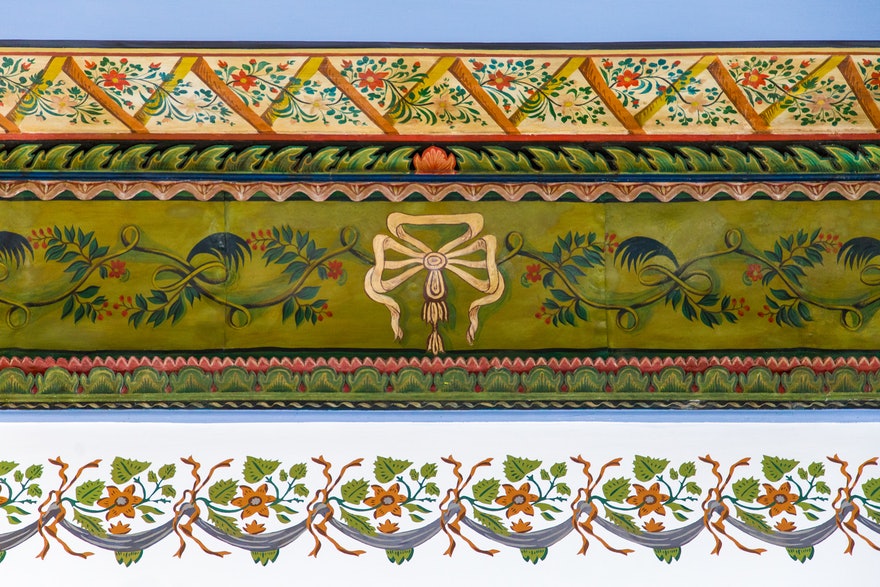
Detail from the restored frieze in the House of ‘Abbúd, in honor of the Holy Family’s continued occupancy of the house, following the downfall of Muḥammad-Yúsuf Páshá. Source: Bahá'í World News Service © Bahá'í International Community.
Aḥmad Páshá succeeds the evil Muḥammad-Yúsuf Páshá as Governor of 'Akká. He comes with instructions to show respect and consideration towards Bahá'u'lláh. He governs 'Akká well during his tenure and often spends his time in the company of 'Abdu'l-Bahá. While he is Governor, the Válí (Regional Governor) of Beirut comes by boat to Haifa and 'Abdu'l-Bahá accompanies the officials to welcome him there. The Válí makes a point of asking 'Abdu'l-Bahá to offer Bahá'u'lláh his respects and begs for His blessings. He also presents a melon (a rare and expensive gift at the time in Palestine) as a gift to Bahá'u'lláh through an official.
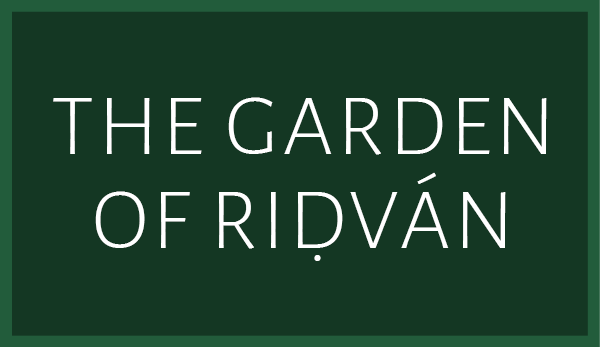
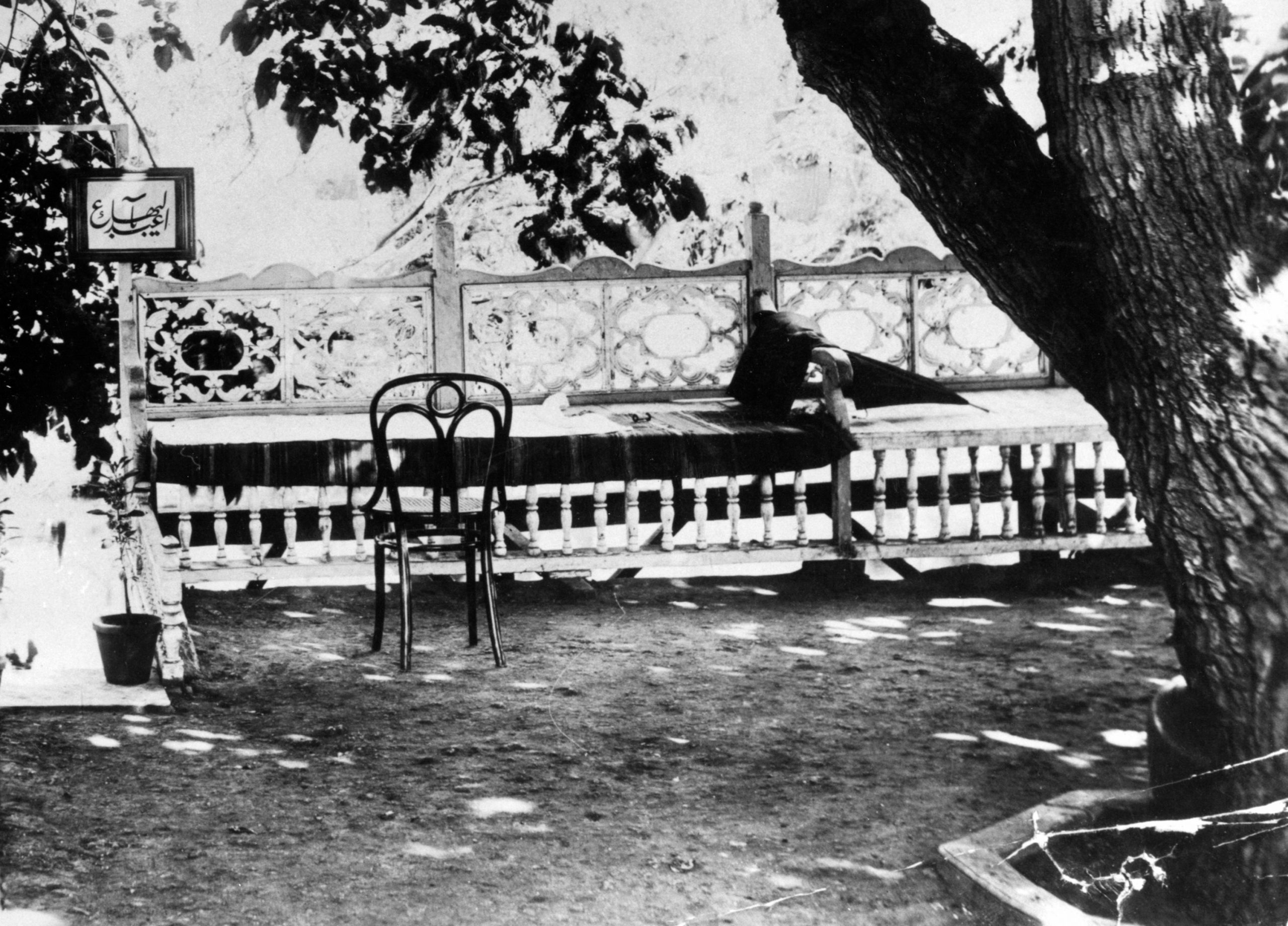
Bench at Riḍván Garden, early 1900s. Bahá'í Media Bank.
The garden of Na‘mayn is a small island, in the middle of a river to the east of 'Akká. Bahá'u'lláh names the garden Riḍván after the Riḍván Garden of Baghdád and calls it "Our Verdant Isle" and the "New Jerusalem." 'Abdu'l-Bahá rents the Riḍván Garden in 1875 and carefully prepares it for Bahá'u'lláh's arrival.
The garden of Riḍván becomes one of Bahá'u'lláh's favorite retreats and resting places. There is a large, beautiful, shady mulberry tree with benches wrapped around it, underneath which Bahá'u'lláh loves to sit.
'Abdu'l-Bahá, through hard work and devotion has succeeded in making a heavenly garden bloom out of the desert. There are fruit trees of all kinds, a luxuriance of countless flowers and sweet-smelling herbs. Riḍván is a true delight to the senses, glorious blazes of colors, the scent of roses, rosemary, bergamot, mint, thyme, lemon, and musk. Pomegranate trees boast large, brilliant scarlet blossoms. Most of the flowering plants are brought from Persia by pilgrims who complete an arduous journey on foot, brave many dangers, fatigue and bad weather, yet shield that cherished plant for Bahá'u'lláh's garden at all costs, often saving the only water they have to keep it alive.
Some of Bahá'u'lláh's former gardeners in Mázindarán, even send over a variety of rose that is a favorite of Bahá'u'lláh's. The rose is white with a golden center, brownish stalks, shiny leaves and a particularly wonderful scent. Ṭúbá Khánum, one 'Abdu'l-Bahá's daughters, remembers many bushes of this wonderful varietal during Bahá'u'lláh's time, and that their golden-like blossoms and burnished leaves added a peaceful note to the garden.
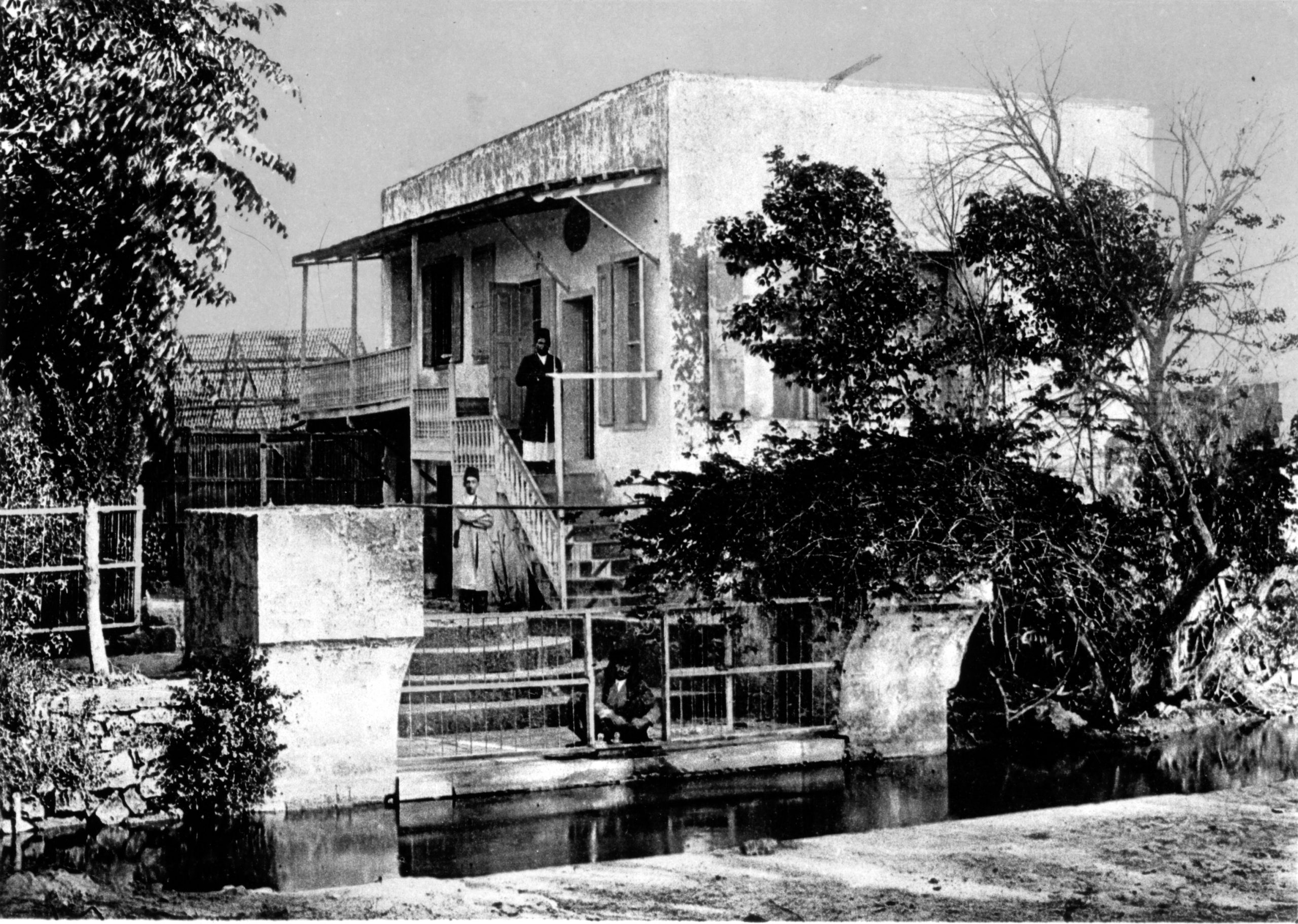
House of Bahá’u’lláh in the Riḍván Garden, early 1900s. Bahá'í Media Bank.
The garden of Riḍván is not just a place of rest and relaxation for Bahá'u'lláh but it is also a place of Revelation, as seen here in the Tablet of Ṭarázát (Effulgences), in the fourth Ṭaráz, where the Riḍván Garden is mentioned:
One day of days We repaired unto Our Green Island. Upon Our arrival, We beheld its streams flowing, and its trees luxuriant, and the sunlight playing in their midst.
Bahá'u'lláh - Ṭarázát (Ornaments)
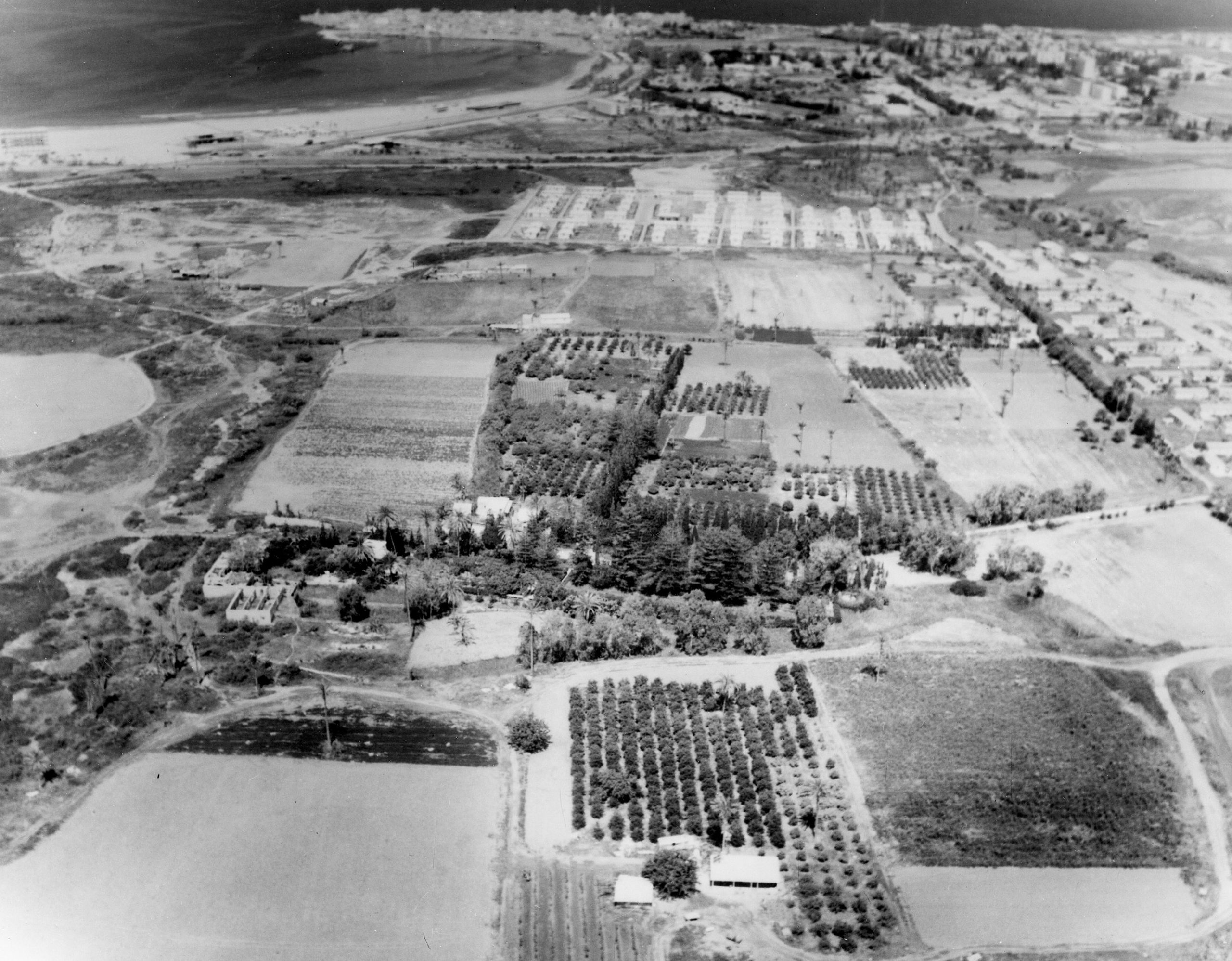
Aerial view of Riḍván Garden, May 1967. Bahá'í Media Bank.
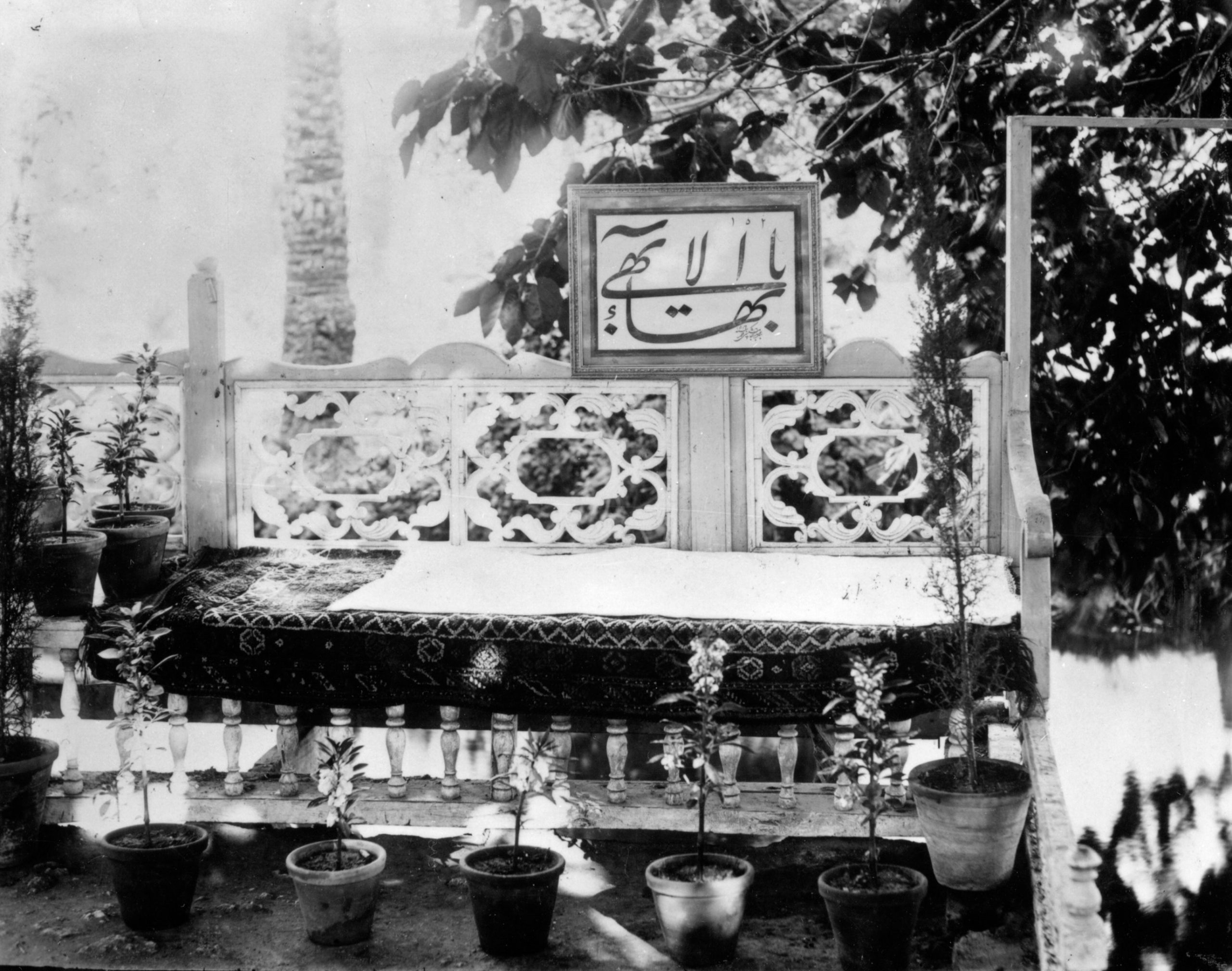
Bench at Riḍván Garden, early 1900s, less than a decade after Bahá'u'lláh visited it. Bahá'í Media Bank.
Ṭúbá Khánum remembers her father's joy at seeing His own Father happy. 'Abdu'l-Bahá's heart is gladdened to see Bahá'u'llá's enjoyment of Riḍván, resting under the vast mulberry tree, on the bank of the little river with the splashing sounds of the fountain nearby. This vignette from 'Abdu'l-Bahá's daughter is incredibly precious, because 'Abdu'l-Bahá was not often present with Bahá'u'lláh at Riḍván, so occupied was he in 'Akká with the weight of so many responsibilities, and the needs of so many people, Bahá'ís and people of 'Akká, resting on His shoulders.
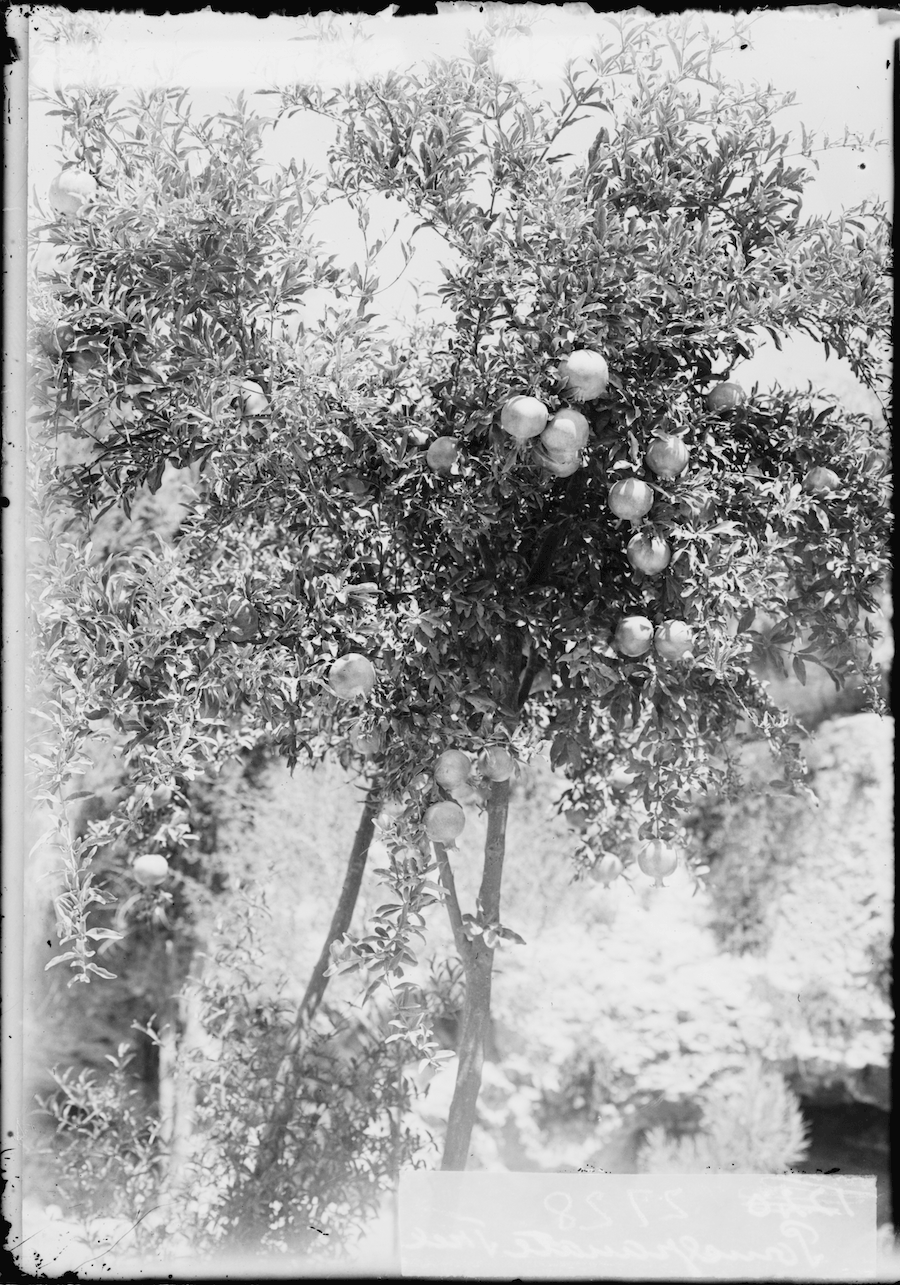
A pomegranate tree in fruit, Jerusalem, Palestine, circa 1900-1920. American Colony (Jerusalem). Photo Department. Library of Congress.
This wonderful story is beautifully told by Dr Yúnis Khán, who spent nine years in 'Akká with 'Abdu'l-Bahá from 1900-1909:
One of the remedial means which was at 'Abdu'l-Bahá's disposal and which He offered to many a sick person, was a delicious sauce made from pomegranates. The fruit had been grown in the Garden of Riḍván in 'Akká. To whomsoever 'Abdu'l-Bahá gave this sauce, whether a believer or a non-Bahá'í, He would say that the pomegranates had grown on trees in the Garden of Riḍván, trees which had been blessed by Bahá'u'lláh's eyes.
But what were the circumstances which produced healing? Was it an inherent nature of the patient to be cured, was the cure the result of taking the sauce, or was it purely through the will of 'Abdu'l-Bahá? I do not know the answer, but one thing I know that it was proved time and time again that this delicious fruit sauce was the remedy for many an illness! This was one of the topics often discussed among the believers in the Pilgrim House.
Taherzadeh, Adib. The Revelation of Bahá’u’lláh, Volume 3 (‘Akká, the Early Years, 1868–1877), page 362
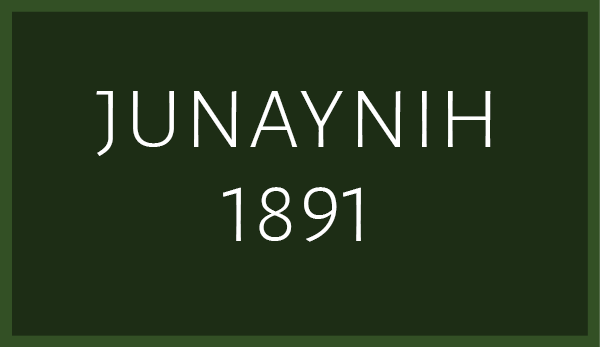
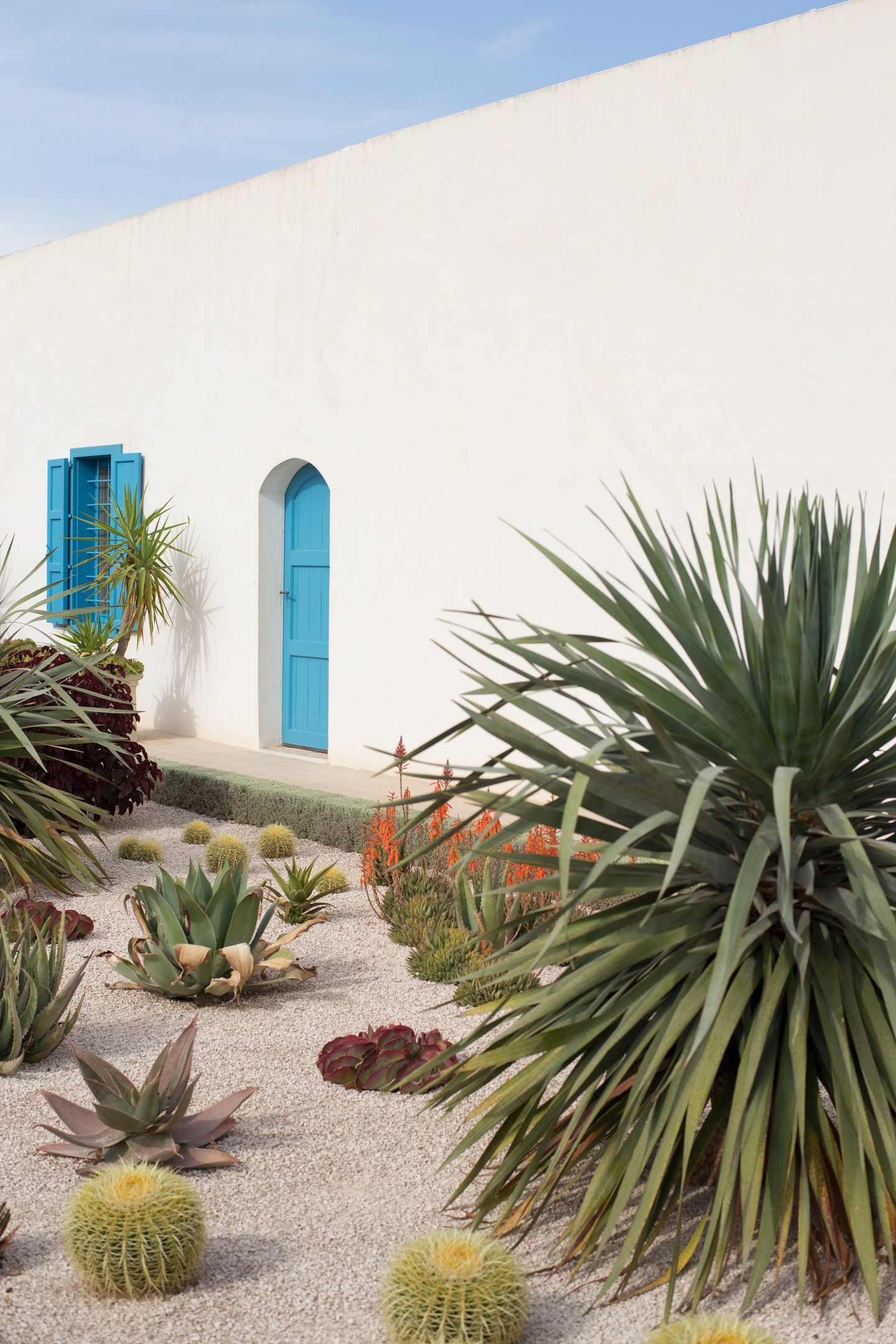
A modern view (detail) of the Junayn Garden today. Bahá'í Media Bank.
Several Bahá'ís acquire a property north-west of Mazra'ih near the city of Nahariyya. In 1890, Edward Granville Browne mentions seeing Bahá'u'lláh in this garden, which He loves and often visits.
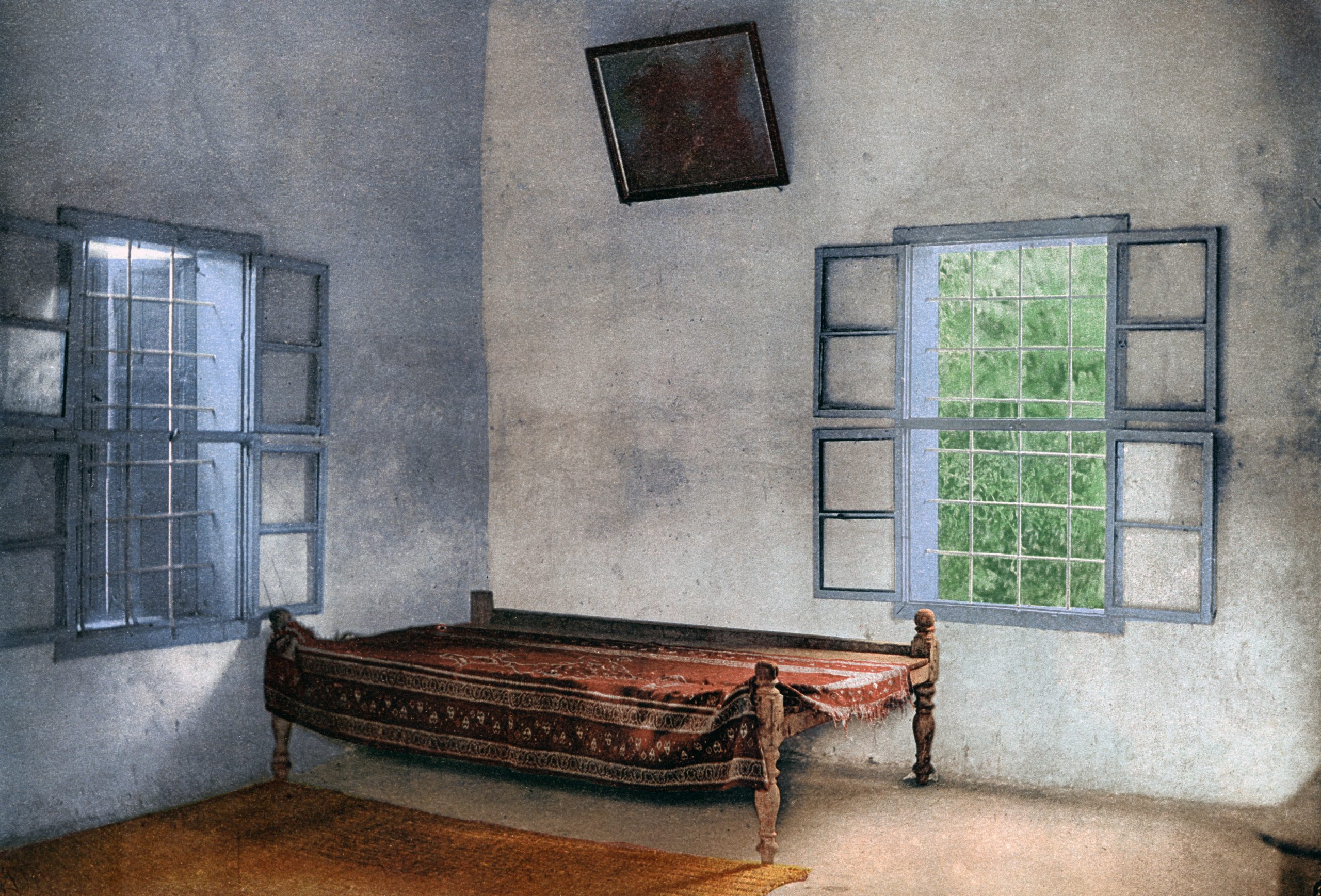
Room of Bahá’u’lláh at Junayn Garden, c. 1920. Bahá'í Media Bank.
Ḥájí Mírzá Ḥabíbu'lláh is on pilgrimage during the last year of Bahá'u'lláh's life. One evening, in Bahjí, it is announced that Bahá'u'lláh will be visiting Junaynih the next day and has asked for all the pilgrims and residents to be present. Ḥájí and his companions, thrilled at the idea of spending a whole day with Bahá'u'lláh, do not sleep. The next day, before sunrise, everyone gathers around the gates of the Mansion of Bahjí, joined by Bahá'u'lláh an hour later. His white donkey is brought. It is a beautiful morning, and they proceed to Junaynih, about five kilometers away, in the fresh, invigorating air. The Garden has been readied for Bahá'u'lláh's arrival, and one of the tall believers holds an umbrella over Bahá'u'lláh's head to protect Him from the sun. They reach the garden, where they have lunch.
Countless pilgrim notes attest to Bahá'u'lláh's knowing when 'Abdu'l-Bahá was approaching and telling the believers "'Áqá [the Master] is coming; hasten to attend Him," which Bahá'u'lláh says again, on this occasion. 'Abdu'l-Bahá arrives from 'Akká after lunch, attended by the believers, and enters Bahá'u'lláh's presence with great humility. Ḥájí Mírzá Ḥabíbu'lláh remembers Bahá'u'lláh greeting 'Abdu'l-Bahá with these words:
The garden was not pleasant enough this morning, but now with the arrival of ‘Áqá, it has become most pleasant. It would have been so good, if you had come this morning.
Abdu'l-Bahá replies:
The Mutaṣarrif [Governor] and a number of others had sent word that they were coming. I had to receive them and offer them hospitality.
Bahá'u'lláh smiles and says:
‘Áqá is Our shield and the shield of everyone else; all live at ease, all know utmost comfort and tranquility. Consorting with men such as these is very, very difficult, It is ‘Áqá who stands up to everything and supplies the means for the well-being and peace of all. May God preserve Him from the evil of all the envious and the inimical.
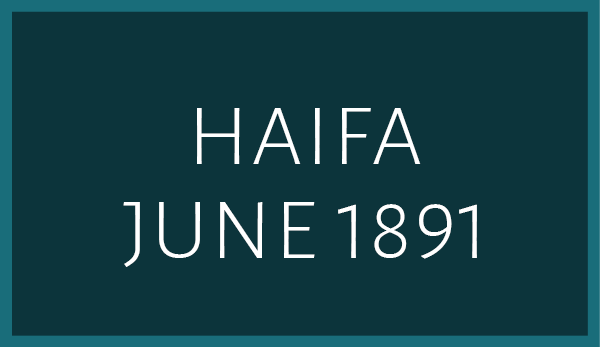
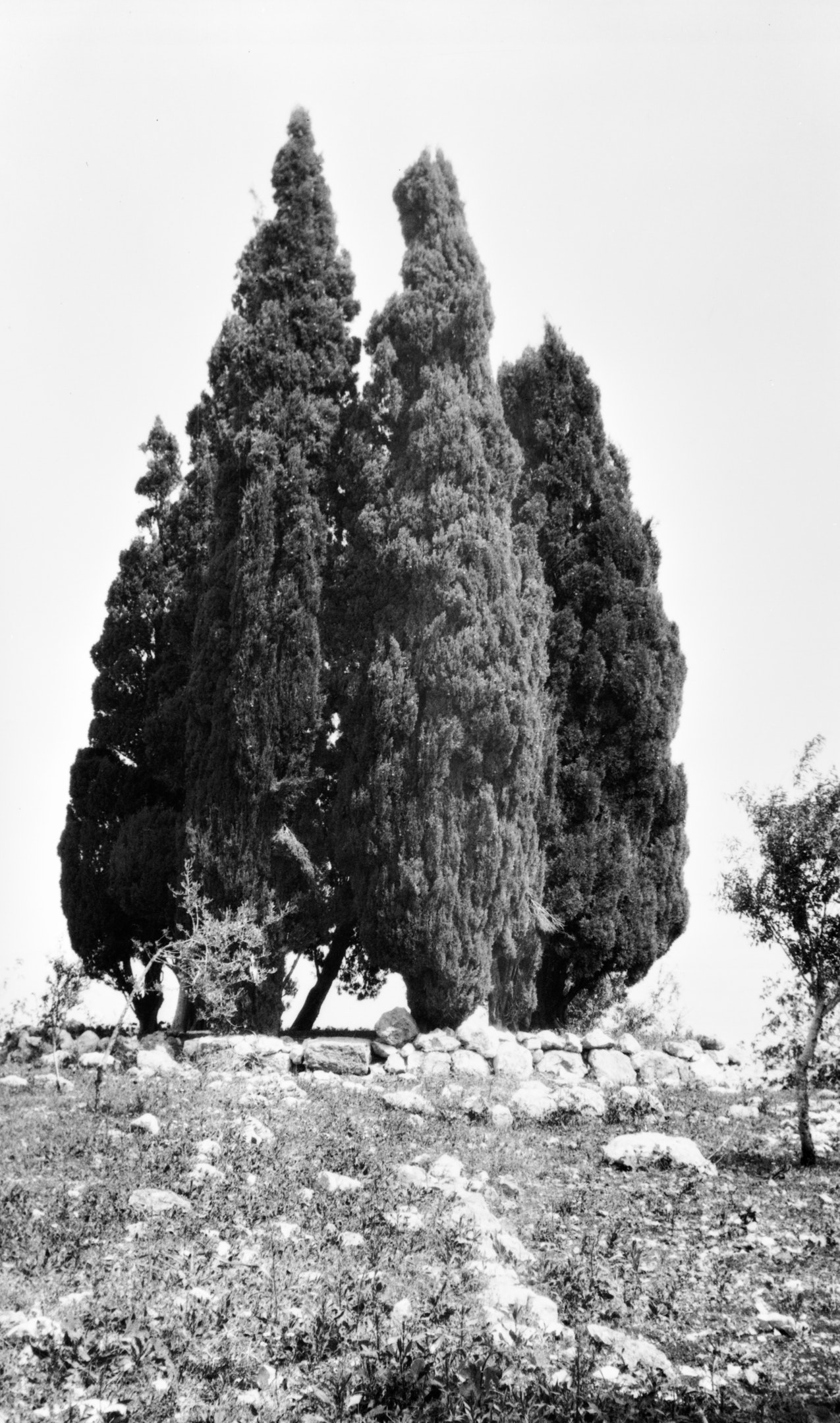
This is the spot where Bahá’u’lláh indicates to ‘Abdu’l-Bahá where the Shrine of the Báb is to be built, in the early 1900s, so less than ten years after the actual event. Bahá'í Media Bank.
Bahá'u'lláh, now 73 years old, arrives for His fourth and last visit to Haifa on 27 June 1891. Bahá'u'lláh remains three months in Haifa, at times pitching His tent on Mount Carmel and even receiving pilgrims. One day at the end of June 1891, 'Abdu'l-Bahá, now 47, and His Father, climb Mount Carmel to a point on the mountain where they find a grove of 15 young cypress trees have been planted in a circle by a German Templer, about five years prior.
This spot on Mount Carmel, with its fresh air and beautiful view, is one of Bahá'u'lláh's favorite places. It reminds Bahá'u'lláh of Murgh-Maḥallih, the "Abode of the Birds," a mountain retreat outside Ṭihrán, in Shimírán. He has come to this spot on previous visits to Haifa and often praises its beauty and cleanliness.
On this warm day, Bahá’u’lláh and 'Abdu'l-Bahá sit on chairs at the center of the grove of young saplings. Bahá'u'lláh issues instructions to 'Abdu'l-Bahá to bring the remains of the Báb from their place of concealment in Ṭihrán to the Holy Land. Bahá'u'lláh then stands and points to a rocky expanse further down Mount Carmel, and directs 'Abdu'l-Bahá to purchase it and to build a Shrine in that spot to lay the sacred remains of the Báb to rest.
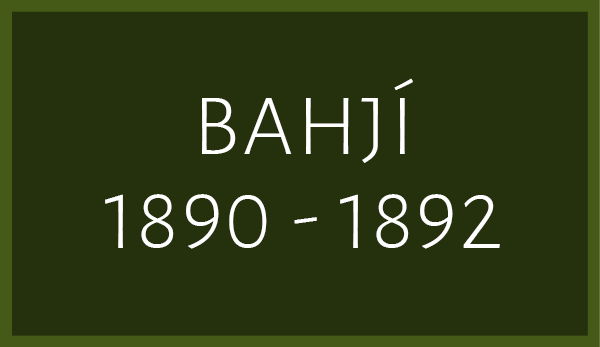
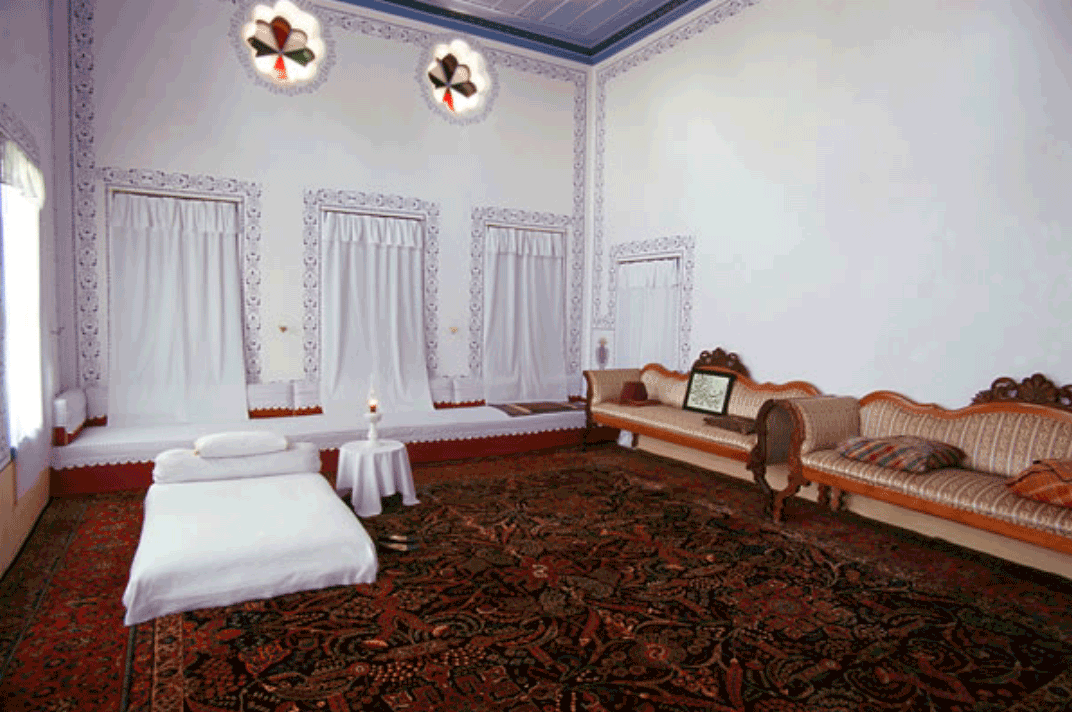
Room in the Mansion of Bahjí where Edward Granville Browne met Bahá'u'lláh. Photo credit: Denny Allen (2000) from The Life of Bahá'u'lláh: A Photographic Narrative.
The great orientalist Edward Granville Browne spends five days at Bahjí while visiting Palestine and is granted four successive interviews with Bahá'u'lláh. Browne leaves us with the only detailed account of a Westerner meeting with Bahá'u'lláh. His recounting of that meeting is part of the introduction to 'Abdu'l-Bahá's history of the Bábí religion, A Traveler's Narrative (see this panel under "1886").
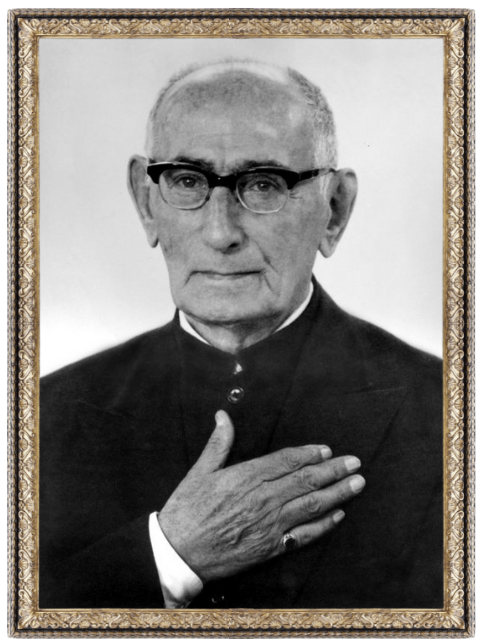
Ṭaráẓu'll‘áh Samandárí, the son of the Hand of the Cause Samandar, protagonist of the story, sixteen at the time. Source; Baha'i Media.
Ṭaráẓu'll‘áh Samandárí, the son of the Hand of the Cause Samandar, comes to the Holy Land on pilgrimage at sixteen years old, for seven months from December 1891 to one month after Bahá'u'lláh's passing. At some point during his pilgrimage, two weeks pass without Ṭaráẓu'll‘áh Samandárí entering the presence of Bahá'u'lláh. He leaves 'Akká, where he is staying in the Khán-i-Avámid, and walks the three kilometers to Bahjí. When he arrives, he asks a young girl, the daughter of a resident if Bahá'u'lláh is with a guest. When she says Bahá'u'lláh is alone, walking and pacing, he tells her:
Go and say to Bahá'u'lláh it has been two weeks since Ṭaráẓ has attained your holy presence and he seeks permission to visit.
The young girl delivers the message and return with the reply: Bahá'u'lláh says:
Bismilláh! Bifarma‘id [Enter!]
Overjoyed beyond words, the youth enters Bahá'u'lláh's presence. Bahá'u'lláh says:
Marḥabá! Ṭaráẓ Effendi.
Bahá'u'lláh then approaches Him and pats his head and his face, and enquires about his health. Then, Bahá'u'lláh asks:
Behold! You have made complaint that you have not encountered Our presence. Do you not meet the Master every day?
The youth replies that he saw 'Abdu'l-Bahá twice in one day. At the moment this meeting takes place, Bahá'u'lláh has most probably already revealed and sealed the Book of His Covenant, the Kitáb-i-‘Ahd, and so Bahá'u'lláh's next words resound with implications:
Then why do you speak of not having been here in My presence for several days, you who meet the Master every day and receive the honor of His company?
It is not lost on Ṭaráẓu'll‘áh Samandárí that Bahá'u'lláh is equating being in the presence of 'Abdu'l-Bahá with entering His own presence. Bahá'u'lláh then bids the young man farewell, but not before assuring him Bahjí is his home and he is welcome anytime, and giving him some sweets.
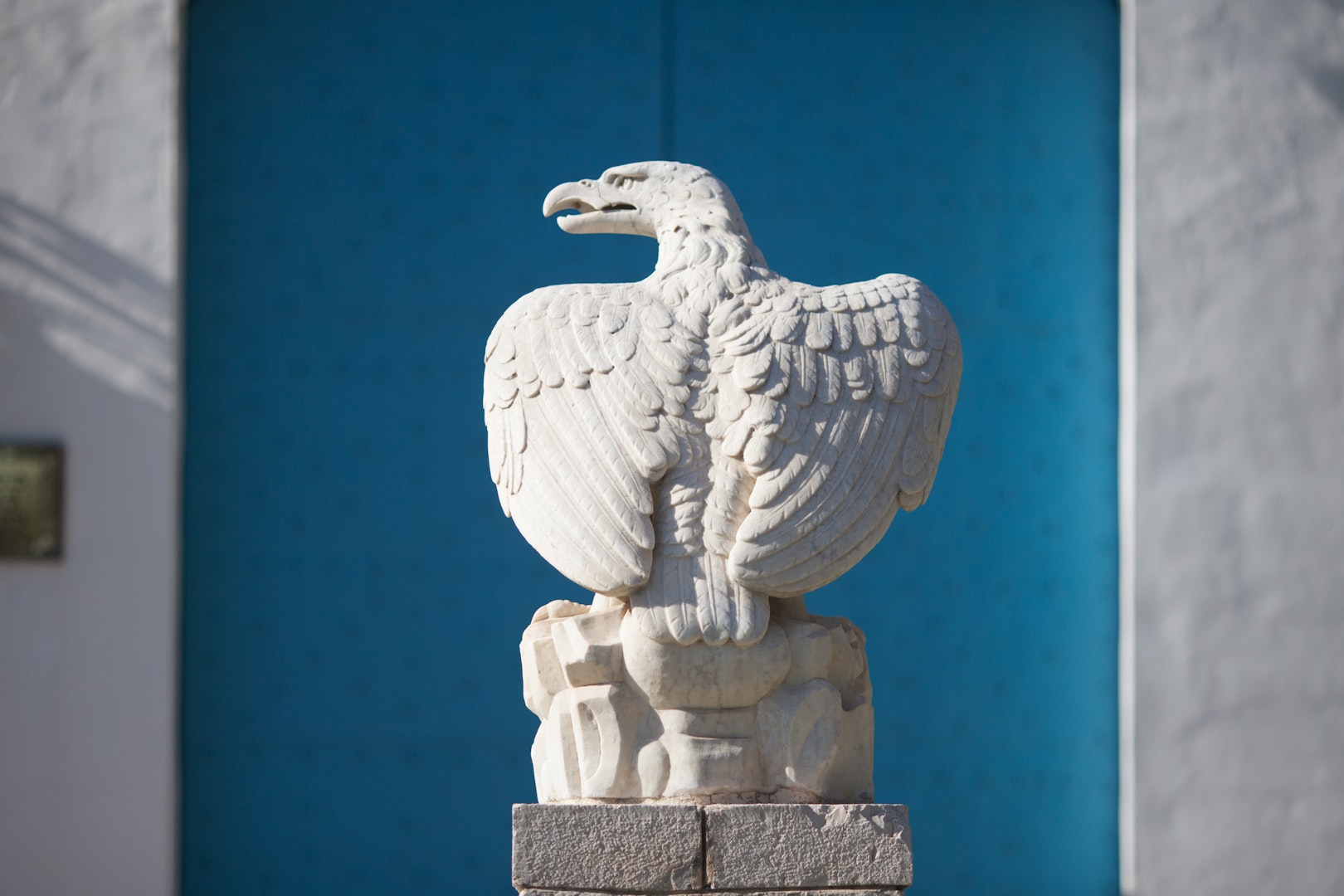
Eagle statue near the entrance to the Mansion of Bahjí. Source: Bahá'í Media Bank, © 2023 Bahá'í International Community.
While on pilgrimage, Ḥájí Mírzá Ḥaydar ‘Alí composes a treatise drawing on Islamic traditions which point to 'Abdu'l-Bahá. He presents both the compilation and the treatise to Bahá'u'lláh who applauds the effort and confirms his conclusions are indeed correct. Bahá'u'lláh further adds:
The force of the utterance of the Most Great Branch and His powers are not as yet fully revealed. In the future it will be seen how He, alone and unaided, shall raise the banner of the Most Great Name in the midmost heart of the world, with power and authority and Divine effulgence. It will be seen how He shall gather together the peoples of the earth under the tent of peace and concord.
Bahá'u'lláh, quoted in Balyuzi, H.M. ‘Abdu’l-Bahá: The Centre of the Covenant of Bahá’u’lláh, page 44
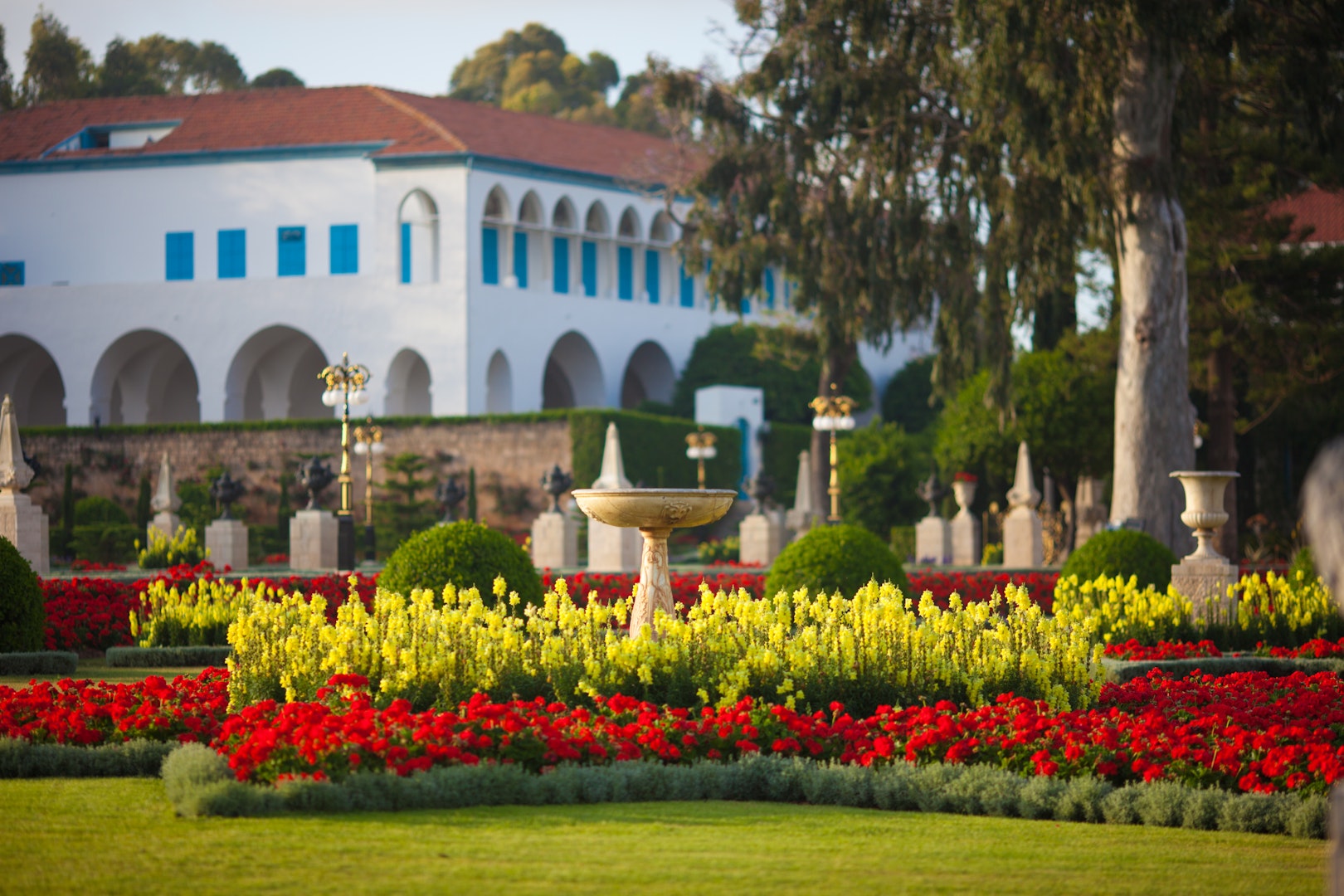
Gardens at Bahjí with Mansion of Bahjí in background. Source: Bahá'í Media Bank, © 2023 Bahá'í International Community.
Ḥájí Mírzá Ḥabíbu'lláh's pilgrimage lasts nine months, from the end of July 1891 to the end of April 1892. He is fourteen years old at this time, and he, and his entire family (his mother, sister and two brothers) have been summoned to the Holy Land by Bahá'u'lláh in early 1890. The entire party along with a servant and the mother of Shoghi Effendi's father travel from Shíraz. During this time, he remembers Bahá'u'lláh often warning the believers to remain steadfast and loyal to the Covenant. This incident, is very telling, in the way Bahá'u'lláh is teaching the believers utmost respect towards 'Abdu'l-Bahá, who is soon to be the Center of this Covenant. Many of the men, present on this day will later break the Covenant, which perhaps is an indication of the intensity of the lesson that Bahá'u'lláh teaches the men on this day, which sounds out as a warning.
One day, Mírzá Ḍíyá'u'lláh comes to ask Bahá'u'lláh:
‘Áqá [Master] supplicates for permission that we all may go with the Friends to the Garden of Junaynih.
Bahá'u'lláh's response is:
Who has said so?
Mírzá Ḍíyá'u'lláh responds:
‘Áqáy-i-Ghuṣn-i-Akbar ["The Greater Branch" or Muḥammád-'Alí, 'Abdu'l-Bahá's Covenant-breaker half-brother]
Bahá'u'lláh firmly responds:
There is only one ‘Áqá, all the others have names; that one ‘Áqá is "He round Whom all Names revolve," the Ghuṣn-i-A‘ẓam' [the Most Great Branch].
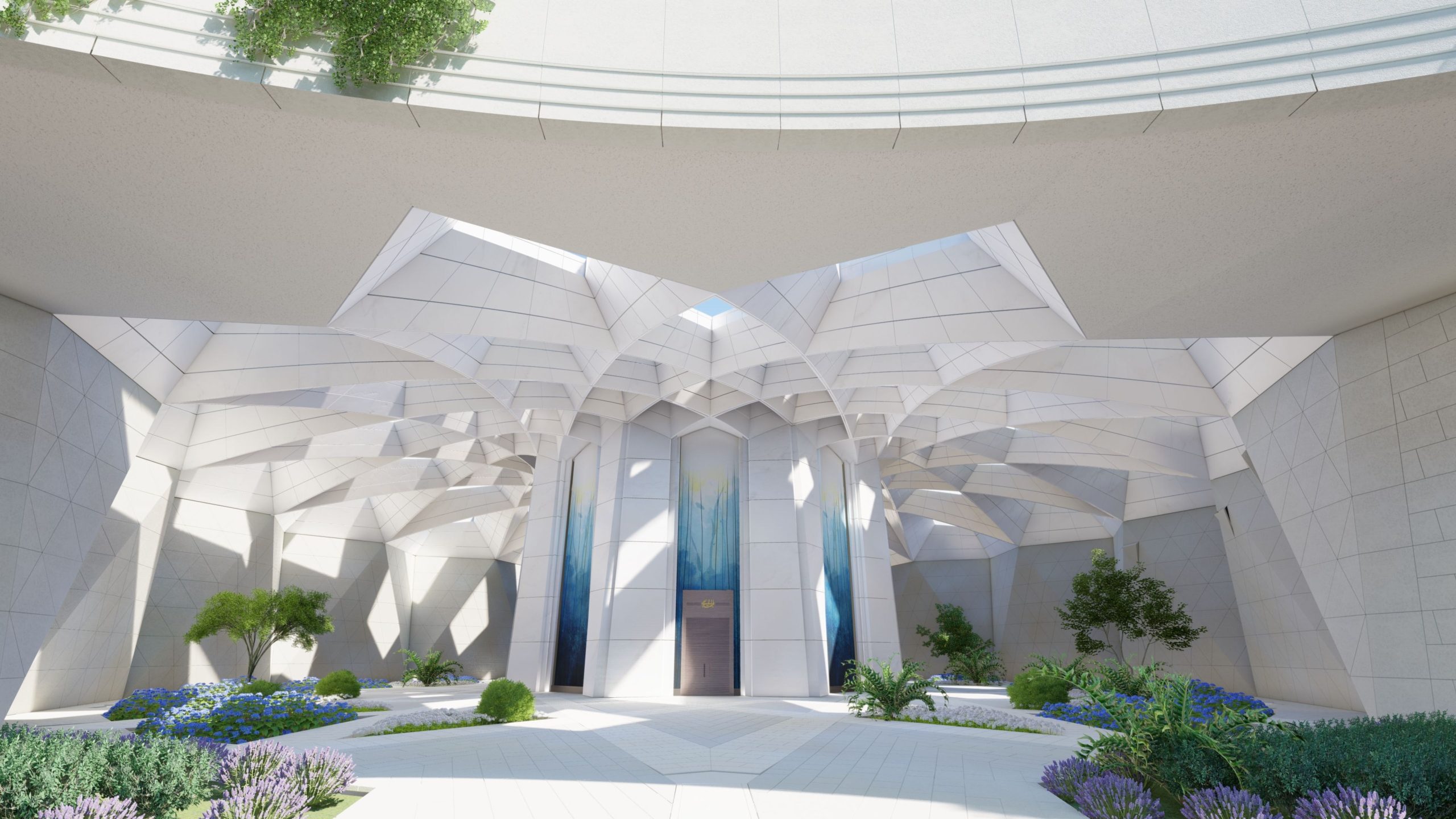
The healing presence of 'Abdu'l-Bahá, of which Bahá'u'lláh speaks in the collection of stories below, His station, His powers, all of these are embodied in the extraordinary tribute to His greatness and His power, His lifelong humility and His station as Center of the Covenant that is His Shrine. Graphic rendering of the Shrine of 'Abdu'l-Bahá. Source: Bahá'í Media Bank © Bahá'í International Community.
During Ḥájí Mírzá Ḥaydar ‘Alí's pilgrimage, he one day encounters Bahá’u’lláh deeply sad because of the behavior of believers living in His household. He sorrowfully tells Ḥájí Mírzá Ḥaydar ‘Alí:
Were it possible, We would recommend that the pilgrims who enter the city of ‘Akká go directly to the presence of the Most Great Branch ['Abdul-Bahá], listen to Him, then meet some of the steadfast believers, and immediately afterwards leave ‘Akká and return to their homes. This would be most conducive to their spiritual development. The reason is this: In the Master’s presence the friends are not subjected to tainted human thoughts and deeds. All they experience is heavenly sanctity. If the people would open their eyes, they would see clearly the difference between the heavenly perfections of the Master and the human frailties and faults of others. Then, even if they witness odious deeds committed in My household, they will only utter words of praise about the greatness and patience of the True One Who is glorious, mighty, and compassionate.
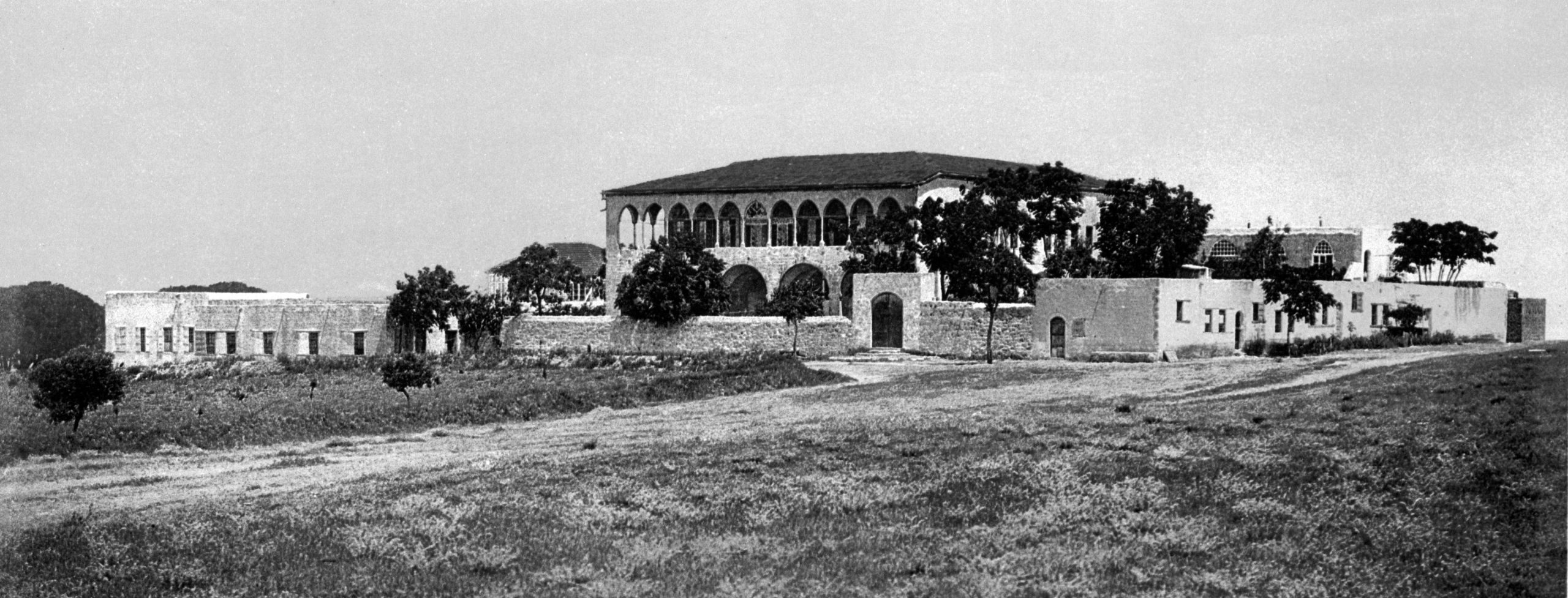
The Mansion of Bahjí and its surrounding buildings in 1952. Bahá'í Media Bank.
Around 1892, 'Abdu'l-Bahá rents the house now known as the Pilgrim House in Bahjí from its Christian owner, Iskandar Ḥawwá', the husband of 'Údí Khammárs daughter Haní.
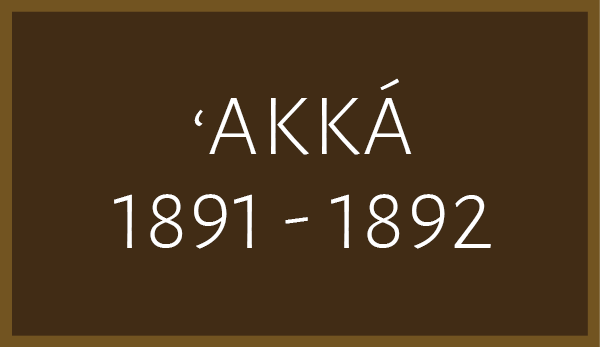
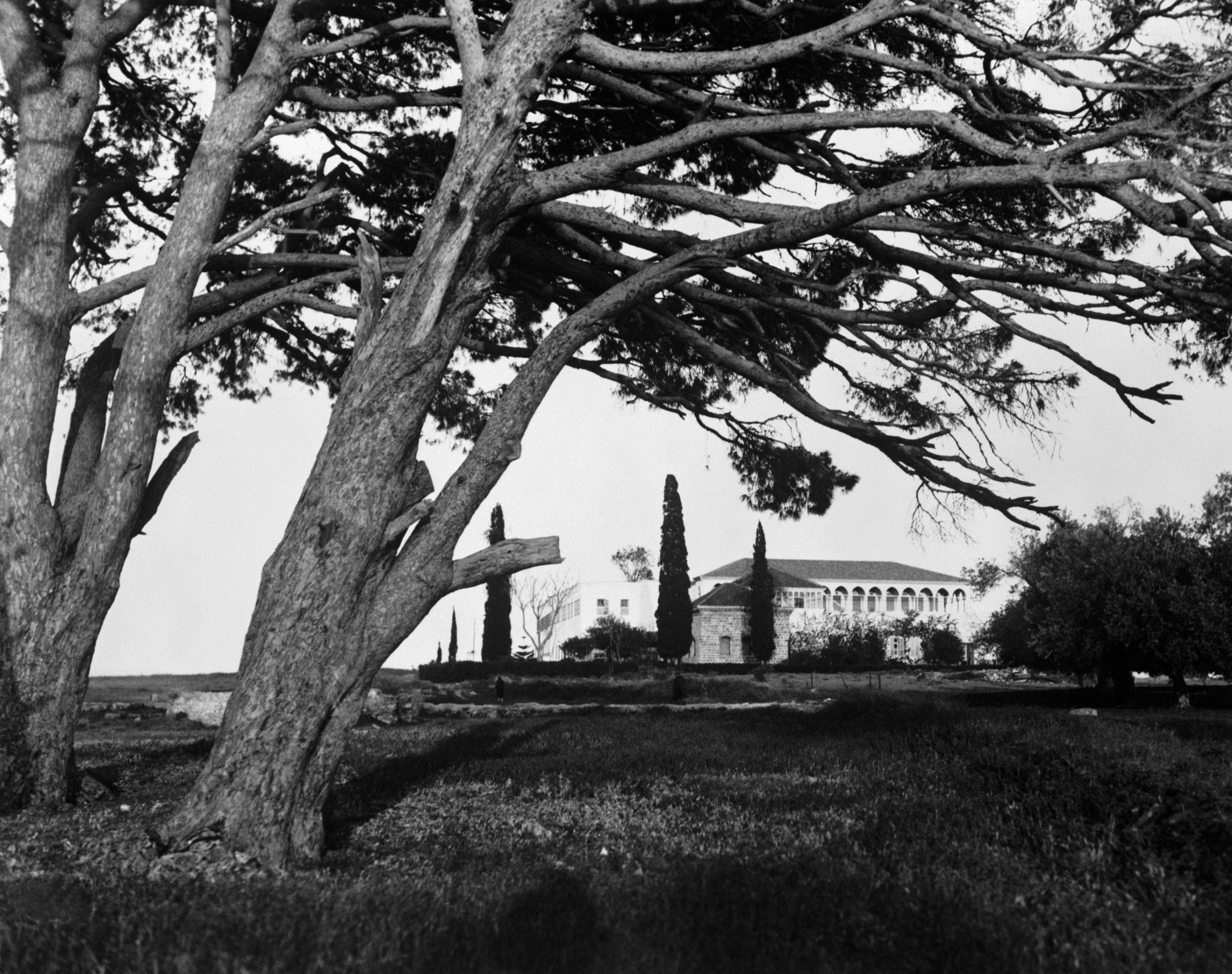
The approach to Bahjí, in the 1930s. Bahá'í Media Bank.
'Abdu'l-Bahá always walked the three kilometers separating 'Akká from Bahjí, when He visited Bahá'u'lláh. Bahá'u'lláh would suggest to 'Abdu'l-Bahá to ride a horse, and 'Abdu'l-Bahá would reply:
How can I come to my Lord riding? I must show that I am the humblest of all the people. When Christ went out he walked, and slept in the fields. Who am I, that visiting my Lord I should go as greater than Christ?
Phelps, Myron Henry. The Master in ‘Akka
The walk to Bahjí is long and the summer heat in the Holy Land is oppressive. When 'Abdu'l-Bahá is overcome with either heat or fatigue, Bahíyyih Khánum remembers it was the Master's habit to lie down on the ground, rest His head on a stone and sleep. There are countless, countless pilgrim notes that tell stories of 'Abdu'l-Bahá walking in the rain and prostrating His blessed forehead on the wet earth as He approaches Bahjí. Or if one day He did ride a mule, dismounting from the mule as soon as He could perceive Bahjí in the distance, and walking the rest of the way.
Perhaps the most touching story of all, in this devotion between Son and Father, Center of the Covenant and Manifestation of God is 'Abdu'l-Bahá, at the age of 68, pacing up and down the deck of His steamer from New York City to Liverpool, sometime in December of 1912. When at last 'Abdu'l-Bahá stops pacing, He tells His attendants:
I walked 4600 feet, the length of the road between 'Akká and the Shrine of Bahá'u'lláh. I want to practise walking, perchance I might be able to go on foot to the Shrine. In latter times, in the Holy Land, I was too weak to go on foot and was deprived of this bounty."
Balyuzi, H.M. ‘Abdu’l-Bahá: The Centre of the Covenant of Bahá’u’lláh, page 43
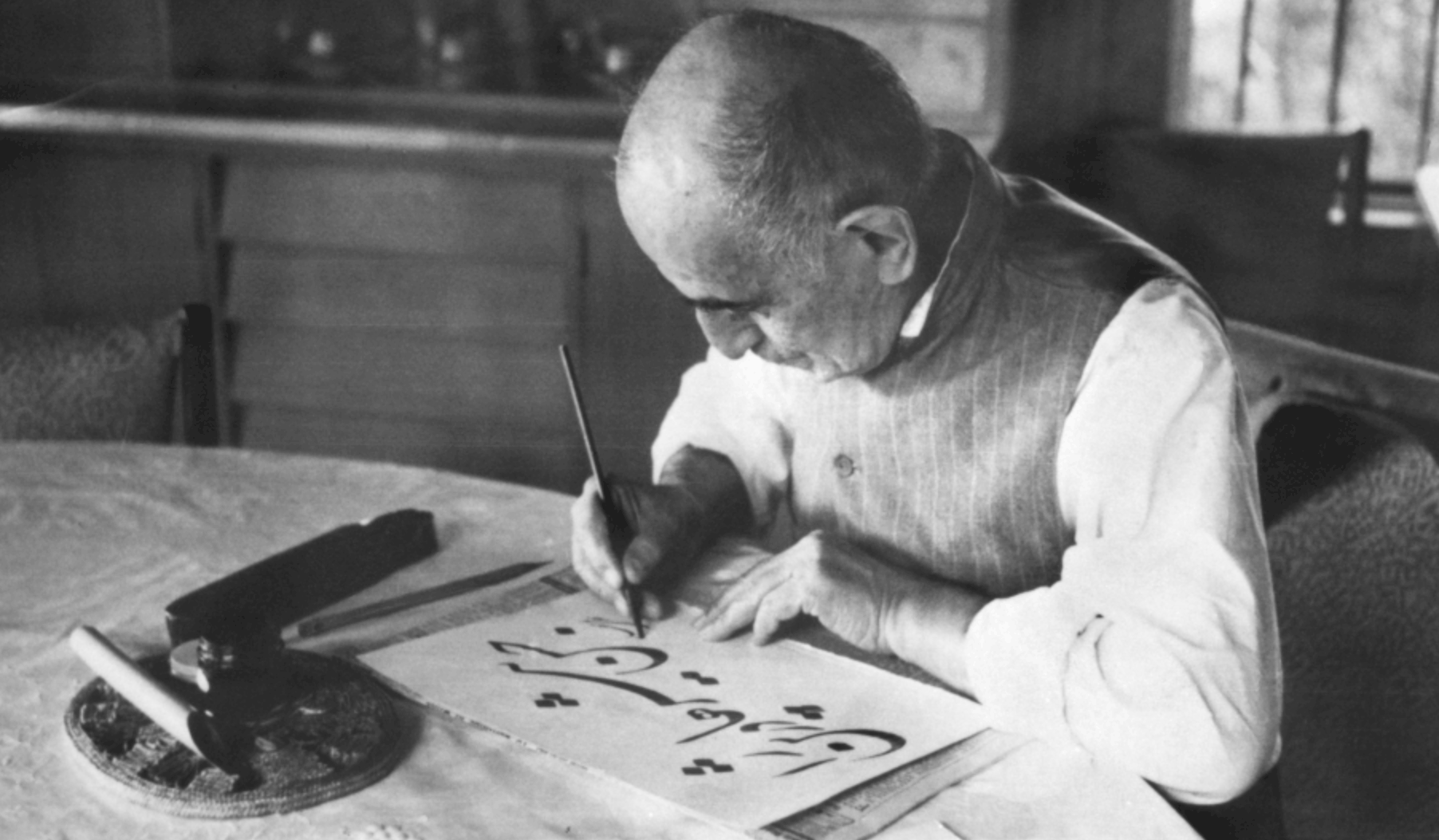
Ṭaráẓu'll‘áh Samandárí (protagonist of the story below), the son of the Hand of the Cause Samandar, and Hand of the Cause himself, seen here practising calligraphy in 1966. Source: Brilliant Star Magazine.
Ṭaráẓu'll‘áh Samandárí resides in the Khán-i-Avámid. One room is set aside for the pilgrims and serves as the Pilgrim House. His experience offers a small, intimate window, of the loving care 'Abdu'l-Bahá showered on all pilgrims. Ṭaráẓu'll‘áh Samandárí has the bounty of meeting 'Abdu'l-Bahá often during his long stay and the Master encourages him to practise calligraphy and copy from examples. On a hot day sometime during his stay, Ṭaráẓu'll‘áh Samandárí is in the Pilgrim House with other Bahá'ís, practising calligraphy hatless and without his cloak, when 'Abdu'l-Bahá enters the Pilgrim House. He quickly dons his cloak and hat and greets the Master. 'Abdu'l-Bahá examines his handwriting and showers Ṭaráẓu'll‘áh Samandárí with words of praise.
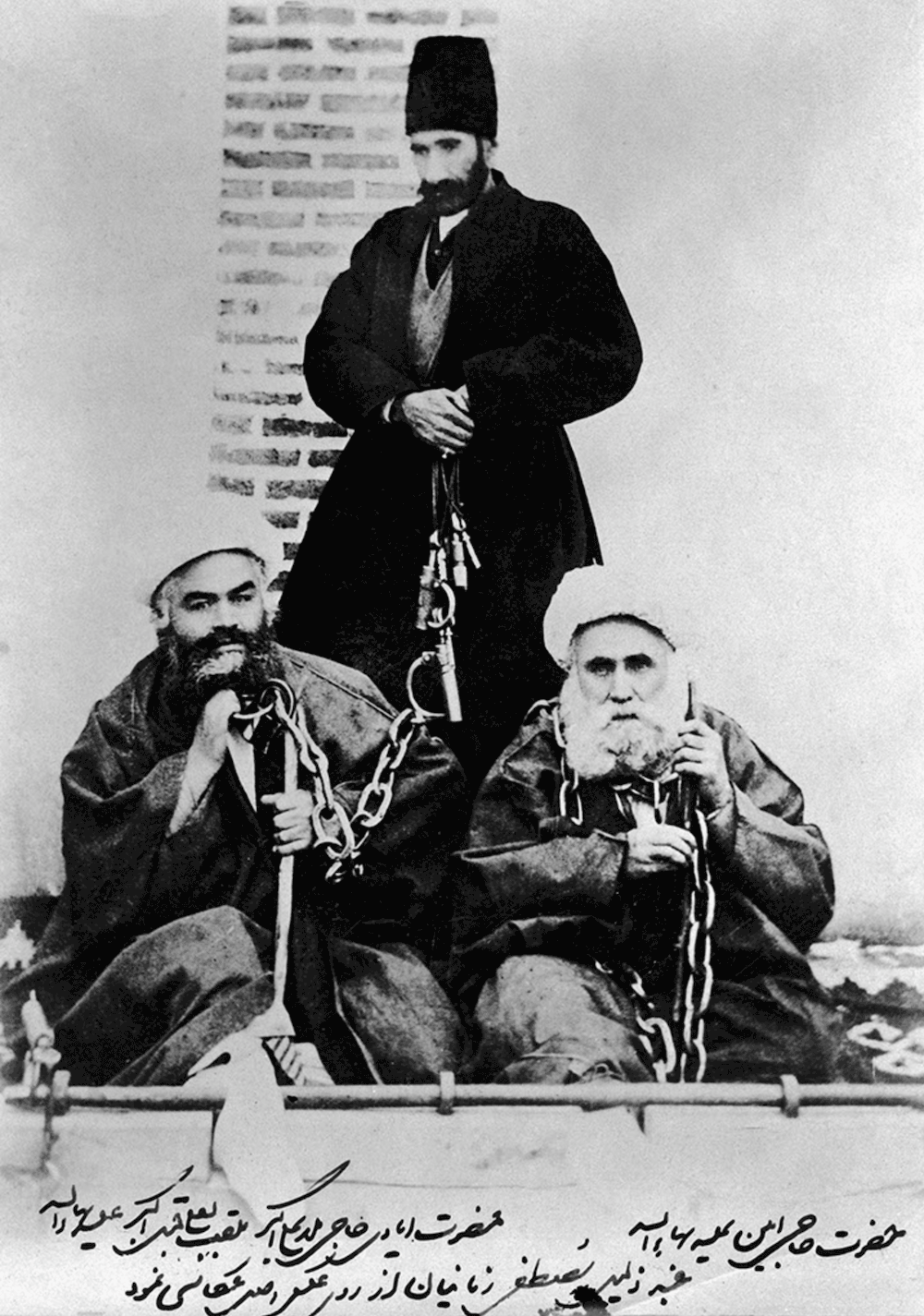
Hájí Ákhúnd, and Hájí Amín in the prison of Qazvín. Their feet are in stocks, their necks are in chains and the gaoler is in attendance. Source: Archives of Bahá'í Persecution in Iran.
In 1891, two outstanding believers, the Hand of the Cause of God Mullá 'Alí-Akbar, known as Hájí Ákhúnd, and Hájí Abu'l-Hasan, known as Hájí Amín, the first Trustee of Ḥuqúqu'lláh, and one of the earliest Bahá'ís, were both cast into the prison of Qazvín about two years.
The prime minister at the time is 'Alí-Asghar Khán, the Amínu's-Sultán, or Prime Minister. 'Alí-Asghar Khán is sympathetic to case of Hájí Ákhúnd and Hájí Amín. He knows the men are unjustly imprisoned, and makes kind remarks about them. This pleases Bahá'u'lláh and he asks 'Abdu'l-Bahá to send a message to the just Prime Minister. 'Abdu'l-Bahá recounts this story in Memorials of the Faithful:
Not long before His passing, Bahá'u'lláh had said: 'Should someone go to Persia, and manage to convey it, this message must be delivered to Amínu's-Sultán: "You took steps to help the prisoners; you freely rendered them a befitting service; this service will not be forgotten. Rest assured that it will bring you honor and call down a blessing upon all your affairs. O Amínu's-Sultán! Every house that is raised up will one day fall to ruin, except the house of God; that will grow more massive and be better guarded day by day. Then serve the Court of God with all your might, that you may discover the way to a home in Heaven, and found an edifice that will endure forever."'
Bahá'u'lláh, quoted by 'Abdu'l-Bahá in Memorials of the Faithful
The message is conveyed to 'Alí-Asghar Khán, but he receives it after Bahá'u'lláh has passed away.
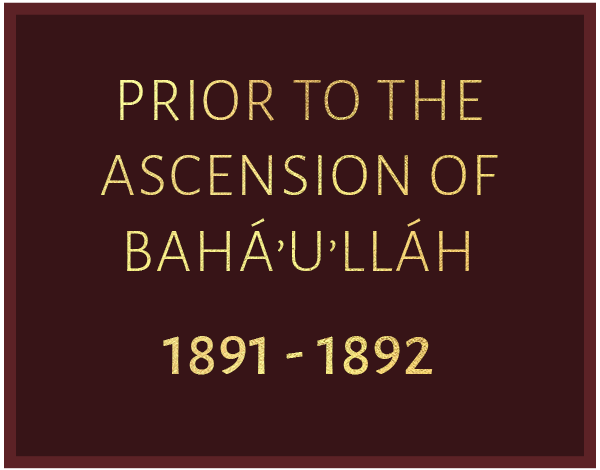
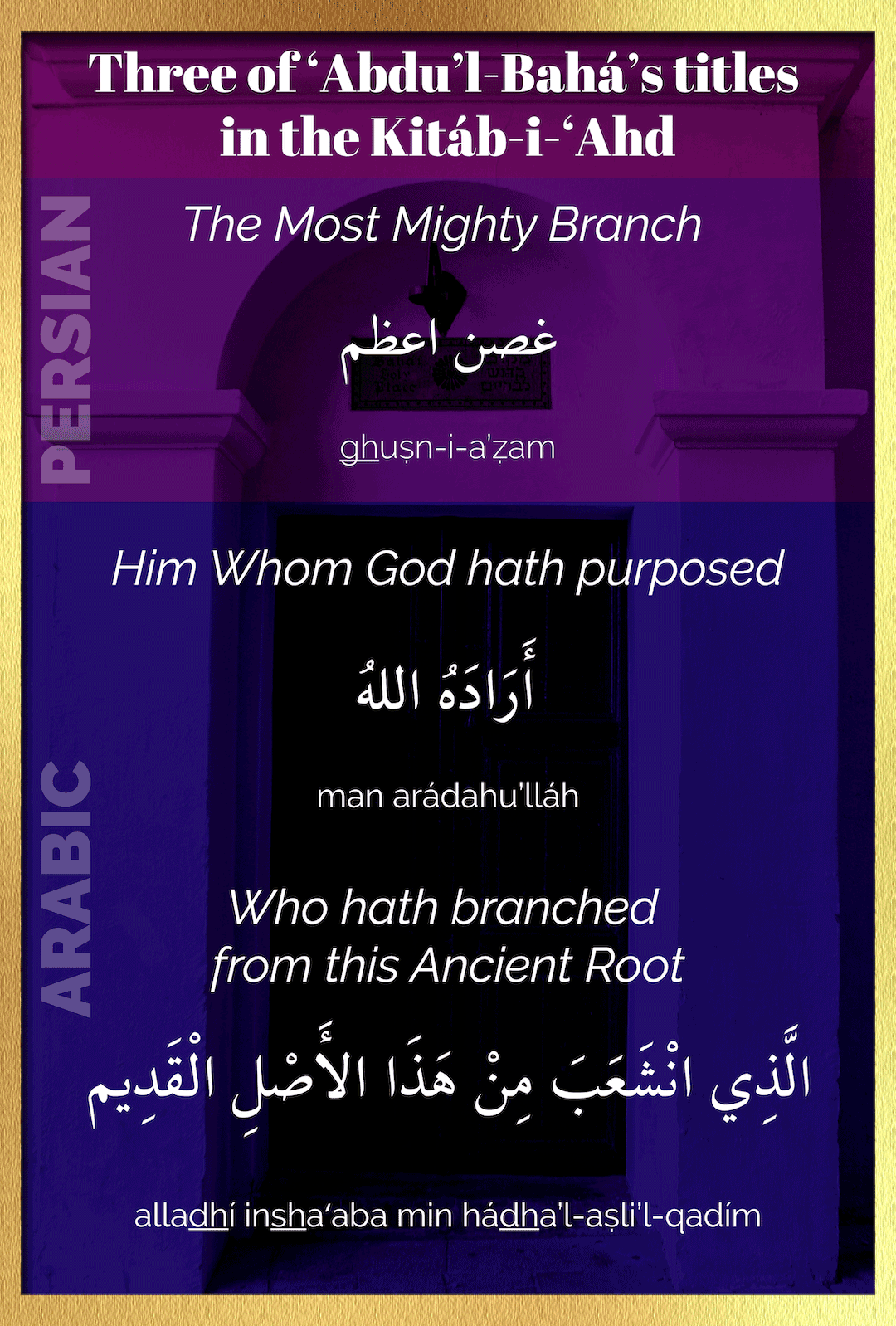
As an homage to 48 years of love between Bahá'u'lláh and 'Abdu'l-Bahá, the three terms which Bahá'u'lláh uses to the refer to 'Abdu'l-Bahá in the first two verses of English paragraph 9 of the Kitáb-i-‘Ahd. The first verse is in Persian, and the other two are in Arabic. Background of the door of the house of ‘Abbúd, where 'Abdu'l-Bahá kept the Kitáb-i-‘Ahd safe. Source: Bahá'í Media Bank © Bahá'í International Community. © Violetta Zein.
Approximately one year before He passes away, Bahá’u’lláh reveals a document, unparalleled in the annals of religious history. Written entirely in Bahá'u'lláh's own handwriting, the Kitáb-i-‘Ahd, or “Book of the Covenant,” is Bahá'u'lláh's Will and Testament. Never before has a Manifestation of God so explicitly and clearly designated a successor and provided for the steady growth, protection and safety of His Faith. The Kitáb-i-‘Ahd is not made public at this time but kept for safekeeping in a box.
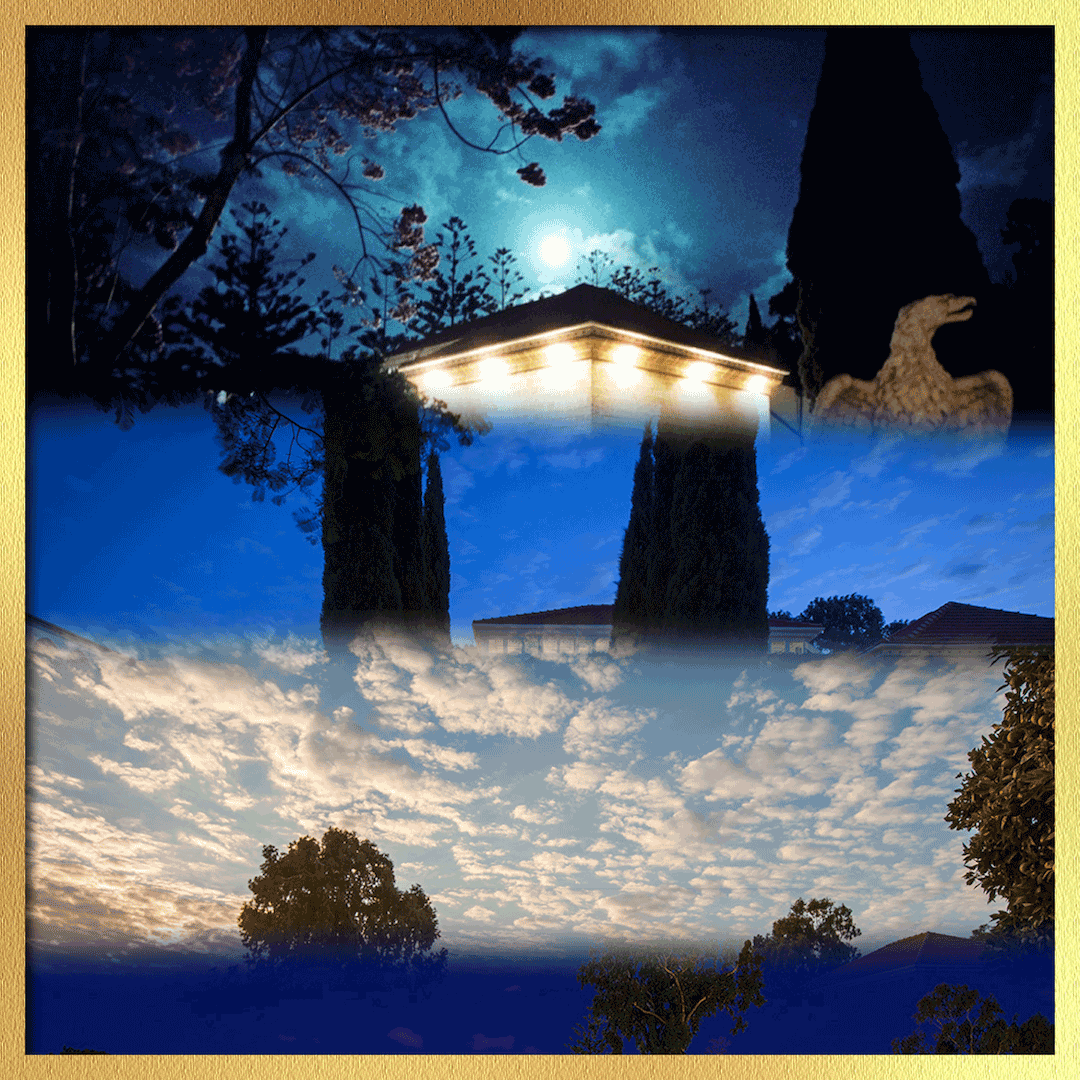
The open skies above Bahjí, where Bahá'u'lláh expressed His longing to flee away from this physical realm. Four photographs for the four glorious decades of Bahá'u'lláh’s ministry, from dawn to early morning, and dusk to dark night, with the eagle placed by Shoghi Effendi as an homage to the wings of flight. Sources for each photograph linked in the description. Bahá'í Media Bank photographs © Bahá'í International Community.
'Abdu'l-Bahá tells Nabíl that nine months before His ascension Bahá'u'lláh voices His desire to leave this world. In the course of the intervening nine months, it becomes clear, from the tone of His exhortations and remarks to the believers who enter His presence, that the end of His earthly life is nearing.
Sometime in the closing days of His Beloved Father’s life, 'Abdu'l-Bahá is gathering together Bahá'u'lláh’s papers, strewn on the divan of His writing chamber in Bahjí, when Bahá'u'lláh turns to Him and says:
"It is of no use to gather them, I must leave them and flee away."
Bahá'u'lláh seems, during these nine months, to arrange His affairs with a sense of urgency, but never speaks openly about the approaching end of His life.
References for Part III
The Mansion of Mazra’ih
Bahá’u’lláh moves to Mazra’ih: Ruhe, David. Door of Hope: The Bahá’í Faith in the Holy Land pages 83-90
‘Akká 1877 – 1879
The Holy Family stays behind: Maani, Baharieh Rouhani. Leaves of the Twin Divine Trees: an in-depth study of the lives of women closely related to the Báb and Baháʼuʼlláh pages 113-114.
‘Abdu’l-Bahá’s responsibilities in ‘Akká: Taherzadeh, Adib. The Revelation of Bahá’u’lláh, Volume 4 (Mazra‘ih & Bahjí, 1877–1892) pages 1-6.
‘Abdu’l-Bahá’s grueling schedule: Lady Blomfield. The Chosen Highway.
‘Abdu’l-Bahá protects Bahá’u’lláh by staying in ‘Akká: Taherzadeh, Adib. The Revelation of Bahá’u’lláh, Volume 4 (Mazra‘ih & Bahjí, 1877–1892) pages 1-6.
“He is the father of ‘Abbás Effendi:” Faizi, A.Q. Stories from The Delight of Hearts: The Memoirs of Ḥájí Mírzá Ḥaydar-‘Alí, page 71.
The Mansion of Bahjí
The Mansion of Bahjí: Ruhe, David. Door of Hope: The Bahá’í Faith in the Holy Land, pages 101-108.
‘Udi Khámmar’s prophetic inscription: Ruhe, David. Door of Hope: The Bahá’í Faith in the Holy Land, page 101-108.
Bahá’u’lláh speaks about ‘Abdu’l-Bahá as His “Mighty Shield”: aizi, A.Q. Stories from The Delight of Hearts: The Memoirs of Ḥájí Mírzá Ḥaydar-‘Alí, page 105-106.
Thunder and Lightning: Bahá’u’lláh’s white donkeys: Taherzadeh, Adib. The Revelation of Bahá’u’lláh, Volume 4 (Mazra‘ih & Bahjí, 1877–1892) pages 105.
Bahá’u’lláh’s glory and majesty: Shoghi Effendi. God Passes By.
‘Akká 1879 – 1880
Midḥat Páshá meets ‘Abdu’l-Bahá in ‘Akká: Alkan, Necati. The Historical Background of the Tablet of the Land of Bá.
Beirut
Alkan, Necati. The Historical Background of the Tablet of the Land of Bá and Shoghi Effendi, God Passes By.
Yarká
Ruhe, David. Door of Hope: The Bahá’í Faith in the Holy Land, pages 119 and 124.
‘Akká 1880-1891
The Muftí of Nazareth welcomes ‘Abdu’l-Bahá like a king: Balyuzi, H.M. ‘Abdu’l-Bahá: The Centre of the Covenant of Bahá’u’lláh, page 368.
‘Abdu’l-Bahá purchases lands around the Sea of Galilee: Ruhe, David. Door of Hope: The Bahá’í Faith in the Holy Land, page 53.
A Jealous Governor: Balyuzi, H.M. ‘Abdu’l-Bahá: The Centre of the Covenant of Bahá’u’lláh, pages 368-371.
The Passing of Navváb: Maani, Baharieh Rouhani. Leaves of the Twin Divine Trees: an in-depth study of the lives of women closely related to the Báb and Baháʼuʼlláh pages 114-119.
The Passing of Mírzá Músá: For the story about Mírzá Músá helping Nabíl with the Dawn Breakers, see Gail, Marzieh, Dawn Over Mount Hira, pages 94-95; For Bahá’u’lláh using Mírzá Músá as an example to the official in Baghdád, see Shoghi Effendi, God Passes By. For the story about Bahá’u’lláh’s nine-day stay in Mírzá Músá’s home in ‘Akká, see Taherzadeh, Adib. The Revelation of Bahá’u’lláh, Volume 4 (Mazra’ih and Bahjí, 1877-1892) pages 242-243. For Mírzá Músá and herbal medicine, see Taherzadeh, Adib. The Revelation of Bahá’u’lláh, Volume 3 (‘Akká, the Early Years, 1868–1877), page 361.
‘Abdu’l-Bahá’s Children and Their Grandfather: Lady Blomfield. The Chosen Highway.
Beloved 4-year-old Ḥusayn Effendi passes away: Maani, Baharieh Rouhani. Leaves of the Twin Divine Trees: an in-depth study of the lives of women closely related to the Báb and Baháʼuʼlláh pages 321-324 and Ruhe, David. Door of Hope: The Bahá’í Faith in the Holy Land, page 51.
A Traveler’s Narrative: https://www.bahai.org/library/authoritative-texts/abdul-baha/travelers-narrative/
A respectful Governor: Balyuzi, H.M. ‘Abdu’l-Bahá: The Centre of the Covenant of Bahá’u’lláh, page 371.
The Garden of Riḍván
The Riḍván Garden: Ruhe, David. Door of Hope: The Bahá’í Faith in the Holy Land, page
The Riḍván Garden is purchased in Bahá’u’lláh’s name: Ruhe, David. Door of Hope: The Bahá’í Faith in the Holy Land, page 91.
The joy of ‘Abdu’l-Bahá at seeing His Father resting under the mulberry tree: Lady Blomfield. The Chosen Highway.
‘Abdu’l-Bahá’s pomegranate cure: Taherzadeh, Adib. The Revelation of Bahá’u’lláh, Volume 3 (‘Akká, the Early Years, 1868–1877), page 362
The Garden of Junaynih
The Garden at Junaynih: Ruhe, David. Door of Hope: The Bahá’í Faith in the Holy Land, page 120.
“The Garden Was Not Pleasant Enough This Morning”: Balyuzi, H.M. ‘Abdu’l-Bahá: The Centre of the Covenant of Bahá’u’lláh, pages 415-416.
Haifa
Day, Michael V. Journey to a Mountain: The story of the Shrine of the Báb. Vol. I: 1850–1921, Kindle Edition.
Bahjí 1891 – 1892
Edward Granville Browne visits Bahá’u’lláh at Bahjí: Esslemont, J. E. Bahá’u’lláh and the New Era, Buck, Christopher, Symbol and Secret: Qur’an Commentary in Bahá’u’lláh’s Kitáb-i Íqán, pp. XLI.
Do you not meet the Master every day?: Furútan, ‘Alí-Akbar. Stories of Bahá’u’lláh pages 105-106 and Balyuzi, H.M. ‘Abdu’l-Bahá: The Centre of the Covenant of Bahá’u’lláh, page 44.
Bahá’u’lláh speaks about the station and powers of ‘Abdu’l-Bahá: Balyuzi, H.M. ‘Abdu’l-Bahá: The Centre of the Covenant of Bahá’u’lláh, page 44.
“There is only one ‘Áqá, all the others have names”: Rabbani, Ahang. Memories of My Life: Translation of Mírzá Habíbu’lláh Afnán’s Khátirát-i-Hayát pages 314-315.
Bahá’u’lláh Speaks to the Healing Presence of ‘Abdu’l-Bahá: Furútan, ‘Alí-Akbar. Stories of Bahá’u’lláh pages 104-105.
‘Abdu’l-Bahá rents the Pilgrim House in Bahjí: Rue, David S. Door of Hope: The Bahá’í Faith in the Holy Land, page 226.
‘Akká 1891-1892
The reverence of ‘Abdu’l-Bahá visiting Bahá’u’lláh: Phelps, Myron Henry. The Master in ‘Akka page 109 and Balyuzi, H.M. ‘Abdu’l-Bahá: The Centre of the Covenant of Bahá’u’lláh, page 43
‘Abdu’l-Bahá teaches calligraphy to a young pilgrim: Furútan, ‘Alí-Akbar. Stories of Bahá’u’lláh pages 104-105.
‘Abdu’l-Bahá sends a message to the Prime Minister of Persia at the request of Bahá’u’lláh: Taherzadeh, Adib. The Revelation of Bahá’u’lláh, Volume 4 (Mazra’ih and Bahjí, 1877-1892) page 185.
The Ascension of Bahá’u’lláh
Bahá’u’lláh Predicts His Passing: Taherzadeh, Adib. The Revelation of Bahá’u’lláh Volume IV: Mazra’ih and Bahjí (1877 – 1892), pages 413-424.
![]()

